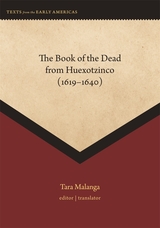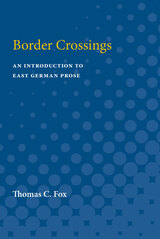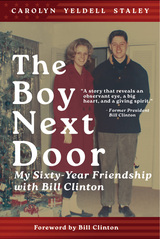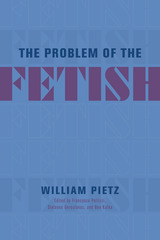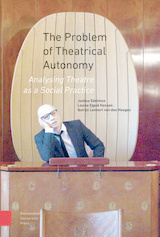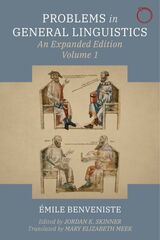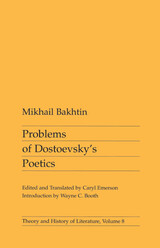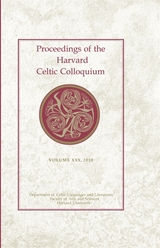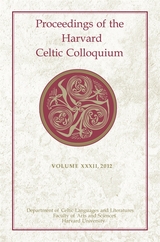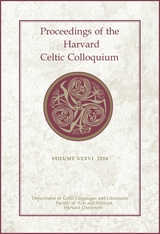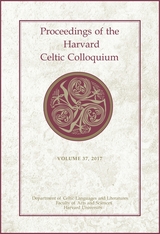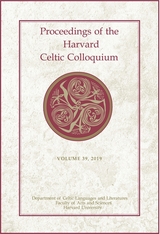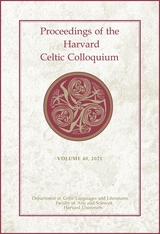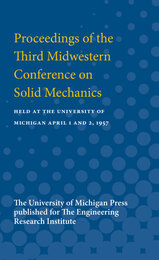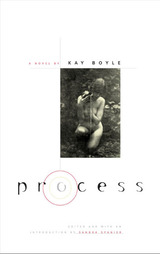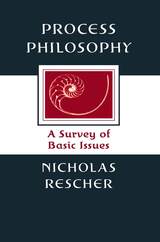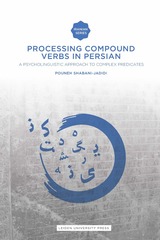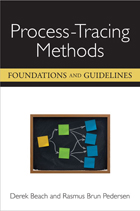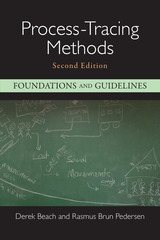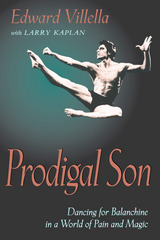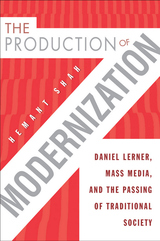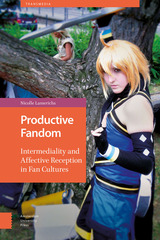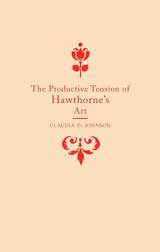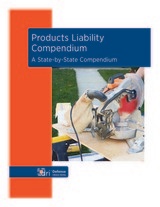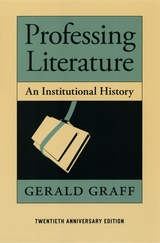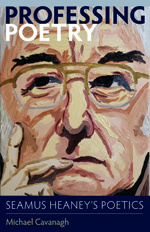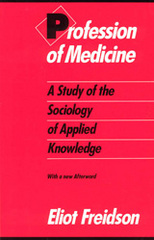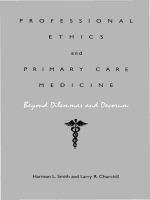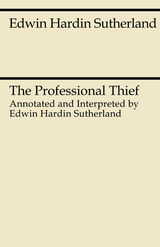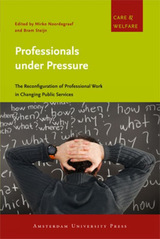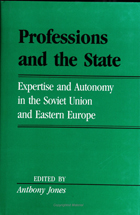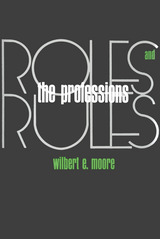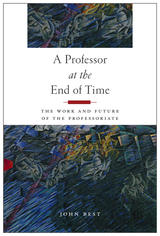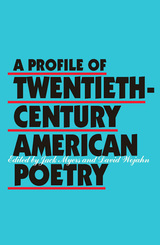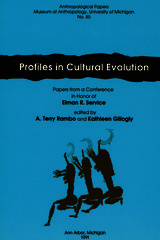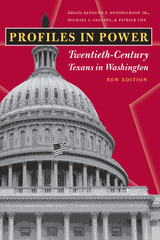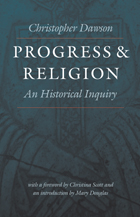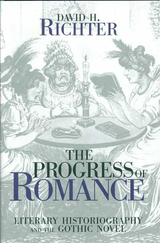 The Problem of Race in the Twenty-first Century
Thomas C. Holt
Harvard University Press, 2002 "The problem of the twentieth century is the problem of the color-line," W. E. B. Du Bois wrote in 1903, and his words have proven sadly prophetic. As we enter the twenty-first century, the problem remains--and yet it, and the line that defines it, have shifted in subtle but significant ways. This brief book speaks powerfully to the question of how the circumstances of race and racism have changed in our time--and how these changes will affect our future.
Foremost among the book's concerns are the contradictions and incoherence of a system that idealizes black celebrities in politics, popular culture, and sports even as it diminishes the average African-American citizen. The world of the assembly line, boxer Jack Johnson's career, and The Birth of a Nation come under Holt's scrutiny as he relates the malign progress of race and racism to the loss of industrial jobs and the rise of our modern consumer society. Understanding race as ideology, he describes the processes of consumerism and commodification that have transformed, but not necessarily improved, the place of black citizens in our society.
As disturbing as it is enlightening, this timely work reveals the radical nature of change as it relates to race and its cultural phenomena. It offers conceptual tools and a new way to think and talk about racism as social reality.
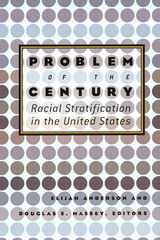 Problem of the Century: Racial Stratification in the United States
Elijah Anderson
Russell Sage Foundation, 2001 In 1899 the great African American scholar, W.E.B. DuBois, published The Philadelphia Negro, the first systematic case study of an African American community and one of the foundations of American sociology. DuBois prophesied that the color line would be the problem of the twentieth century. One hundred years later, Problem of the Century reflects upon his prophecy, exploring the ways in which the color line is still visible in the labor market, the housing market, education, family structure, and many other aspects of life at the turn of a new century. The book opens with a theoretical discussion of the way racial identity is constructed and institutionalized. When the government classifies races and confers group rights upon them, is it subtly reenforcing damaging racial divisions, or redressing the group privileges that whites monopolized for so long? The book also delineates the social dynamics that underpin racial inequality. The contributors explore the causes and consequences of high rates of mortality and low rates of marriage in black communities, as well as the way race affects a person's chances of economic success. African Americans may soon lose their historical position as America's majority minority, and the book also examines how race plays out in the sometimes fractious relations between blacks and immigrants. The final part of the book shows how the color line manifests itself at work and in schools. Contributors find racial issues at play on both ends of the occupational ladder—among absentee fathers paying child support from their meager earnings and among black executives prospering in the corporate world. In the schools, the book explores how race defines a student's peer group and how peer pressure affects a student's grades. Problem of the Century draws upon the distinguished faculty of sociologists at the University of Pennsylvania, where DuBois conducted his research for The Philadelphia Negro. The contributors combine a scrupulous commitment to empirical inquiry with an eclectic openness to different methods and approaches. Problem of the Century blends ethnographies and surveys, statistics and content analyses, census data and historical records, to provide a far-reaching examination of racial inequality in all its contemporary manifestations.
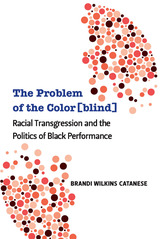 The Problem of the Color[blind]: Racial Transgression and the Politics of Black Performance
Brandi Wilkins Catanese
University of Michigan Press, 2011 "Catanese's beautifully written and cogently argued book addresses one of the most persistent sociopolitical questions in contemporary culture. She suggests that it is performance and the difference it makes that complicates the terms by which we can even understand 'multicultural' and 'colorblind' concepts. A tremendously illuminating study that promises to break new ground in the fields of theatre and performance studies, African American studies, feminist theory, cultural studies, and film and television studies."
---Daphne Brooks, Princeton University "Adds immeasurably to the ways in which we can understand the contradictory aspects of racial discourse and performance as they have emerged during the last two decades. An ambitious, smart, and fascinating book."
---Jennifer DeVere Brody, Duke University Are we a multicultural nation, or a colorblind one? The Problem of the Color[blind] examines this vexed question in American culture by focusing on black performance in theater, film, and television. The practice of colorblind casting---choosing actors without regard to race---assumes a performing body that is somehow race neutral. But where, exactly, is race neutrality located---in the eyes of the spectator, in the body of the performer, in the medium of the performance? In analyzing and theorizing such questions, Brandi Wilkins Catanese explores a range of engaging and provocative subjects, including the infamous debate between playwright August Wilson and drama critic Robert Brustein, the film career of Denzel Washington, Suzan-Lori Parks's play Venus, the phenomenon of postblackness (as represented in the Studio Museum in Harlem's "Freestyle" exhibition), the performer Ice Cube's transformation from icon of gangsta rap to family movie star, and the controversial reality television series Black. White. Concluding that ideologies of transcendence are ahistorical and therefore unenforceable, Catanese advances the concept of racial transgression---a process of acknowledging rather than ignoring the racialized histories of performance---as her chapters move between readings of dramatic texts, films, popular culture, and debates in critical race theory and the culture wars.
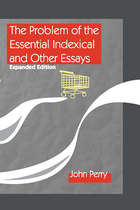 The Problem of the Essential Indexical and Other Essays, Expanded Edition
John Perry
CSLI, 2000 No word in English is shorter than the word ``I.'' And yet no word is more important in philosophy. When Descartes said ``I think therefore I am'' he produced something that was both about himself and a universal formula. The word ``I'' is called an ``indexical'' because its meaning always depends on who says it. Other examples of indexicals are ``you,'' ``here,'' ``this'' and ``now.''
John Perry discusses how these kinds of words work, and why they express important philosophical thoughts. He shows that indexicals pose a challenge to traditional assumptions about language and thought. Over the years a number of these papers, now included in this book, have sparked lively debates and have been influential in philosophy, linguistics and other areas of cognitive science.
With seven new papers, including the previously unpublished ``What Are Indexicals?,'' the present volume expands on an earlier version of this book published in the early nineties. Also included are the well-known papers ``Frege on Demonstratives,'' ``Cognitive Significance and New Theories of Reference,'' ``Evading the Slingshot,'' ``The Prince and the Phone booth'' (coauthored with Mark Crimmins), ``Fodor on Psychological Explanations'' (coauthored with David Israel), and related papers on situation semantics, direct reference, and the structure of belief. This book also includes afterwords written by the author that discuss responses to his work by Gareth Evans, Robert Stalnaker, Barbara Partee, Howard Wettstein and others.
The Problem of the Fetish
William Pietz
University of Chicago Press, 2022 A groundbreaking account of the origins and history of the idea of fetishism.
In recent decades, William Pietz’s innovative history of the idea of the fetish has become a cult classic. Gathered here, for the first time, is his complete series of essays on fetishism, supplemented by three texts on Marx, blood sacrifice, and the money value of human life. Tracing the idea of the fetish from its origins in the Portuguese colonization of West Africa to its place in Enlightenment thought and beyond, Pietz reveals the violent emergence of a foundational concept for modern theories of value, belief, desire, and difference. This book cements Pietz’s legacy of engaging questions about material culture, object agency, merchant capitalism, and spiritual power, and introduces a powerful theorist to a new generation of thinkers.
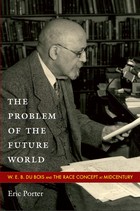 The Problem of the Future World: W. E. B. Du Bois and the Race Concept at Midcentury
Eric Porter
Duke University Press, 2010 The Problem of the Future World is a compelling reassessment of the later writings of the iconic African American activist and intellectual W. E. B. Du Bois. As Eric Porter points out, despite the outpouring of scholarship devoted to Du Bois, the broad range of writing he produced during the 1940s and early 1950s has not been thoroughly examined in its historical context, nor has sufficient attention been paid to the theoretical interventions he made during those years. Porter locates Du Bois’s later work in relation to what he calls “the first postracial moment.” He suggests that Du Bois’s midcentury writings are so distinctive and so relevant for contemporary scholarship because they were attuned to the shape-shifting character of modern racism, and in particular to the ways that discredited racial taxonomies remained embedded and in force in existing political-economic arrangements at both the local and global levels. Porter moves the conversation about Du Bois and race forward by building on existing work about the theorist, systematically examining his later writings, and looking at them from new perspectives, partly by drawing on recent scholarship on race, neoliberalism, and empire. The Problem of the Future World shows how Du Bois’s later writings help to address race and racism as protean, global phenomena in the present.
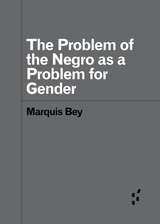 The Problem of the Negro as a Problem for Gender
Marquis Bey
University of Minnesota Press, 2020 A complex articulation of the ways blackness and nonnormative gender intersect—and a deeper understanding of how subjectivities are formed
A deep meditation on and expansion of the figure of the Negro and insurrectionary effects of the “X” as theorized by Nahum Chandler, The Problem of the Negro as a Problem for Gender thinks through the problematizing effects of blackness as, too, a problematizing of gender. Through the paraontological, the between, and the figure of the “X” (with its explicit contemporary link to nonbinary and trans genders) Marquis Bey presents a meditation on black feminism and gender nonnormativity. Chandler’s text serves as both an argumentative tool for rendering the “radical alternative” in and as blackness as well as demonstrating the necessarily trans/gendered valences of that radical alternative.
Forerunners is a thought-in-process series of breakthrough digital works. Written between fresh ideas and finished books, Forerunners draws on scholarly work initiated in notable blogs, social media, conference plenaries, journal articles, and the synergy of academic exchange. This is gray literature publishing: where intense thinking, change, and speculation take place in scholarship.
The Problem of Theatrical Autonomy: Analysing Theatre as a Social Practice
Joshua Edelman
Amsterdam University Press, 2017 As any devoted theatregoer will attest, watching a performance is a unique experience, as the social setting, rules, and standards of theatre often combine to create a feeling of liberation from the everyday world. This book explores the phenomenon of theatre as simultaneously distinct from and yet connected to society as a whole. Combining theoretical reflections with materials from European case studies, the authors offer intriguing new methods for the sociological study of theatre while contributing equally to theatre and performance studies.
 The Problem of Unbelief in the Sixteenth Century: The Religion of Rabelais
Lucien Febvre
Harvard University Press, 1982 Lucien Febvre’s magisterial study of sixteenth century religious and intellectual history, published in 1942, is at long last available in English, in a translation that does it full justice. The book is a modern classic. Febvre, founder with Marc Bloch of the journal Annales, was one of France’s leading historians, a scholar whose field of expertise was the sixteenth century. This book, written late in his career, is regarded as his masterpiece. Despite the subtitle, it is not primarily a study of Rabelais; it is a study of the mental life, the mentalité, of a whole age.
Febvre worked on the book for ten years. His purpose at first was polemical: he set out to demolish the notion that Rabelais was a covert atheist, a freethinker ahead of his time. To expose the anachronism of that view, he proceeded to a close examination of the ideas, information, beliefs, and values of Rabelais and his contemporaries. He combed archives and local records, compendia of popular lore, the work of writers from Luther and Erasmus to Ronsard, the verses of obscure neo-Latin poets. Everything was grist for his mill: books about comets, medical texts, philological treatises, even music and architecture. The result is a work of extraordinary richness of texture, enlivened by a wealth of concrete details—a compelling intellectual portrait of the period by a historian of rare insight, great intelligence, and vast learning.
Febvre wrote with Gallic flair. His style is informal, often witty, at times combative, and colorful almost to a fault. His idiosyncrasies of syntax and vocabulary have defeated many who have tried to read, let alone translate, the French text. Beatrice Gottlieb has succeeded in rendering his prose accurately and readably, conveying a sense of Febvre’s strong, often argumentative personality as well as his brilliantly intuitive feeling for Renaissance France.
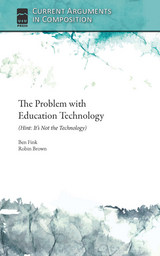 The Problem with Education Technology (Hint: It's Not the Technology)
Ben Fink
Utah State University Press, 2016 Education is in crisis—at least, so we hear. And at the center of this crisis is technology. New technologies like computer-based classroom instruction, online K–12 schools, MOOCs (massive open online courses), and automated essay scoring may be our last great hope—or the greatest threat we have ever faced. In The Problem with Education Technology, Ben Fink and Robin Brown look behind the hype to explain the problems—and potential—of these technologies. Focusing on the case of automated essay scoring, they explain the technology, how it works, and what it does and doesn’t do. They explain its origins, its evolution (both in the classroom and in our culture), and the controversy that surrounds it. Most significantly, they expose the real problem—the complicity of teachers and curriculum-builders in creating an education system so mechanical that machines can in fact often replace humans—and how teachers, students, and other citizens can work together to solve it. Offering a new perspective on the change that educators can hope, organize, and lobby for, The Problem with Education Technology challenges teachers and activists on “our side,” even as it provides new evidence to counter the profit-making, labor-saving logics that drive the current push for technology in the classroom.
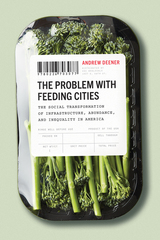 The Problem with Feeding Cities: The Social Transformation of Infrastructure, Abundance, and Inequality in America
Andrew Deener
University of Chicago Press, 2020 For most people, grocery shopping is a mundane activity. Few stop to think about the massive, global infrastructure that makes it possible to buy Chilean grapes in a Philadelphia supermarket in the middle of winter. Yet every piece of food represents an interlocking system of agriculture, manufacturing, shipping, logistics, retailing, and nonprofits that controls what we eat—or don’t.
The Problem with Feeding Cities is a sociological and historical examination of how this remarkable network of abundance and convenience came into being over the last century. It looks at how the US food system transformed from feeding communities to feeding the entire nation, and it reveals how a process that was once about fulfilling basic needs became focused on satisfying profit margins. It is also a story of how this system fails to feed people, especially in the creation of food deserts. Andrew Deener shows that problems with food access are the result of infrastructural failings stemming from how markets and cities were developed, how distribution systems were built, and how organizations coordinate the quality and movement of food. He profiles hundreds of people connected through the food chain, from farmers, wholesalers, and supermarket executives, to global shippers, logistics experts, and cold-storage operators, to food bank employees and public health advocates. It is a book that will change the way we see our grocery store trips and will encourage us all to rethink the way we eat in this country.
 The Problem with Personalization: How Advertisers Learned to Make and Break Us from Ancient Times to the AI Age
Joseph Turow
University of Chicago Press A respected voice on technology shows how seemingly simple ads help dismantle democracy and public discourse.
Whether you’re intentionally shopping or casually browsing social media, something is following you: ads. Their creators seem to know your income bracket, your tastes in clothing, food, location, politics, age, medical conditions, and romantic partners. As predictive AI tells firms what your hot buttons are and generative AI produces messages tailored to those buttons, your online world becomes an increasingly comfortable—and isolated—place. The fervid competition around personalization in digital marketing, now ubiquitous, has given rise to an ecosystem of advertisers, media outlets, tech companies, and retailers who monetize your data, while threatening the health of our media, our discourse, and our sense of community. In this urgent book, award-winning author Joseph Turow shows how we got here, and how to change direction.
The Problem with Personalization shatters common beliefs about advertising history by showing that individualizing ads is not new. Today’s high-velocity AI versions draw on past aspirations and assumptions about personalization while weaponizing it in unprecedented ways that drive social fragmentation and the disappearance of shared social reality. Informed by interviews with marketing insiders and covering the latest technology advances, Turow accessibly explains how artificial intelligence sifts our data to tag and target us wherever we go with personalized videos, pictorial billboards, audio messages, and more. A logical next step for advertiser support is tailored entertainment and news, a shift that further destroys the common ground necessary for a functioning democracy.
A must-read for all who care about the future of public discourse, The Problem with Personalization reveals how targeted advertising has altered how we’re seen and what we see in return.
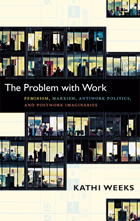 The Problem with Work: Feminism, Marxism, Antiwork Politics, and Postwork Imaginaries
Kathi Weeks
Duke University Press, 2011 In The Problem with Work, Kathi Weeks boldly challenges the presupposition that work, or waged labor, is inherently a social and political good. While progressive political movements, including the Marxist and feminist movements, have fought for equal pay, better work conditions, and the recognition of unpaid work as a valued form of labor, even they have tended to accept work as a naturalized or inevitable activity. Weeks argues that in taking work as a given, we have “depoliticized” it, or removed it from the realm of political critique. Employment is now largely privatized, and work-based activism in the United States has atrophied. We have accepted waged work as the primary mechanism for income distribution, as an ethical obligation, and as a means of defining ourselves and others as social and political subjects. Taking up Marxist and feminist critiques, Weeks proposes a postwork society that would allow people to be productive and creative rather than relentlessly bound to the employment relation. Work, she contends, is a legitimate, even crucial, subject for political theory.
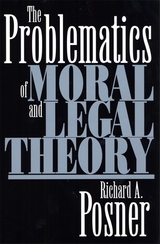 The Problematics of Moral and Legal Theory
Richard A. Posner
Harvard University Press, 2002 Ambitious legal thinkers have become mesmerized by moral philosophy, believing that great figures in the philosophical tradition hold the keys to understanding and improving law and justice and even to resolving the most contentious issues of constitutional law. They are wrong, contends Richard Posner in this book. Posner characterizes the current preoccupation with moral and constitutional theory as the latest form of legal mystification—an evasion of the real need of American law, which is for a greater understanding of the social, economic, and political facts out of which great legal controversies arise. In pursuit of that understanding, Posner advocates a rebuilding of the law on the pragmatic basis of open-minded and systematic empirical inquiry and the rejection of cant and nostalgia—the true professionalism foreseen by Oliver Wendell Holmes a century ago.A bracing book that pulls no punches and leaves no pieties unpunctured or sacred cows unkicked, The Problematics of Moral and Legal Theory offers a sweeping tour of the current scene in legal studies—and a hopeful prospect for its future.
Problems in General Linguistics: An Expanded Edition, Volume 1
Émile Benveniste
HAU, 2021 First published fifty years ago, Émile Benveniste’s two-volume Problèmes de linguistique générale revolutionized the study of linguistics and remains among the most influential texts in the field. This expanded edition of the first volume presents the original English translation by Mary Elizabeth Meek, produced in close collaboration with Benveniste himself, along with his hitherto untranslated articles on play, translation, singular and plural forms, and Indigenous North American languages. These works are contextualized by an introduction by editor Jordan K. Skinner and a preface by Roland Barthes.
This new edition will delight linguists and philosophers already familiar with Benveniste and introduce his work to a new generation of students. Benveniste studies are going through an enthusiastic revival in Europe; after reading this book, readers elsewhere will understand why.
Problems of Administration in Social Work
Pierce Atwater
University of Minnesota Press, 1940
Problems of Administration in Social Work was first published in 1940. Minnesota Archive Editions uses digital technology to make long-unavailable books once again accessible, and are published unaltered from the original University of Minnesota Press editions.
Problems of Comparability/Possibilities for Comparative Studies, Volume 32
Harry Harootunian and Hyun Ok Park, eds.
Duke University Press This special issue of boundary 2 undertakes the task of rethinking comparison studies in the humanities and social sciences in light of globalization and the shrinking importance of the nation-state, which have had the effect of diminishing the importance of national boundaries that more often than not had once defined the limits of many disciplines.
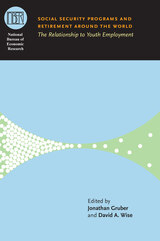 The Problems of Disadvantaged Youth: An Economic Perspective
Edited by Jonathan Gruber
University of Chicago Press, 2009 One of the most important public policy issues in the United States is how to improve the life prospects of disadvantaged youth who, in their formative years, face low-quality school systems, poor access to health care, and high-crime environments. The Problems of Disadvantaged Youth includes a broad range of research examining various aspects of disadvantage, and ways of increasing the ability of low-income youths to improve their circumstances later in life. Taking an empirical economics perspective, the nine essays in this volume assess the causal impacts of disadvantage on youth outcomes, and how policy interventions can alleviate those impacts. Each chapter develops a framework to describe the relationship between youths and later life outcomes, addressing such factors as educational opportunity, health, neighborhood crime rates, and employment. This vital book documents the serious short- and long-term negative consequences of childhood disadvantage and provides nuanced evidence of the impact of public policy designed to help needy children.
Problems of Dostoevsky’s Poetics
Mikhail Bakhtin
University of Minnesota Press, 1984 This book is not only a major twentieth-century contribution to Dostoevsky’s studies, but also one of the most important theories of the novel produced in our century. As a modern reinterpretation of poetics, it bears comparison with Aristotle.“Bakhtin’s statement on the dialogical nature of artistic creation, and his differentiation of this from a history of monological commentary, is profoundly original and illuminating. This is a classic work on Dostoevsky and a statement of importance to critical theory.” Edward Wasiolek“Concentrating on the particular features of ‘Dostoevskian discourse,’ how Dostoevsky structures a hero and a plot, and what it means to write dialogically, Bakhtin concludes with a major theoretical statement on dialogue as a category of language. One of the most important theories of the novel in this century.” The Bloomsbury Review
 The Problems of Jurisprudence
Richard A. Posner
Harvard University Press, 1990 In this book, one of our country’s most distinguished scholar-judges shares with us his vision of the law. For the past two thousand years, the philosophy of law has been dominated by two rival doctrines. One contends that law is more than politics and yields, in the hands of skillful judges, correct answers to even the most difficult legal questions; the other contends that law is politics through and through and that judges wield essentially arbitrary powers. Rejecting these doctrines as too metaphysical in the first instance and too nihilistic in the second, Richard Posner argues for a pragmatic jurisprudence, one that eschews formalism in favor of the factual and the empirical. Laws, he argues, are not abstract, sacred entities, but socially determined goads for shaping behavior to conform with society’s values.
Examining how judges go about making difficult decisions, Posner argues that they cannot rely on either logic or science, but must fall back on a grab bag of informal methods of reasoning that owe less than one might think to legal training and experience. Indeed, he reminds us, the greatest figures in American law have transcended the traditional conceptions of the lawyer’s craft. Robert Jackson did not attend law school and Benjamin Cardozo left before getting a degree. Holmes was neither the most successful of lawyers nor the most lawyerly of judges. Citing these examples, Posner makes a plea for a law that frees itself from excessive insularity and takes all knowledge, practical and theoretical, as grist for its mill.
The pragmatism that Posner espouses implies looking at problems concretely, experimentally, without illusions, with an emphasis on keeping diverse paths of inquiry open, and, above all, with the insistence that social thought and action be evaluated as instruments to desired human goals rather than as ends in themselves. In making his arguments, he discusses notable figures in jurisprudence from Antigone to Ronald Dworkin as well as recent movements ranging from law and economics to civic republicanism, and feminism to libertarianism. All are subjected to Posner’s stringent analysis in a fresh and candid examination of some of the deepest problems presented by the enterprise of law.
 Problems of Science Teaching at the College Level: The Teaching of Science at the College Level, Volume 1
Archer Hurd
University of Minnesota Press, 1929
Problems of Science Teaching at the College Level was first published in 1929. Minnesota Archive Editions uses digital technology to make long-unavailable books once again accessible, and are published unaltered from the original University of Minnesota Press editions.This is Volume I of a series of reports of investigations in the teaching of science at the college level, prepared under the supervision of Dean E. M Freeman of the college of Agriculture, Forestry and Home Economics of the University of Minnesota. Professor Archer Willis Hurd was assistant director of the Bureau of Educational Research of the University. His studies were made in the departments of Anatomy, Physiology, and Physics at the University of Minnesota during the school years 1926-1928. Evaluation of laboratory instruction,, the grouping of students for laboratory work, factors determining achievement, phases of achievement, and techniques of experimentation in method are some of the problems considered.
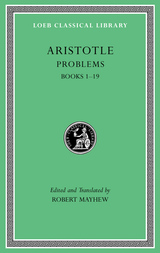 Problems, Volume I: Books 1–19
Aristotle
Harvard University Press, 2011 Peripatetic potpourri.
Aristotle of Stagirus (384–322 BC), the great Greek philosopher, researcher, logician, and scholar, studied with Plato at Athens and taught in the Academy (367–347). Subsequently he spent three years in Asia Minor at the court of his former pupil Hermeias, where he married Pythias, one of Hermeias’ relations. After some time at Mitylene, he was appointed in 343/2 by King Philip of Macedon to be tutor of his teen-aged son Alexander. After Philip’s death in 336, Aristotle became head of his own school (of “Peripatetics”), the Lyceum at Athens. Because of anti-Macedonian feeling there after Alexander’s death in 323, he withdrew to Chalcis in Euboea, where he died the following year.
Problems, the third-longest work in the Aristotelian corpus, contains thirty-eight books covering more than 900 problems about living things, meteorology, ethical and intellectual virtues, parts of the human body, and other topics. Although Problems is an accretion of multiple authorship over several centuries, it offers a fascinating technical view of Peripatetic method and thought. Problems, in two volumes, replaces the earlier Loeb edition by Hett, with a text and translation incorporating the latest scholarship.
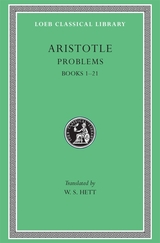 Problems, Volume I: Books 1-21
Aristotle
Harvard University Press Aristotle, great Greek philosopher, researcher, reasoner, and writer, born at Stagirus in 384 BCE, was the son of Nicomachus, a physician, and Phaestis. He studied under Plato at Athens and taught there (367–47); subsequently he spent three years at the court of a former pupil, Hermeias, in Asia Minor and at this time married Pythias, one of Hermeias’s relations. After some time at Mitylene, in 343–2 he was appointed by King Philip of Macedon to be tutor of his teen-aged son Alexander. After Philip’s death in 336, Aristotle became head of his own school (of “Peripatetics”), the Lyceum at Athens. Because of anti-Macedonian feeling there after Alexander’s death in 323, he withdrew to Chalcis in Euboea, where he died in 322.Nearly all the works Aristotle prepared for publication are lost; the priceless ones extant are lecture-materials, notes, and memoranda (some are spurious). They can be categorized as follows:I. Practical: Nicomachean Ethics; Great Ethics (Magna Moralia); Eudemian Ethics; Politics; Oeconomica (on the good of the family); Virtues and Vices.
II. Logical: Categories; On Interpretation; Analytics (Prior and Posterior); On Sophistical Refutations; Topica.
III. Physical: Twenty-six works (some suspect) including astronomy, generation and destruction, the senses, memory, sleep, dreams, life, facts about animals, etc.
IV. Metaphysics: on being as being.
V. On Art: Art of Rhetoric and Poetics.
VI. Other works including the Athenian Constitution; more works also of doubtful authorship.
VII. Fragments of various works such as dialogues on philosophy and literature; and of treatises on rhetoric, politics and metaphysics.The Loeb Classical Library® edition of Aristotle is in twenty-three volumes.
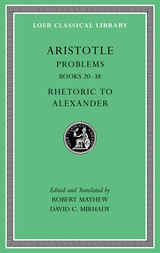 Problems, Volume II: Books 20–38. Rhetoric to Alexander
Aristotle
Harvard University Press, 2011 Peripatetic potpourri.
Aristotle of Stagirus (384–322 BC), the great Greek philosopher, researcher, logician, and scholar, studied with Plato at Athens and taught in the Academy (367–347). Subsequently he spent three years in Asia Minor at the court of his former pupil Hermeias, where he married Pythias, one of Hermeias’ relations. After some time at Mitylene, he was appointed in 343/2 by King Philip of Macedon to be tutor of his teen-aged son Alexander. After Philip’s death in 336, Aristotle became head of his own school (of “Peripatetics”), the Lyceum at Athens. Because of anti-Macedonian feeling there after Alexander’s death in 323, he withdrew to Chalcis in Euboea, where he died the following year.
Problems, the third-longest work in the Aristotelian corpus, contains thirty-eight books covering more than 900 problems about living things, meteorology, ethical and intellectual virtues, parts of the human body, and other topics. Although Problems is an accretion of multiple authorship over several centuries, it offers a fascinating technical view of Peripatetic method and thought. Both Problems, in two volumes, and Rhetoric to Alexander replace the earlier Loeb edition by Hett and Rackham, with texts and translations incorporating the latest scholarship.
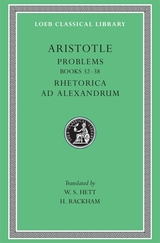 Problems, Volume II: Books 22-38. Rhetorica ad Alexandrum
Aristotle
Harvard University Press Aristotle, great Greek philosopher, researcher, reasoner, and writer, born at Stagirus in 384 BCE, was the son of Nicomachus, a physician, and Phaestis. He studied under Plato at Athens and taught there (367–47); subsequently he spent three years at the court of a former pupil, Hermeias, in Asia Minor and at this time married Pythias, one of Hermeias’s relations. After some time at Mitylene, in 343–2 he was appointed by King Philip of Macedon to be tutor of his teen-aged son Alexander. After Philip’s death in 336, Aristotle became head of his own school (of “Peripatetics”), the Lyceum at Athens. Because of anti-Macedonian feeling there after Alexander’s death in 323, he withdrew to Chalcis in Euboea, where he died in 322.Nearly all the works Aristotle prepared for publication are lost; the priceless ones extant are lecture-materials, notes, and memoranda (some are spurious). They can be categorized as follows:I. Practical: Nicomachean Ethics; Great Ethics (Magna Moralia); Eudemian Ethics; Politics; Oeconomica (on the good of the family); Virtues and Vices.
II. Logical: Categories; On Interpretation; Analytics (Prior and Posterior); On Sophistical Refutations; Topica.
III. Physical: Twenty-six works (some suspect) including astronomy, generation and destruction, the senses, memory, sleep, dreams, life, facts about animals, etc.
IV. Metaphysics: on being as being.
V. On Art: Art of Rhetoric and Poetics.
VI. Other works including the Athenian Constitution; more works also of doubtful authorship.
VII. Fragments of various works such as dialogues on philosophy and literature; and of treatises on rhetoric, politics and metaphysics.The Loeb Classical Library® edition of Aristotle is in twenty-three volumes.
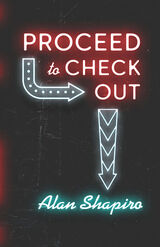 Proceed to Check Out
Alan Shapiro
University of Chicago Press, 2022 Award-winning poet Alan Shapiro offers a new collection of poems reflecting on mortality and finitude.
Alan Shapiro’s fourteenth collection of poetry, Proceed to Check Out, is a kind of summing up, or stock-taking, by an aging poet, of his precarious place in a world dominated by the ever-accelerating pace of technological innovation, political disruption, personal loss, and racial strife. These poems take on fundamental subjects—like the nature of time and consciousness and how or why we become who we are—but Shapiro presses them into becoming urgent and timely.
Employing idiomatic range and formal variety, Shapiro’s poems move through recurring dreams, the coercions of childhood, and the mysterious connections of mind and matter, pleasure and memory. They meet an abiding need to find empathy and understanding in even the most challenging places—amid disaffection, public discord, and estrangement. His grasp of contemporary life—in all its insidious violence and beauty—is distinct, comprehensive, and profound.
 Proceed with Caution, When Engaged by Minority Writing in the Americas
Doris Sommer
Harvard University Press, 1999 Let the reader beware. Educated readers naturally feel entitled to know what they're reading--often, if they try hard enough, to know it with the conspiratorial intimacy of a potential partner. This book reminds us that cultural differences may in fact make us targets of a text, not its co-conspirators. Some literature, especially culturally particular or "minority" literature, actually uses its differences and distances to redirect our desire for intimacy toward more cautious, respectful engagements. To name these figures of cultural discontinuity--to describe a rhetoric of particularism in the Americas--is the purpose of Proceed with Caution.
In a series of daring forays, from seventeenth-century Inca Garcilaso de la Vega to Julio Cortázar and Mario Vargas Llosa, Doris Sommer shows how ethnically marked texts use enticing and frustrating language games to keep readers engaged with difference: Gloria Estefan's syncopated appeal to solidarity plays on Whitman's undifferentiated ideal; unrequitable seductions echo through Rigoberta Menchú's protestations of secrecy, Toni Morrison's interrupted confession, the rebuffs in a Mexican testimonial novel. In these and other examples, Sommer trains us to notice the signs that affirm a respectful distance as a condition of political fairness and aesthetic effect--warnings that will be audible (and engaging for readings that tolerate difference) once we listen for a rhetoric of particularism.
PROCEEDINGS OF AN INTERNATIONAL CONFERENCE ON HISTORIC BRIDGES
EMORY L. KEMP
West Virginia University Press, 1999
In 1849, the new Wheeling Suspension Bridge was a triumph of engineering, the world's longest clear span bridge. The Wheeling bridge was also a landmark in the development of the American frontier, spanning the Ohio River to speed settlement and commerce in the Midwest and beyond. In 1999, historians, engineers, and industrial archaeologists from around the world met in Wheeling to celebrate the still-busy bridge's 150th anniversary. This book presents highlights of the conference, and points out the far-reaching effects of bridge-building.
The Proceedings of the Fifteenth West Coast Conference on Formal Linguistics
Edited by Brian Agbayani and Sze-Wing Tang
CSLI, 1997 This volume presents the proceedings of the fifteenth West Coast Conference on Formal Linguistics held at the University of California, Irvine. This volume is a comprehensive representation of the papers presented at the conference in the areas of syntax, semantics and phonology, including a special focus on Native American phonology and syntax. Topics range from underspecification and natural classes to child language, with languages covered ranging from Basque to Navajo.
This volume will be of interest to a wide range of linguists covering numerous special interests and fields.
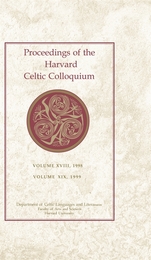 Proceedings of the Harvard Celtic Colloquium, 18: 1998 and 1999
Michael Linkletter
Harvard University Press The Harvard Celtic Colloquium was established in 1980 by two graduate students in the Harvard University Department of Celtic Languages and Literatures as a forum in which graduate students could share their work and gain experience in professional academia. Since then, it has been organized annually by a team of students in the department, grown in size, and gained an international reputation which annually draws a diverse mix of scholars from around the world to present papers on all facets of Celtic Studies.
The Harvard Celtic Colloquium is the only conference in the field of Celtic Studies to be wholly organized and run by graduate students. Since its inception, established and internationally-renowned scholars in Celtic as well as graduate students, junior academics, and unaffiliated scholars have been drawn to this dynamic setting, presenting papers on ancient, medieval, and modern topics in the many disciplines relating to Celtic Studies; including literature, linguistics, art, archeology, government, economics, music, and history.
Papers given at the Colloquium may be submitted for review to the organizers of the conference, who become the editors for those papers selected for publication in the Proceedings of the Harvard Celtic Colloquium. Only papers presented at the annual conference are considered for publication.
Harvard University Press is proud to announce that we will distribute the Proceedings of the Harvard Celtic Colloquium. Two new issues are available this Fall: Volume 18/19 (1998 and 1999) and Volume 20/21 (2000 and 2001). Back issues are also available.
 Proceedings of the Harvard Celtic Colloquium, 20: 2000 and 2001
Hugh Fogarty
Harvard University Press Proceedings of the Harvard Celtic Colloquium, 20 includes “Retoiric and Composition in Geneamuin Chormaic,” by Hugh Fogarty; “Classical Ethnography and Celts: Can We Trust the Sources?” by Philip Freeman; “Prayers, Prizefights and Prostitution: The Medieval Irish Cemetery and Its Many Uses,” by Susan Leigh Fry; “Magical Realism and the Mabinogi: An Exercise in Methodology,” by Michael Linkletter; “Rebuke and Revision in the Early Irish Annals: The Death-Notices of Muirchertach mac Ercae [†534],” by Laurence Maney; “‘To a man for the King’: The Allegiance of Welsh Catholics during the First Civil War, 1642–46,” by Robert Matthews; “King and Druid,” by Arun Micheelsen; “‘Words, words, words’: Language about Language in France and Ireland,” by Grace Neville; “Ystoria Tri Brenin o Gwlen,” by Prydwyn Piper; and “Highland Motives in the Jacobite Rising of 1745–46: ‘Forcing Out,’ Traditional Documentation and Gaelic Poetry,” by James A. Stewart, Jr.
Proceedings of the Harvard Celtic Colloquium, 21 includes “Gendering the Vita Prima: An Examination of St. Brigid’s Role as ‘Mary of the Gael,’” by Diane Peters Auslander; “Apollonius of Rhodes’ Argonautica: A Mythology of Greek Expansion in Celtic Lands,” by Timothy P. Bridgman; “The Wealth of the Medieval Welsh Gentry: The Case of Gwilym ap Gruffydd of Penrhyn,” by A. D. Carr; “Celtic Languages in the 1910 U.S. Census,” by Jonathan Dembling; “Digging Deeper: Adventures in Medieval Irish Burial and the Case for Interdisciplinary Scholarship,” by Susan Leigh Fry; “Laoiseach Mac an Bhaird and the Politics of Close Reading,” by Sarah E. McKibben; “Prescient Birds and Prospective Kings: Further Comments on Irish Elements in the Eddic Poem Rígsþula,” by Amy Eichhorn Mulligan; “The Descent of the Gods: Creation, Cosmogony, and Divine Order in Lebor Gabála,” by Sharon Paice Macleod; “Babel Is Come Again: Linguistic Colonisation and the Bardic Response in Early Modern Ireland,” by Patricia Palmer; “‘In Defiance of the Gospel and by Authority of the Devil’: Criticism of Welsh Marriage Law by the English Ecclesiastical Establishment and Its Socio-Political Context,” by Laura Radiker; and “The Way We Were: Twentieth Century Brittany through the Eyes of Breton Language Memorialists,” by Lenora Timm.
 Proceedings of the Harvard Celtic Colloquium, 22: 2002
Kathryn Izzo
Harvard University Press Proceedings of the Harvard Celtic Colloquium, 22 includes “Toward a Breton Musical Patrimony: Symbiosis and Synthesis of the Folkloric, the Classical, and the Impressionistic,” by Paul-André Beméchat; “Celts and Hyperboreans: Crossing Mythical Boundaries,” by Timothy Bridgman; “The Sea as an Emotional Landscape in Scottish Gaelic Song,” by Màiri Sìne Chaimbeul; “Patriarchy and Power in Medieval Welsh Literature,” by Kirstie Chandler; “Tamlachta: The Map of Plague Burials and Some Implications for Early Irish History,” by Gene Haley; “A Social History of Houses: The Hebridean Example,” by Catriona Machie; “Some Thoughts on the Operation of Native Law in Medieval Ireland,” by Kevin Murray; “French Connections from Tipperary to Toulouse in the Ryan of Inch Papers, 1820,” by Grace Neville; “‘On va Parler Breton a Bruxelles?’: The Impact of the European Union on Celtic Cultural and National Identities,” by Lenora Timm; and “The Search for the Holy Grail: Scholars, Critics, and Occultists,” by Juliette Wood.
 Proceedings of the Harvard Celtic Colloquium, 23: 2003
Bettina Kimpton
Harvard University Press This volume includes “Milesians and Alans in the Northwest of the Iberian Peninsula and the Mythical Invasion of Ireland,” by Manuel Alberro; “The Breton Compositions of Jean Cras,” by Paul André Bempéchat; “The ‘Gallic Disaster’: Did Dionysius I of Syracuse Order It?,” by Timothy Bridgman; “Dangerous Liaisons,” by Marion Deane; “Cernunnos: Looking a Different Way,” by David Fickett-Wilbar; “Epic or Exegesis? The Form and Genesis of the Táin Bó Cúalnge,” by John J. Fisher; “Introducing King Nuadha: Mythology and Politics in the Belfast Murals,” by Alexandra Hartnett; “‘Gaelic Political Scripture’: Uí Mhaoil Chonaire Scribes and the Book of Mac Murchadha Caomhánach,” by Benjamin James Hazard; “Voice, Power, and Narrative Structure in Orgain Denna Rig,” by Bettina Kimpton; “Cú Chulainn: God, Man, or Animal?,” by Erik Larsen; “The Celtic Seasonal Festivals in the Light of Recent Approaches to the Indo-European Ritual Year,” by Emily Lyle; “The Date and Provenance of Vita Prima Sanctae Brigitae,” by Laurance Maney†; “Spirit and Flesh in Twentieth-Century Welsh Poetry: A Comparison of the Works of D. Gwenalt Jones (1899–1968) and Pennar Davies (1911–1996),” by D. Densil Morgan; “Joseph Cooper Walker’s Historical Memoirs of the Irish Bards (1786): Significance and Impact,” by Lesa Ní Mhunghaile; “Old Irish *desgabál and the Concept of Ascension in Irish Religious Texts,” by Brian Ó Broin; “Oenach Aimsire na mBan: Early Irish Seasonal Celebrations, Gender Roles, and Mythological Cycles,” by Sharon Paice MacLeod; “Literature Reviews in An Claidheamh Soluis: A Journalistic Insight to Irish Literary Reviews in the Revival Period 1899–1932,” by Regina Uí Chollatáin; and “Celtic Ornament, Irish Gospel Book Decoration, and the Illustrated Prose Lancelot of Yale 229,” by Elizabeth Moore Willingham.
 Proceedings of the Harvard Celtic Colloquium, 24: 2004 and 2005
Samuel Jones
Harvard University Press Proceedings of the Harvard Celtic Colloquium, 24 includes “The Celticity of Galicia and the Arrival of the Insular Celts,” by Manuel Alberro; “Reading Aislinge Óenguso as a Christian-Platonist Parable,” by Brenda Gray; “Celtic Legends in Irish Opera, 1900–1930,” by Axel Klein; “‘I wonder what the king is doing tonight’—Looking for Arthur in All the Wrong Places,” by Laurance J. Maney†; “What Future for the Irish Gaeltacht Communities in the Twenty-First Century?” by Nollaig Ó Gadhra†; “Acallam Na Senórach as Prosimetrum,” by Geraldine Parsons; “Traditional and Courtly Themes in a Medieval Welsh Elegy to a ‘Góann Wargann Wery’ (‘A Fair Virgin, Meek and Mild’),” by Laura Radiker; and “Welsh Prophetic Poetry in the Age of the Princes,” by Elizabeth Schoales.
Proceedings of the Harvard Celtic Colloquium, 25 includes “Keltoi, Galatai, Galli: Were They All One People?” by Timothy P. Bridgman; “On Verbal Nouns in Celtic Languages,” by Chao Li; “Cross-Linguistic Discourse Markers in Manx Gaelic and English,” by Marie Clague; “The Acallam na Senórach: A Medieval Instruction Manual,” by Annie Donahue; “Gendered Postcolonial Discourse in the Mabinogi,” by Morgan Kay; “Language Death and Resurrection in the Isle of Man: The Continuity of Manx Gaelic Exemplified by the Use of Inflected Verb Tenses,” by Jennifer Kewley Draskau; “High Kings and Pipe Dreams: Revisiting John Vincent Kelleher’s Theory of Revision to the Early Irish Annals,” by Laurance J. Maney†; and “The Rise of Christian Nomenclature in Medieval Scotland,” by David Morris.
 Proceedings of the Harvard Celtic Colloquium, 26: 2006 and 2007
Christina Chance
Harvard University Press Proceedings of the Harvard Celtic Colloquium, 26 includes “Heroic Recycling in Celtic Tradition,” by Joseph F. Nagy; “On the Celtic-American Fringe: Irish–Mexican Encounters in the Texas–Mexico Borderlands,” by Marian J. Barber; “The Encomium Urbis in Medieval Welsh Poetry,” by Helen Fulton; “Prophecy in Welsh Manuscripts,” by Morgan Kay; “‘Ceol agus Gaol’ (‘Music and Relationship’): Memory, Identity, and Community in Boston’s Irish Music Scene,” by Natalie Kirschstein; “Colonization Circulars: Timber Cycles in the Time of Famine,” by Kathryn Miles; “Up Close and Personal: The French in Bantry Bay (1796) in the Bantry Estate Papers,” by Grace Neville; “In Praise of Two Margarets: Two Laudatory Poems by Piaras Feiritéar,” by Deirdre Nic Mhathúna; “Observations on Cross-Cultural Names and Name Patterns in Medieval Wales and the March,” by Laura Radiker; and “Mouth to Mouth: Gaelic Stories as Told within One Family,” by Carol Zall.
Proceedings of the Harvard Celtic Colloquium, 27 includes “Poets and Carpenters: Creating the Architecture of Happiness in Late-Medieval Wales,” by Richard Suggett; “Revisiting Preaspiration: Evidence from the Survey of the Gaelic Dialects of Scotland,” by Anna Bosch; “The Anoetheu Dialogue in Culhwch ac Olwen,” by Fiona Dehghani; “Homophony and Breton Loss of Lexis,” by Francis Favereau; “The Origins of ‘the Jailtacht,’” by Diarmait Mac Giolla Chríost; “A Confluence of Wisdom: The Symbolism of Wells, Whirlpools, Waterfalls and Rivers in Early Celtic Sources,” by Sharon Paice MacLeod; “The Real Charlotte: The Exclusive Myth of Somerville and Ross,” by Donald McNamara; “Language Shift in Early Twentieth-Century Ireland,” by Máire Ní Chiosáin; and “Conceptions of an Urban Ideal and the Early Modern Welsh Town,” by Sally-Anne Shearn.
 Proceedings of the Harvard Celtic Colloquium, 28: 2008
Kassandra Conley
Harvard University Press This volume includes “The Influence of Nineteenth-Century Anthologies of Celtic Music in Redefining Celtic Nationalism,” by Graham Aubrey; “Breuddwyd Rhonabwy and Memoria,” by Matthieu Boyd; “A Reactionary Dimension in Progressive Revolutionary Theories? The Case of James Connolly’s Socialism Founded on the Re-Conversion of Ireland to the Celtic System of Common Ownership,” by Olivier Coquelin; “The Spiteful Tongue: Breton Song Practices and the Art of the Insult,” by Natalie A. Franz; “Celtic Democracy: Appreciating the Role Played by Alliances and Elections in Celtic Political Systems,” by D. Blair Gibson; “Pendragon’s Ancestors,” by Nathalie Ginoux; “When Historians Study Breton Oral Ballads: A Cultural Approach,” by Éva Guillorel; “Textual and Historical Evidence for an Early British Tristan Tradition,” by Sabine Heinz; “Time and the Irish: An Analysis of the Temporal Frameworks Employed by Sir Henry Maine, Eóin MacNeill, and James Connolly in Their Writings on Early Modern Ireland,” by Heather Laird; “‘And thus I will it’: Queen Medh and the Will to Power,” by Edyta Lehmann; “Judas, His Sister, and the Miraculous Cock in the Middle Irish Poem Críst ro crochadh,” by Christopher Leydon; “Se principen nominat: Rhetorical Self-Fashioning and Epistolary Style in the Letters of Owain Gwynedd,” by Patricia Malone; “Abduction, Swordplay, Monsters, and Mistrust: Findabair, Gwenhwyfa, and the Restoration of Honour,” by Sharon Paice MacLeod; and “Performing a Literary Paternity Test: Bonedd yr Arwyr and the Fourth Branch of the Mabinogi,” by Sarah Zeiser.
 Proceedings of the Harvard Celtic Colloquium, 29: 2009
Kassandra Conley
Harvard University Press This volume includes “Fabricating Celts: How Iron Age Iberians Became Indo-Europeanized during the Franco Regime,” by Aarón Alzola Romero and Eduardo Sánchez-Moreno; “Nations in Tune: The Influence of Irish Music on the Breton Musical Revival in the 1960s and 1970s,” by Yann Bévant; “Ethnicity, Geography, and the Passage of Dominion in the Mabinogi and Brut y Brenhinedd,” by Christina Chance; “Rejecting Mother’s Blessing: The Absence of the Fairy in the Welsh Search for Identity,” by Adam Coward; “Gwalarn: An Attempt to Renew Breton Literature,” by Gwendal Denez and Erwan Hupel; “At the Crossroads: World War One and the Shifting Roles of Men and Women in Breton Ballad Song Practice,” by Natalie Anne Franz; “Apocryphal Sanctity in the Lives of Irish Saints,” by Máire Johnson; “An Dialog etre Arzur Roe d’an Bretounet ha Guynglaff and Its Connections with Arthurian Tradition,” by Herve Le Bihan; “A Walk on the Wild Side: Women, Men, and Madness,” by Edyta Lehmann; “The Early Establishment of Celtic Studies in North American Universities,” by Michael Linkletter; “‘In t-indellchró bodba fer talman’: A Reading of Cú Chulainn’s First Recension ríastrad,” by Elizabeth Moore; “Dream and Vision in Late-Medieval Scotland: The Epic Case of William Wallace,” by Kylie Murray; “‘Some of you will curse her’: Women’s Writing during the Irish-Language Revival,” by Riona Nic Congáil; “Dating Peredur: New Light on Old Problems,” by Natalia I. Petrovskaia; “‘From the shame you have done’: Comparing the Stories of Blodeuedd and Bláthnait,” by Sarah L. Pfannenschmidt; and “‘And there was a fourth son’: Narrative Variation in Cyfranc Lludd a Llefelys,” by Kelly Ann Randell.
Proceedings of the Harvard Celtic Colloquium, 30: 2010
Erin Boon
Harvard University Press, 2011 Proceedings of the Harvard Celtic Colloquium has in its purview all aspects of culture, language, and history of the Celtic peoples, from ancient to modern times.
This volume of PHCC contains articles on medieval Irish, Welsh, and Breton literature; post-1800 to modern poetry in Irish, Welsh, and Scottish Gaelic; the Irish Revival Movement; and modern Irish and Welsh linguistics. The volume also features the 2010 J. V. Kelleher Lecture by Dr. M. Katharine Simms on the social expression of the literary model of the barefoot king in late medieval Ireland.
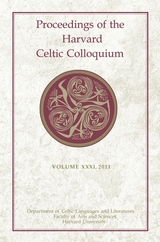 Proceedings of the Harvard Celtic Colloquium, 31: 2011
Deborah Furchtgott
Harvard University Press, 2012 Proceedings of the Harvard Celtic Colloquium has in its purview all aspects of culture, language, and history of the Celtic peoples, from ancient to modern times. PHCC, 31 features “Culture, Identity and the Medieval Revival in Victorian Wales,” the 2011 J. V. Kelleher lecture given by Huw Pryce of Bangor University, Wales, which looks at Victorian views of the past in Wales. The volume also considers the linguistic shifts in several of the Celtic languages, both in early periods and more recent times, and it contains articles concerning the history, culture, and literatures of Ireland, Wales, and Cornwall. In addition, PHCC, 31 includes several articles on historiography in various areas and times, as well as others that examine later reflections on the Easter Rising in Ireland (1916), the renewed interest in regional language in Cornwall, the historic reflexes of the title Bragmaticus, and literary reflexes of archaeological remains in medieval Wales.
Proceedings of the Harvard Celtic Colloquium, 32: 2012
Deborah Furchtgott
Harvard University Press The Proceedings of the Harvard Celtic Colloquium has in its purview all aspects of culture, language, and history of the Celtic peoples, from ancient to modern times. PHCC, 32 is largely focused on the culture and literature of medieval Ireland, with some attention to the additional topics of Scots Gaelic poetry, medieval Welsh genealogy, and twentieth century pan-Celtic nationalism. The articles on Irish literature consider a wide variety of genre: place name lore, annals, hagiography, native tales, and the national epic Táin Bó Cuailnge. Contributors to this volume discuss both prose and poetry, and they consider cultural influences, history, archaic sources, and affinities with European and Indo-European models, tropes, and styles.
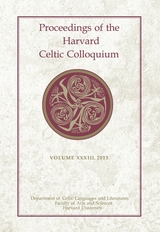 Proceedings of the Harvard Celtic Colloquium, 33: 2013
Liam Anton Brannelly
Harvard University Press The Harvard Celtic Colloquium provides a small but international audience for presentations by scholars from all ranks of scholarship and all areas of Celtic Studies. Among the topics covered are the archaeology, history, culture, linguistics, literatures, politics, religion, and social structures of the countries and regions in which Celtic languages are, or were, spoken, as well as their extended influence, from prehistory to the present. The broad range of the conference is reflected in the content of its published proceedings, which will interest both students newly attracted to Celtic Studies and senior scholars in the field.
PHCC, 33 features the annual John V. Kelleher Lecture for 2013, given by Thomas Owen Clancy, Professor of Celtic at the University of Glasgow, Scotland. Clancy discusses connections between Scottish saints’ names and cults and the onomastics of settlements and topographical features gathered and investigated in preparation for a digital atlas project, “Commemoration of Saints in Scottish Place Names.” In addition, PHCC, 33 includes contributions in the areas of Irish, Welsh, and Scottish history, Irish and Welsh literature and poetry, and Irish ecclesiastical learning.
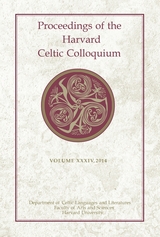 Proceedings of the Harvard Celtic Colloquium, 34: 2014
Liam Anton Brannelly
Harvard University Press The Harvard Celtic Colloquium provides a small but international audience for presentations by scholars from all ranks of scholarship and all areas of Celtic Studies. Among the topics covered are the archaeology, history, culture, linguistics, literatures, politics, religion, and social structures of the countries and regions in which Celtic languages are, or were, spoken, and their extended influence, from prehistory to the present. The broad range of the conference is reflected in the content of its published proceedings, which will interest students newly attracted to Celtic Studies as well as senior scholars in the field.
PHCC 34 includes the John V. Kelleher Lecture for 2014 given by Ann Parry Owen, “‘An audacious man of beautiful words’: Ieuan Gethin (c.1390–c.1470).” Several papers in this volume deal with the reflection of political forces and contemporary leaders in the early modern period in the literature of Ireland and Wales. Others consider the influence of Christian authors on Ireland as reflected in various surviving literary documents and tales. Of particular interest for the history of Celtic Studies are articles on early scholarship in the field, and Irish and Welsh vernacular authors who incorporated medieval literary motifs into their own work.
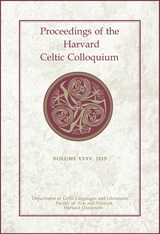 Proceedings of the Harvard Celtic Colloquium, 35: 2015
Gregory Darwin
Harvard University Press The Harvard Celtic Colloquium provides a small but international audience for presentations by scholars from all ranks of scholarship and all areas of Celtic Studies, the archaeology, history, culture, linguistics, literatures, politics, religion, and social structures of the countries and regions in which Celtic languages are or were spoken, and their extended influence, from prehistory to the present. The broad range of the conference is reflected in the content of its published proceedings, which will interest students newly attracted to Celtic Studies as well as senior scholars in the field.
PHCC, 35 includes the 2015 John V. Kelleher Lecture, “Whodunnit? Indirect Evidence in Early Irish Law,” given by Dr. Fergus Kelly of the School of Celtic Studies, Dublin Institute for Advanced Studies, Dublin, Ireland. Kelly is highly regarded for his command of the large and complex body of Irish legal literature and its social context. Other papers in this volume concern the social context and manuscript tradition of early Irish law; medieval Welsh and Irish literary, poetical, and hagiographical material; modern uses of medieval themes; modern Celtic languages, Irish, Welsh and Breton; and the considerations of using digital resources for Celtic Studies.
Proceedings of the Harvard Celtic Colloquium, 36: 2016
Michaela Jacques
Harvard University Press This volume of the Proceedings of the Harvard Celtic Colloquium offers a wide range of articles on topics across the field of Celtic Studies. It includes the 2016 J. V. Kelleher Lecture delivered by Jerry Hunter, professor of Welsh at Bangor University, Wales, entitled “The Red Sword, the Sickle and the Author’s Revenge: Welsh Literature and Conflict in the Seventeenth Century.” The articles from other presentations at the Colloquium focus upon language and literary studies from a broad variety of time periods and linguistic areas, including Irish, Welsh, Scots-Gaelic, with some reference to archaic or smaller regional Celtic languages. In addition to linguistic and literary topics, the volume includes some articles on the folkloric and religious culture of Celtic culture and society.
Proceedings of the Harvard Celtic Colloquium, 37: 2017
Celeste Andrews
Harvard University Press This volume of the Proceedings of the Harvard Celtic Colloquium offers a wide range of articles on topics across the field of Celtic Studies.
It includes the 2017 J. V. Kelleher lecture delivered by Paul Russell, Professor of Celtic, University of Cambridge, entitled “‘Mistakes of All Kinds’: The Glossography of Medieval Irish Literary Texts.” In this address Russell offers cogent analysis of this rarely addressed facet of medieval Irish codicology. The articles from other presentations at the Colloquium extend the focus on Celtic glossing into other areas of Celtic linguistics and literary studies. In addition, the volume includes articles on the medieval folkloric, religious, legal, and material culture of Celtic communities, some aspects of which persist into modernity. This volume exemplifies the broad range of topics and time periods characteristic of the Harvard Celtic Colloquium.
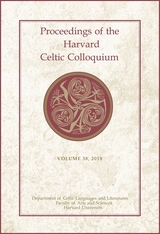 Proceedings of the Harvard Celtic Colloquium, 38: 2018
Celeste Andrews
Harvard University Press Proceedings of the Harvard Celtic Colloquium, 38 collects papers ranging widely on topics of the literary and material culture of the Celtic regions of Ireland, Wales, and Breton in the medieval and modern periods. Several articles concern the self-awareness of the literary elite in Ireland and Wales, whose members respected the traditional forms of their literature but used them to further contemporary purposes. For example, they introduce new references to foreign places and cultures, or use older topographical lore to describe and justify contemporary land use and settlement. Other articles review material culture as it is reflected in literary works of their respective periods and discuss how this in turn illuminates the attitudes of the authors and their intended readers. A number of contributions concern the grammatical structure and linguistic formation of the languages of Ireland, Wales, and Brittany, both early and modern.
The special lecture for the Harvard Celtic Colloquium this year was given by Dr. Aled Jones, Senior Lecturer in Welsh and Medieval Studies at Bangor University, Wales, comparing modern astrophysics to the plasticity of time in medieval Celtic literature, a thought-provoking consideration of congruences in modern and medieval conceptions of time and space. This volume also contains the 2018 Kelleher lecture given by Dr. William Gilles of the University of Edinburgh on a problematic early Scots-Gaelic text, the Harlaw Brosnachadh.
Proceedings of the Harvard Celtic Colloquium, 39: 2019
Myrzinn Boucher-Durand
Harvard University Press This volume of the Proceedings of the Harvard Celtic Colloquium offers a wide range of articles on topics across the field of Celtic Studies. It includes the Colloquium keynote given by Prof. Barbara Hillers which studied the literary use of folklore, Irish and international, in the Irish tale “Aislinge Meic Con Glinne” (“The Vision of Mac Con Glinne”).
More recent literary topics expand the scope of this volume from the medieval into the early modern period, and into the early twentieth century. Of special interest to scholars of more recent times will be articles on the Irish language in nineteenth-century American print media, and on the unpublished sequel by Muiris Ó Súilleabháin to his memoir Fiche Blian ag Fás (1933), which was published in English as Twenty Years a-Growing.
Proceedings of the Harvard Celtic Colloquium, 40: 2021
Lorena Alessandrini
Harvard University Press This volume of Proceedings of the Harvard Celtic Colloquium is graced with two J. V. Kelleher lectures: the 2019 lecture by Máire Ní Mhaonaigh on Irish chronicles and the 2021 presentation by Ruairí Ó hUiginn assessing the Irish genealogical corpus in its sociological context. It also includes Georgia Henley’s 2021 keynote on the differing literary receptions in Norman Ireland and Wales of Geoffrey of Monmouth’s history of Britain and related prophecies.
Other articles in Volume 40 survey a wide array of topics in Celtic Studies, centering on Irish and Welsh material with the smaller language areas appearing as well, and ranging from medieval to modern times. While most are literary or linguistic in their focus, some historical context is also provided.
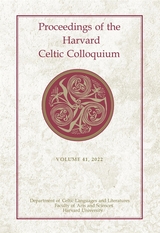 Proceedings of the Harvard Celtic Colloquium, 41: 2022
Lorena Alessandrini
Harvard University Press The sixteen articles in Proceedings of the Harvard Celtic Colloquium, 41, present a broad range of topics in Celtic Studies and an equally broad time scale. The October 2022 keynote by Dr. Natasha Sumner examines the common folklore trope in Celtic literature of an individual trapped, tricked, or accidentally trespassing into the Otherworld, seeking escape or rescue. Several contributions to the volume examine Irish and Welsh poetry, medieval and modern in both form and content. Women, as poets as well as subjects, are highlighted. Literary culture in the early modern period in Ireland is covered through published reviews, as well as in an article about an Irish émigré’s notebook. Medieval Irish religious beliefs feature in articles on Irish hagiography, divination, and the use of relics. Drama and performance are represented in two articles which discuss Welsh translations of Shakespeare and Scots-Gaelic theatre. A study of place names in the vicinity of Iona reveals a cultural topography as well as actual landscape. An investigation into the attitudes towards the disabled and impaired in medieval Irish literature, an apparently modern concern, finds surprising resonance with themes of compassion and acceptance.
Proceedings of the Harvard Celtic Colloquium, 42: 2023
Dylan R. Cooper, Rachel Martin, Graham O'Toole, and Samuel Ezra Puopolo
Harvard University Press Proceedings of the Harvard Celtic Colloquium, Volume 42 begins with two distinguished lectures from the 2023 Harvard Celtic Colloquium. Dr. Helen Fulton explored the links between place and emotion in CelticR narrative as evoked by the author and experienced by the audience in her J. V. Kelleher Lecture. Dr. Gregory Darwin gave the keynote address on some facets of maritime folklore. Other presentations at the Colloquium to be published in this volume examine the Irish language and its effect on English in Ireland, Irish topography, medieval libraries, the role of music in the Welsh Mabinogi, and the emerging area of animal studies in relation to Celtic literature.
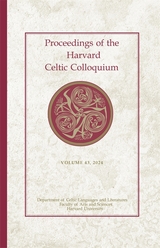 Proceedings of the Harvard Celtic Colloquium, 43: 2024
Dylan R. Cooper, Samuel Ezra Puopolo, Dolan Wells Gallagher, and Rory O'Malley Yarter
Harvard University Press Proceedings of the Harvard Celtic Colloquium, Volume 43 showcases the wide geographic, temporal, and linguistic range of the presentations at the 2024 Harvard Celtic Colloquium. This volume contains Liam Breatnach’s 2024 J. V. Kelleher lecture on the Senchas Már, an early Irish legal text and Benjamin Bruch’s keynote address on the quantity system shared by the p-Celtic languages Cornish and Welsh. The ten other articles present detailed studies of various aspects of Irish and Welsh language, literature, folklore, and culture, both medieval and contemporary. Several of them examine Irish and Welsh literature in a European context. These range from analysis of portrayal of Ireland in film, to enduring lore concerning the Irish famine, to themes of ecology in the writing of Rachel Carson and R. Williams Parry. Two articles examine religious tenets, one on the medieval context of the Apostles Creed in post Conquest Wales, and the other compares how gender influenced the idea of penance in medieval Ireland and Korea.
Process: A Novel
Kay Boyle. Edited and with an Introduction by Sandra Spanier
University of Illinois Press, 2006 Three quarters of a century after the manuscript of Kay Boyle’s first novel disappeared, a carbon copy of it was discovered by Sandra Spanier, the preeminent Boyle authority. Set off by Spanier’s substantial introduction, Process is published here for the first time in paperback. A classic bildungsroman, Process tells the story of Kerith Day, who is in search of her own identity and place in the world. A keenly critical observer of the dreary industrial landscape and the beaten-down inhabitants of her native Cincinnati, Ohio, Kerith is determined to discover something better. She places her faith in art and politics and sets off for France, where workers and radicals are on the same side.
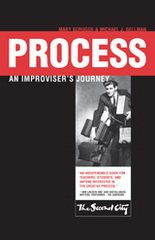 Process: An Improviser's Journey
Mary Scruggs and Michael J. Gellman, with an foreword by Anne Libera
Northwestern University Press, 2007 Process: An Improviser's Journey is an invaluable resource for mastering improv. Author, teacher, and improviser Michael Gellman was given a mission by famed improv coach Del Close: “[T]o create improvised one-act plays of literary quality from scratch.” Already steeped in the world of improvisation, he took it upon himself to do this, in the form of a class for other improvisers in which they would build the skills necessary to execute such a seemingly tall order. Scruggs and Gellman’s book, modeled after Stanislavski’s timeless An Actor Prepares, follows a fictional young actor taking Gellman’s real-life class. Scruggs and Gellman introduce readers to Geoff, who has just moved to Chicago to pursue acting. He undergoes the standard trials of audition and rejection before he takes the advice of a fellow actor and turns to improv classes at Second City. At first, Geoff thinks improvisation is about laughs and loosening up, but he soon learns that it is a powerful tool as well as an end in itself. Through Geoff’s eyes, the book introduces readers to key tenets of improvisation: concentration, visualization, focus, object work, being in the moment, and the crucial “yes, and.” His experiences with the basics of improvisation do serve to get him a few roles, but his real breakthrough comes when he signs up for an improvised one-act class with Michael Gellman. He and his classmates arrive unprepared for the challenge, but with Gellman’s prompts and advice, they slowly move through process to performance over the course of three seasons in Chicago. The class culminates with their final project: a completely improvised one-act play performed in front of a live audience.
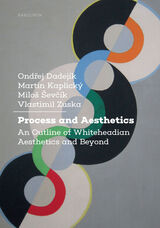 Process and Aesthetics: An Outline of Whiteheadian Aesthetics and Beyond
Ondrej Dadejík, Martin Kaplický, Miloš Ševcík, and Vlastimil Zuska
Karolinum Press, 2021 A groundbreaking analysis of Alfred North Whitehead’s thinking on aesthetics.
Though philosopher Alfred North Whitehead did not dedicate any books or articles specifically to aesthetics, aesthetic motifs nonetheless permeate his entire body of work. Despite this, aestheticians have devoted little attention to Whitehead. In this book, four scholars of aesthetics provide another angle from which Whiteheadian aesthetics might be reconstructed. Paying special attention to the notion of aesthetic experience, the authors analyze abstraction versus concreteness, immediacy versus mediation, and aesthetic contextualism versus aesthetic isolationism. The concepts of creativity and rhythm are crucial to their interpretation of Whiteheadian aesthetics. Using these concepts, the book interprets the motif of the processes by which experience is harmonized, the sensation of the quality of the whole, and directedness towards novelty.
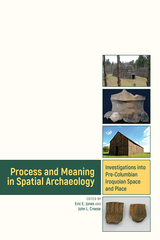 Process and Meaning in Spatial Archaeology: Investigations into Pre-Columbian Iroquoian Space and Place
Eric Jones
University Press of Colorado, 2017 Process and Meaning in Spatial Archaeology examines Northern Iroquoian archaeology through various lenses at multiple spatial levels, including individual households, village constructions, relationships between villages in a local region, and relationships between various Iroquoian nations and their territorial homelands. The volume includes scholars and scholarship from both sides of the US-Canadian border, presenting a contextualized analysis of settlement and landscape for a broad range of past Northern Iroquoian societies.
The research in this volume represents a new wave of spatial research—exploring beyond settlement patterning to the process and the meaning behind spatial arrangement of past communities and people—and describes new approaches being used for better understanding of past Northern Iroquoian societies. Addressing topics ranging from household task-scapes and gender relations to bioarchaeology and social network analysis, Process and Meaning in Spatial Archaeology demonstrates the vitality of current archaeological research into ancestral Northern Iroquoian societies and its growing contribution to wider debates in North American archaeology.
This cutting-edge research will be of interest to archaeologists globally, as well as academics and graduate students studying Northern Iroquoian societies and cultures, geography, and spatial analysis.
Contributors: Kathleen M. S. Allen, Jennifer A. Birch, William Engelbrecht, Crystal Forrest, John P. Hart, Sandra Katz, Robert H. Pihl, Aleksandra Pradzynski, Erin C. Rodriguez, Dean R. Snow, Ronald F. Williamson, Rob Wojtowicz
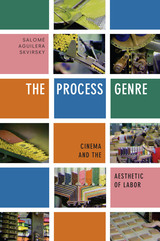 The Process Genre: Cinema and the Aesthetic of Labor
Salomé Aguilera Skvirsky
Duke University Press, 2020 From IKEA assembly guides and “hands and pans” cooking videos on social media to Mister Rogers's classic factory tours, representations of the step-by-step fabrication of objects and food are ubiquitous in popular media. In The Process Genre Salomé Aguilera Skvirsky introduces and theorizes the process genre—a heretofore unacknowledged and untheorized transmedial genre characterized by its representation of chronologically ordered steps in which some form of labor results in a finished product. Originating in the fifteenth century with machine drawings, and now including everything from cookbooks to instructional videos and art cinema, the process genre achieves its most powerful affective and ideological results in film. By visualizing technique and absorbing viewers into the actions of social actors and machines, industrial, educational, ethnographic, and other process films stake out diverse ideological positions on the meaning of labor and on a society's level of technological development. In systematically theorizing a genre familiar to anyone with access to a screen, Skvirsky opens up new possibilities for film theory.
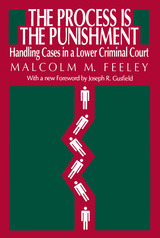 The Process is the Punishment: Handling Cases in a Lower Criminal Court
Malcolm M. Feeley
Russell Sage Foundation, 1992 It is conventional wisdom that there is a grave crisis in our criminal courts: the widespread reliance on plea-bargaining and the settlement of most cases with just a few seconds before the judge endanger the rights of defendants. Not so, says Malcolm Feeley in this provocative and original book. Basing his argument on intensive study of the lower criminal court system, Feeley demonstrates that the absence of formal "due process" is preferred by all of the court's participants, and especially by defendants. Moreover, he argues, "it is not all clear that as a group defendants would be better off in a more 'formal' court system," since the real costs to those accused of misdemeanors and lesser felonies are not the fines and prison sentences meted out by the court, but the costs incurred before the case even comes before the judge—lost wages from missed work, commissions to bail bondsmen, attorney's fees, and wasted time. Therefore, the overriding interest of the accused is not to secure the formal trappings of the judicial process, but to minimize the time, and money, spent dealing with the court. Focusing on New Haven, Connecticut's, lower court, Feeley found that the defense and prosecution often agreed that the pre-trial process was sufficient to "teach the defendant a lesson." In effect, Feeley demonstrates that the informal practices of the lower courts as they are presently constituted are more "just" than they are usually given credit for being. "... a book that should be read by anyone who is interested in understanding how courts work and how the criminal sanction is administered in modern, complex societies."— Barry Mahoney, Institute for Court Management, Denver "It is grounded in a firm grasp of theory as well as thorough field research."—Jack B. Weinstein, U.S. District Court Judge." a feature that has long been the hallmark of good American sociology: it recreates a believable world of real men and women."—Paul Wiles, Law & Society Review. "This book's findings are well worth the attention of the serious criminal justice student, and the analyses reveal a thoughtful, probing, and provocative intelligence....an important contribution to the debate on the role and limits of discretion in American criminal justice. It deserves to be read by all those who are interested in the outcome of the debate." —Jerome H. Skolnick, American Bar Foundation Research Journal
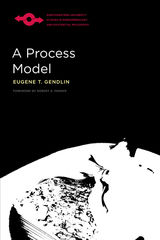 A Process Model
Eugene T. Gendlin; Foreword by Robert A. Parker
Northwestern University Press, 2018 Eugene T. Gendlin (1926–2017) is increasingly recognized as one of the seminal thinkers of our era. Carrying forward the projects of American pragmatism and continental philosophy, Gendlin created an original form of philosophical psychology that brings new understandings of human experience and the life-world, including the “hard problem of consciousness.”
A Process Model, Gendlin’s magnum opus, offers no less than a new alternative to the dualism of mind and body. Beginning with living process, the body’s simultaneous interaction and identity with its environment, Gendlin systematically derives nonreductive concepts that offer novel and rigorous ways to think from within lived precision. In this way terms such as body, environment, time, space, behavior, language, culture, situation, and more can be understood with both great force and great subtlety.
Gendlin’s project is relevant to discussions not only in philosophy but in other fields in which life process is central—including biology, environmental management, environmental humanities, and ecopsychology. It provides a genuinely new philosophical approach to complex societal challenges and environmental issues.
The Process of Education: Revised Edition
Jerome Bruner
Harvard University Press, 1960 In this classic argument for curriculum reform in early education, Jerome Bruner shows that the basic concepts of science and the humanities can be grasped intuitively at a very early age. He argues persuasively that curricula should he designed to foster such early intuitions and then build on them in increasingly formal and abstract ways as education progresses.
Bruner’s foundational case for the spiral curriculum has influenced a generation of educators and will continue to be a source of insight into the goals and methods of the educational process.
 The Process of Neurologic Care in Medical Practice
Thomas H. Glick
Harvard University Press, 1984 Most neurology is done by general physicians rather than by neurologists. Still, neurology is perceived by doctors to be one of the most troublesome and difficult medical specialties. Neurologic symptoms are often vague and uncertain, and seemingly insignificant symptoms can reflect frightening disorders.
Thomas Glick, a superb teacher as well as an experienced clinician, has written this book in the belief that errors in handling neurologic cases stem not so much from a failure to command a daunting body of knowledge as from inadequate clinical reasoning. Dr. Glick shows how the skills of the primary-care physician can be applied to the special problems of neurologic history-taking and physical examination. He emphasizes time-saving ways to focus the exam and avoid diagnostic error. The book describes clear procedures for cases that the generalist can handle comfortably and offers guidelines on when (and how) to seek the advice of the consultant neurologist. Case histories, scattered liberally throughout the text, highlight the discussions and give the reader a rich sampling of specific methods of problem solving.
Clinicians who feel skeptical about the effectiveness of neurologic therapy or frustrated by its application will find here a commonsense approach to therapeutic planning. Chapters on ambulatory and chronic neurologic care also convey a positive sense of the broader therapeutic possibilities that exist in neurologic practice. Neurologic residents, senior medical students, psychiatrists, and allied health professionals, as well as primary caregivers, will benefit from the insights contained in this sensitive and articulate book.
Process Philosophy: A Survey of Basic Issues
Nicholas Rescher
University of Pittsburgh Press, 2000
Process Philosophy surveys the basic issues and controversies surrounding the philosophical approach known as “process philosophy.” Process philosophy views temporality, activity, and change as the cardinal factors for our understanding of the real—process has priority over product, both ontologically and epistemically. Rescher examines the movement’s historical origins, reflecting a major line of thought in the work of such philosophers as Heracleitus, Leibniz, Bergson, Peirce, William James, and especially A. N. Whitehead.
Process Technology for Silicon Carbide Devices
Carl-Mikael Zetterling
The Institution of Engineering and Technology, 2002 Silicon carbide (SiC) is a wide bandgap semiconductor whose properties make it suitable for devices and integrated circuits operating at high voltage, high frequency and high temperature. This second book in the Processing series explains why SiC is so useful in electronics and gives clear guidance on the various processing steps. Growth, doping, etching, contact formation and dielectrics are all described in detail. The final chapter explains how to integrate the processing steps, and shows typical device cross-sections for over 20 different devices. Engineers who are developing systems for the fabrication of SiC devices are in need of guidance from experts in academia and the industry who have been pioneering the field: the book is designed as an advanced tutorial and reference for this purpose. A glossary of terms used in SiC technology is included.
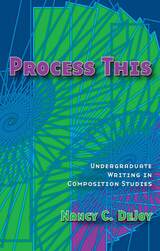 Process This: Undergraduate Writing in Composition Studies
Nancy C. DeJoy
Utah State University Press, 2004 In Process This, Nancy DeJoy argues that even recent revisions to composition studies, cultural studies, service learning, and social process movements--continue to repress the subjects and methodologies that should be central, especially at the level of classroom practice. Designed to move student discourses beyond the classroom, these approaches nonetheless continue to position composition students (and teachers) as mere consumers of the discipline. This means that the subjects, methodologies, and theory/practice relationships that define the field are often absent in composition classrooms. Arguing that the world inside and outside of the academy cannot be any different if the profession stays the same, DeJoy creates a pedagogy and a plan for faculty development that revisions the prewrite/write/rewrite triad to open spaces for participation and contribution to all members of first-year writing classrooms.
Processed Foods and the Consumer: Additives, Labeling, Standards, and Nutrition
Vernal S. Packard Jr.
University of Minnesota Press, 1976 Processed Foods and the Consumer was first published in 1976. Minnesota Archive Editions uses digital technology to make long-unavailable books once again accessible, and are published unaltered from the original University of Minnesota Press editions. In this comprehensive guide, Professor Packard discusses problems and answers questions of paramount importance to the consumer concerning processed foods that are sold in the marketplace. The book is an excellent text for course use in classes in food science or technology, nutrition, dietetics, institutional food management, and related courses. It is also a valuable reference work for those in food industries and regulatory and health agencies, and for the concerned public.
Processing and Manufacturing of Electrodes for Lithium-Ion Batteries
Jianlin Li
The Institution of Engineering and Technology, 2023 Lithium-ion batteries (LIBs) are key to storing clean energy. However, process design, including electrode processing, is critical for performance. There are many reviews addressing material development for LIBs, but comparatively few on correlating the material properties with processing design and constraints. While these technologies are becoming familiar in industry, they are not yet widely accessible to the research community.
Processing Compound Verbs in Persian: A psycholinguistic approach to complex predicates
Pouneh Shabani-Jadidi
Amsterdam University Press, 2014 Processing Compound Verbs in Persian is the first monograph investigating how Persian compound verbs are processed in the mental lexicon, through which it can be inferred how they are stored, organized, and accessed. The study examines Persian compound verbs in light of psycholinguistic theories on poly-morphemic word processing as well as linguistic theories of complex predicates.
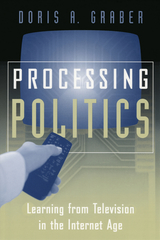 Processing Politics: Learning from Television in the Internet Age
Doris A. Graber
University of Chicago Press, 2001 How often do we hear that Americans are so ignorant about politics that their civic competence is impaired, and that the media are to blame because they do a dismal job of informing the public? Processing Politics shows that average Americans are far smarter than the critics believe. Integrating a broad range of current research on how people learn (from political science, social psychology, communication, physiology, and artificial intelligence), Doris Graber shows that televised presentations—at their best—actually excel at transmitting information and facilitating learning. She critiques current political offerings in terms of their compatibility with our learning capacities and interests, and she considers the obstacles, both economic and political, that affect the content we receive on the air, on cable, or on the Internet.
More and more people rely on information from television and the Internet to make important decisions. Processing Politics offers a sound, well-researched defense of these remarkably versatile media, and challenges us to make them work for us in our democracy.
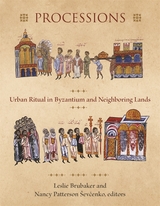 Processions: Urban Ritual in Byzantium and Neighboring Lands
Leslie Brubaker and Nancy Patterson Ševčenko
Harvard University Press Processions of all kinds—military, civic, religious, and more—were hallmarks of the ancient and medieval world. Yet urban processions in Byzantine culture have never been thoroughly studied, even though there were as many as two processions a week in Constantinople alone, often featuring eminent individuals like the emperor and the patriarch, but also less prominent people, like the teams who decorated the streets. In an introduction and ten chapters, Processions: Urban Ritual in Byzantium and Neighboring Lands examines a millennium of medieval processions through analysis of texts, artifacts, and images.
Byzantium did not, of course, exist in a vacuum. Byzantine processions are here set alongside those occurring at the borders of the Byzantine world: the Latin West, the Islamic East, and, of course, Jerusalem, the center of the Mediterranean’s sacred world. This comparative approach lets us better see how the Byzantines operated in a complex global network defined by local contexts, how the Byzantines positioned themselves within this network, and the nature of the Byzantine legacy to their Islamic, Catholic, and Orthodox inheritors.
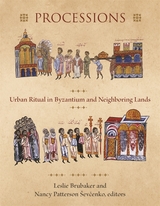 Processions: Urban Ritual in Byzantium and Neighboring Lands
Leslie Brubaker and Nancy Patterson Ševčenko
Harvard University Press Processions of all kinds—military, civic, religious, and more—were hallmarks of the ancient and medieval world. Yet urban processions in Byzantine culture have never been thoroughly studied, even though there were as many as two processions a week in Constantinople alone, often featuring eminent individuals like the emperor and the patriarch, but also less prominent people, like the teams who decorated the streets. In an introduction and ten chapters, Processions: Urban Ritual in Byzantium and Neighboring Lands examines a millennium of medieval processions through analysis of texts, artifacts, and images.
Byzantium did not, of course, exist in a vacuum. Byzantine processions are here set alongside those occurring at the borders of the Byzantine world: the Latin West, the Islamic East, and, of course, Jerusalem, the center of the Mediterranean’s sacred world. This comparative approach lets us better see how the Byzantines operated in a complex global network defined by local contexts, how the Byzantines positioned themselves within this network, and the nature of the Byzantine legacy to their Islamic, Catholic, and Orthodox inheritors.
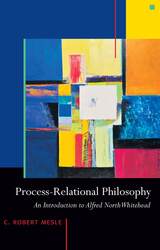 Process-Relational Philosophy: An Introduction to Alfred North Whitehead
C. Robert Mesle
Templeton Press, 2008 Process thought is the foundation for studies in many areas of contemporary philosophy, theology, political theory, educational theory, and the religion-science dialogue. It is derived from Alfred North Whitehead's philosophy, known as process theology, which lays a groundwork for integrating evolutionary biology, physics, philosophy of mind, theology, environmental ethics, religious pluralism, education, economics, and more. In Process-Relational Philosophy, C. Robert Mesle breaks down Whitehead's complex writings, providing a simple but accurate introduction to the vision that underlies much of contemporary process philosophy and theology. In doing so, he points to a "way beyond both reductive materialism and the traps of Cartesian dualism by showing reality as a relational process in which minds arise from bodies, in which freedom and creativity are foundational to process, in which the relational power of persuasion is more basic than the unilateral power of coercion." Because process-relational philosophy addresses the deep intuitions of a relational world basic to environmental and global thinking, it is being incorporated into undergraduate and graduate courses in philosophy, educational theory and practice, environmental ethics, and science and values, among others. Process-Relational Philosophy: A Basic Introduction makes Whitehead's creative vision accessible to all students and general readers.
Process-Tracing Methods: Foundations and Guidelines
Derek Beach and Rasmus Brun Pedersen
University of Michigan Press, 2013 Process-tracing in social science is a method for studying causal mechanisms linking causes with outcomes. This enables the researcher to make strong inferences about how a cause (or set of causes) contributes to producing an outcome. Derek Beach and Rasmus Brun Pedersen introduce a refined definition of process-tracing, differentiating it into three distinct variants and explaining the applications and limitations of each. The authors develop the underlying logic of process-tracing, including how one should understand causal mechanisms and how Bayesian logic enables strong within-case inferences. They provide instructions for identifying the variant of process-tracing most appropriate for the research question at hand and a set of guidelines for each stage of the research process.
Process-Tracing Methods: Foundations and Guidelines
Derek Beach and Rasmus Brun Pedersen
University of Michigan Press, 2019 Process-tracing in social science is a method for studying causal mechanisms linking causes with outcomes. This enables the researcher to make strong inferences about how a cause (or set of causes) contributes to producing an outcome. In this extensively revised and updated edition, Derek Beach and Rasmus Brun Pedersen introduce a refined definition of process-tracing, differentiating it into four distinct variants and explaining the applications and limitations of each. The authors develop the underlying logic of process-tracing, including how one should understand causal mechanisms and how Bayesian logic enables strong within-case inferences. They provide instructions for identifying the variant of process-tracing most appropriate for the research question at hand and a set of guidelines for each stage of the research process.
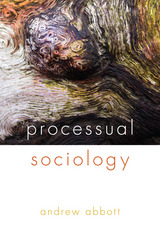 Processual Sociology
Andrew Abbott
University of Chicago Press, 2016 For the past twenty years, noted sociologist Andrew Abbott has been developing what he calls a processual ontology for social life. In this view, the social world is constantly changing—making, remaking, and unmaking itself, instant by instant. He argues that even the units of the social world—both individuals and entities—must be explained by these series of events rather than as enduring objects, fixed in time. This radical concept, which lies at the heart of the Chicago School of Sociology, provides a means for the disciplines of history and sociology to interact with and reflect on each other.
In Processual Sociology, Abbott first examines the endurance of individuals and social groups through time and then goes on to consider the question of what this means for human nature. He looks at different approaches to the passing of social time and determination, all while examining the goal of social existence, weighing the concepts of individual outcome and social order. Abbott concludes by discussing core difficulties of the practice of social science as a moral activity, arguing that it is inescapably moral and therefore we must develop normative theories more sophisticated than our current naively political normativism. Ranging broadly across disciplines and methodologies, Processual Sociology breaks new ground in its search for conceptual foundations of a rigorously processual account of social life.
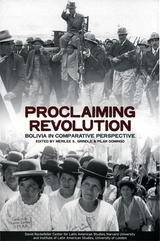 Proclaiming Revolution: Bolivia in Comparative Perspective
Merilee S. Grindle
Harvard University Press, 2003 In 1952 Bolivia was transformed by revolution. With the army destroyed from only a few days of fighting, workers and peasants took up arms to claim the country as their own. Overnight, the electorate expanded five-fold. Industries were turned over to worker organizations to manage, and land was distributed to peasant communities. Education became universal and free for the first time in the country's history.
This volume, the result of a conference organized by the David Rockefeller Center for Latin American Studies of Harvard University and the Institute for Latin American Studies at the University of London, presents new interpretations of the causes of the events of 1952 and compares them to the great social transformations that occurred in France, Mexico, Russia, China, and Cuba. It also considers the consequences of the revolution by examining the political, social, and economic development of the country, as well as adding important insights to the analysis of revolution and the understanding of this fascinating Andean country.
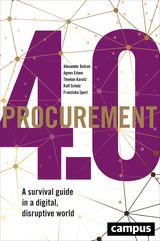 Procurement 4.0: A Survival Guide in a Digital, Disruptive World
Alexander Batran, Agnes Erben, Ralf Schulz, and Franziska Sperl
Campus Verlag, 2017 Although digitalization or smart manufacturing might be considered a driving factor behind Procurement 4.0—the latest conceptualization of how modern companies procure goods and services—it is far too shortsighted to view Procurement 4.0 as simply a digitalized function. In Procurement 4.0, four leading experts on this revolutionary concept offer the first comprehensive framework to identify the interrelated opportunities and challenges it provides.
As the authors show, dynamic, interconnected value chains are key factors of sustainable business success, with procurement managed and steered by strategic purchasers in their new role as value chain managers. This evolving environment will be influenced by a variety of digitalization forces, including Industry 4.0, the Internet of Things, smart data and clouds, Enterprise 2.0, social media, and mobile computing. Integrating all network levels of procurement—from intra-company and inter-company relationships to global connectivity along value chains—and drawing on interviews with corporate heads of BMW, Lufthansa, Maersk, BP, and Allianz, the authors explore four dimensions of procurement that will address the business needs of the future: competing value chains, co-creation, leadership, and digital transformation.
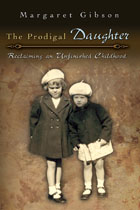 The Prodigal Daughter: Reclaiming an Unfinished Childhood
Margaret Gibson
University of Missouri Press, 2008 The 1950s and 1960s were years of shifting values and social changes that did not sit well with many citizens of Richmond, Virginia, and in particular with one conservative family, a staunchly southern mother and father and their two daughters. A powerful evocation of time and place, this memoir—a gifted poet's first book of prose—is the story of an inquisitive and sensitive young woman's coming of age and a deeply moving recounting of her reconciliation later in life with the family she left behind. Returning us to a Cold War world marked by divisions of race, gender, wealth, and class, The Prodigal Daughter is an exploration of difference, the powerful wedge that separates individuals within a social milieu and within a family. Echoing the biblical Prodigal Son, Margaret Gibson's memoir is less concerned with the years of excess away from home than with the seeds of division sown in this family's early years. Hers is the story of a mother proud to be a Lady, a Southerner, and a Christian; of two daughters trapped by their mother's power; and of their father's breakdown under social and family expectations. Slow to rebel, young Margaret finally flees the world of manners and custom—which she deems poor substitutes for right thought and right action in the face of the Civil Rights movement and the Vietnam War—and abandons her fundamentalist upbringing. In a defiant gesture that proves prophetic, she once signed a postcard home "The Prodigal." After years of being the distant, absent daughter, she finds herself returning home to meet the needs of her stroke-crippled younger sister and her incapacitated parents. In this tale of homecoming and forgiveness, death and dying, Gibson recounts how she overcame her long indifference to a sister she had thought different from herself, recognizing the strengths of the bonds that both hold us and set us free. Interweaving astute social observations on social pressures, race relations, sibling rivalry, adolescent angst, and more, The Prodigal Daughter is a startlingly honest portrayal of one family in one southern city and the story of all too many families across America.
Prodigal Son
Edward Villella
University of Pittsburgh Press, 1998 A leading advocate for the arts in America and recent recipient of the 1997 National Medal of the Arts, the 1997 Kennedy Center Honors, and the George Abbott Carbonell Award for Achievement, Edward Villella was recently inducted into the State of Florida Artist Hall of Fame. Villella also received the Frances Holleman Breathitt Award for Excellence for his contributions to the arts and to education, the thirty-eighth annual Capezio Dance Award, and Award for Lifetime Achievement, becoming only the fourth dance personality to receive National Endowment for the Arts advisory artistic director of the Miami City Ballet, which has won worldwide acclaim under his direction.
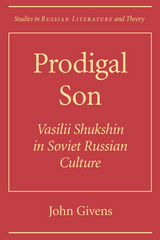 Prodigal Son: Vasilii Shuksin in Soviet Russian Culture
John Givens
Northwestern University Press, 2000 A wildly prolific director, actor, and writer, Vasilii Shukshin (1929-74) reached more Soviets in more media than perhaps any other artist in the post-Stalinist USSR. This first English-language study of Shukshin and his work is thus a portrait of the culture of Soviet Russia after Stalin. John Givens begins with Shukshin's position between cultural realms and social strata: his abandoned peasant heritage in Siberia as the son of a purged kulak on the one hand and his life as a successful artist in Moscow on the other. Givens shows how this clash of cultures and identities was both a burden and the driving force of Shukshin's art-and how it represents a central dichotomy between rural and urban culture in Soviet Russia.This work provides new terms for rereading the culture of Shukshin's time- terms that take up notions of demographic displacement, class difference, and blurred boundaries among genres, audiences, and arts.
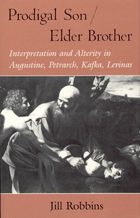 Prodigal Son/Elder Brother: Interpretation and Alterity in Augustine, Petrarch, Kafka, Levinas
Jill Robbins
University of Chicago Press, 1991 "I don't know of any other book that deals with the hermeneutical problem of the relationship between Christianity and Judaism in the way this one does. Full of cunning and unpredictable turns, Prodigal Son/Elder Brother addresses the question of the elder brother's fate by opposing two sets of readings, Christian and Jewish, ancient and modern, figural and midrashic. No one, after reading this book, will any longer connect Judaism and Christianity with a hyphen."—Gerald L. Burns, University of Notre Dame
"Through a creative reading of the prodigal son parable, Jill Robbins demonstrates the hermeneutical impasse of the Christian exegete who must and yet cannot incorporate the Old Testament. Having disclosed the aporia at the heart of Christian hermeneutics, she proposes an alternative approach to the Hebrew Bible and new interpretations of Augustine, Petrarch, Kafka, and Levinas. Robbins brilliantly integrates the discourses of biblical texts, literary works, and critical analysis."—Mark C. Taylor, Williams College
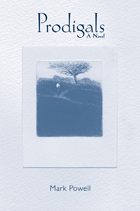 Prodigals: A Novel
Mark Powell
University of Tennessee Press, 2012 “A haunting, evocative novel. In Prodigals, Mark Powell depicts a lost American landscape—the small towns and logging camps of the South during World War II, with their subculture of fugitives and transients. I can't get the desperate hero out of my mind.” —Cary Holladay, author of Mercury
In the late summer of 1944, fifteen-year-old Ernest Cobb flees into the dense forests of the Blue Ridge Mountains. Behind him, in his South Carolina hometown, the girl he thought he had impregnated is being buried. Her shooting death was not Ernest’s doing, but Ernest fears that he will be implicated in it anyway. With little sense of where he is going or how he might survive, the boy makes his way northward.
Ernest’s journey brings him into the company of outsiders and drifters—an often violent subculture at the tattered fringes of wartime America. An aging mountain hermit, who was once a glassblower, rescues Ernest from the wilderness and nurtures him for a while. Eventually, Ernest finds himself in Asheville, North Carolina, where he goes to work as a dishwasher and rents a dingy room that he soon shares with a new girlfriend. When that relationship falters, Ernest accompanies an amiable but reckless friend, a boy called June Bug, to work at a logging camp. There they meet Jimmy Morgan, a wounded war veteran with his own dark secret. The convergence of these lost souls and their chance discovery of an injured child lead to further tragedy. By the end, the once-naive Ernest has begun to comprehend the gaping loneliness that defines much of human existence, but he has also come to sense the possibility of transcendence in the fleeting connections born of love.
With Prodigals, Mark Powell makes an impressive fiction debut. The author’s keen ear for dialogue, his understanding of character and motive, and his lean, taut language will make this novel linger long in the minds of readers.
The Author: Mark Powell lives in Mountain Rest, South Carolina. He studied creative writing at the University of South Carolina.
 A Prodigy's Calling: The Early Musical Biography of Cosmas Magaya, Zimbabwean Mbira Master
Paul F. Berliner
University of Chicago Press, 2024 The coming-of-age story of a master musician in mid-twentieth century colonial Rhodesia as he learns his community’s most cherished art, all while navigating profound social transformation.
Ethnomusicologist Paul F. Berliner has been studying Zimbabwean mbira for more than fifty years. When he first arrived in what was then Rhodesia after the nation declared independence from the United Kingdom, he met Cosmas Magaya, a mbira player who would become his teacher and lifelong collaborator. A Prodigy’s Calling chronicles the early years of Magaya’s life, documenting the master mbira player’s journey from child prodigy to established expert. As a child, Magaya was immersed in mbira music through his father’s work as a healer and spirit medium. As Magaya grew, so too did his world; his performances extended beyond the family compound as his skill and knowledge increased, bringing him into contact with a society fraught with decolonial conflict.
Following Magaya’s childhood, readers will learn how his upbringing guided his journey through the community’s social networks and how his early sensibilities, proclivities, and talents shaped his development. At the same time, his deepening engagement with music and the ancestors was affected by overlapping tensions between Shona cosmology and Christian ideology, rural and urban lifestyles, and the escalating African nationalist struggle and the white supremacist state. While Magaya’s story reflects profound social changes in the nation, it is also a story of musical apprenticeship. Readers following Magaya’s discovery of ever finer details in the music’s richly layered patterns will enhance their ability to hear mbira music’s forms, variations, and sonic qualities. Linocut illustrations by South African artist Lucas Bambo bring the narrative to life, and Berliner’s spirited storytelling is accompanied by QR codes that take readers directly to recordings of music as Magaya learns it. Appendices for musicians interested in learning or improving their mbira playing complement the story of Magaya’s early life. Inviting the reader into the very tradition it recounts, the book offers intimate insights into the relationships among music, Shona cosmology, and colonial politics in everyday life.
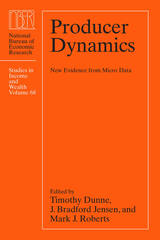 Producer Dynamics: New Evidence from Micro Data
Edited by Timothy Dunne, J. Bradford Jensen, and Mark J. Roberts
University of Chicago Press, 2009 The Census Bureau has recently begun releasing official statistics that measure the movements of firms in and out of business and workers in and out of jobs. The economic analyses in Producer Dynamics exploit this newly available data on establishments, firms, and workers, to address issues in industrial organization, labor, growth, macroeconomics, and international trade.
This innovative volume brings together a group of renowned economists to probe topics such as firm dynamics across countries; patterns of employment dynamics; firm dynamics in nonmanufacturing industries such as retail, health services, and agriculture; employer-employee turnover from matched worker/firm data sets; and turnover in international markets. Producer Dynamics will serve as an invaluable reference to economists and policy makers seeking to understand the links between firms and workers, and the sources of economic dynamics, in the age of globalization.
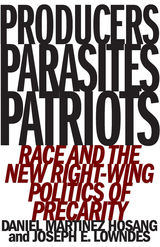 Producers, Parasites, Patriots: Race and the New Right-Wing Politics of Precarity
Daniel Martinez HoSang
University of Minnesota Press, 2019 The shifting meaning of race and class in the age of Trump
The profound concentration of economic power in the United States in recent decades has produced surprising new forms of racialization. In Producers, Parasites, Patriots, Daniel Martinez HoSang and Joseph E. Lowndes show that while racial subordination is an enduring feature of U.S. political history, it continually changes in response to shifting economic and political conditions, interests, and structures. The authors document the changing politics of race and class in the age of Trump across a broad range of phenomena, showing how new forms of racialization work to alter the economic protections of whiteness while promoting some conservatives of color as models of the neoliberal regime. Through careful analyses of diverse political sites and conflicts—racially charged elections, attacks on public-sector unions, new forms of white precarity, the rise of black and brown political elites, militia uprisings, multiculturalism on the far right—they highlight new, interwoven deployments of race in the ascendant age of inequality. Using the concept of “racial transposition,” the authors demonstrate how racial meanings and signification can be transferred from one group to another to shore up both neoliberalism and racial hierarchy. From the militia movement to the Alt-Right to the mainstream Republican Party, Producers, Parasites, Patriots brings to light the changing role of race in right-wing politics.
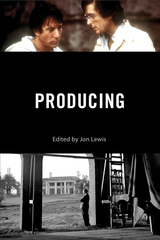 Producing
Lewis, Jon
Rutgers University Press, 2015 Of all the job titles listed in the opening and closing screen credits, producer is certainly the most amorphous. There are businessmen (and women)-producers, writer-director- and movie-star-producers; producers who work for the studio; executive producers whose reputation and industry clout alone gets a project financed (though their day-to-day participation in the project may be negligible). The job title, regardless of the actual work involved, warrants a great deal of prestige in the film business; it is the credited producers, after all, who collect the Oscar for Best Picture. But what producers do and what they don’t or won’t do varies from project to project. Producing is the first book to provide a comprehensive overview of the roles that producers have played in Hollywood, from the dawn of the twentieth century to the present day. It introduces readers to the colorful figures who helped to define and reimagine the producer’s role, including inventors like Thomas Edison, moguls like Darryl F. Zanuck, entrepreneurs like Walt Disney, and mavericks like Roger Corman. Readers also get an inside look at the less glamorous jobs producers have often performed: shepherding projects through many years of development, securing financial backers, and supervising movie shoots. The latest book in the acclaimed Behind the Silver Screen series, Producing includes essays written by seven film scholars, each an expert in a different period of cinema history. Together, they give readers a full picture of how the art and business of producing films has changed over time—and how the producer’s myriad job duties continue to evolve in the digital era.
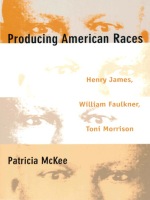 Producing American Races: Henry James, William Faulkner, Toni Morrison
Patricia McKee
Duke University Press, 1999 In Producing American Races Patricia McKee examines three authors who have powerfully influenced the formation of racial identities in the United States: Henry James, William Faulkner, and Toni Morrison. Using their work to argue that race becomes visible only through image production and exchange, McKee illuminates the significance that representational practice has had in the process of racial construction.
McKee provides close readings of six novels—James’s The Wings of the Dove and The Golden Bowl, Faulkner’s The Sound and the Fury and Light in August, and Morrison’s Sula and Jazz—interspersed with excursions into Lacanian and Freudian theory, critical race theory, epistemology, and theories of visuality. In James and Faulkner, she finds, race is represented visually through media that highlight ways of seeing and being seen. Written in the early twentieth century, the novels of James and Faulkner reveal how whiteness depended on visual culture even before film and television became its predominant media. In Morrison, the culture is aural and oral—and often about the absence of the visual. Because Morrison’s African American communities produce identity in nonvisual, even anti-visual terms, McKee argues, they refute not just white representations of black persons as objects but also visual orders of representation that have constructed whites as subjects and blacks as objects.
With a theoretical approach that both complements and transcends current scholarship about race—and especially whiteness—Producing American Races will engage scholars in American literature, critical race theory, African American studies, and cultural studies. It will also be of value to those interested in the novel as a political and aesthetic form.
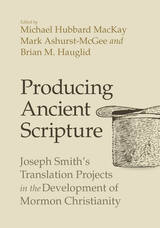 Producing Ancient Scripture: Joseph Smith's Translation Projects in the Development of Mormon Christianity
Edited by Michael Hubbard MacKay, Mark Ashurst-McGee, and Brian M. Hauglid
University of Utah Press, 2020 Joseph Smith, the founding prophet of the Church of Jesus Christ of Latter-day Saints and of the broader Latter-day Saint movement, produced several volumes of scripture between 1829, when he translated the Book of Mormon, and 1844, when he was murdered. The Book of Mormon, published in 1830, is well known. Less read and studied are the subsequent texts that Smith translated after the Book of Mormon, texts that he presented as the writings of ancient Old World and New World prophets. These works were published and received by early Latter-day Saints as prophetic scripture that included important revelations and commandments from God.
This collaborative volume is the first to study Joseph Smith’s translation projects in their entirety. In this carefully curated collection, experts contribute cutting-edge research and incisive analysis. The chapters explore Smith’s translation projects in focused detail and in broad contexts, as well as in comparison and conversation with one another. Authors approach Smith’s sacred texts historically, textually, linguistically, and literarily to offer a multidisciplinary view. Scrupulous examination of the production and content of Smith’s translations opens new avenues for understanding the foundations of Mormonism, provides insight on aspects of early American religious culture, and helps conceptualize the production and transmission of sacred texts.
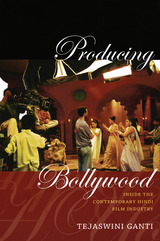 Producing Bollywood: Inside the Contemporary Hindi Film Industry
Tejaswini Ganti
Duke University Press, 2012 Producing Bollywood offers an unprecedented look inside the social and professional worlds of the Mumbai-based Hindi film industry and explains how it became "Bollywood," the global film phenomenon and potent symbol of India as a rising economic powerhouse. In this rich and entertaining ethnography Tejaswini Ganti examines the changes in Hindi film production from the 1990s until 2010, locating them in Hindi filmmakers' efforts to accrue symbolic capital, social respectability, and professional distinction, and to manage the commercial uncertainties of filmmaking. These efforts have been enabled by the neoliberal restructuring of the Indian state and economy since 1991. This restructuring has dramatically altered the country's media landscape, which quickly expanded to include satellite television and multiplex theaters. Ganti contends that the Hindi film industry's metamorphosis into Bollywood would not have been possible without the rise of neoliberal economic ideals in India. By describing dramatic transformations in the Hindi film industry's production culture, daily practices, and filmmaking ideologies during a decade of tremendous social and economic change in India, Ganti offers valuable new insights into the effects of neoliberalism on cultural production in a postcolonial setting.
 Producing Children: Critical Studies in Childhood Creativity
Peter C. Kunze
Rutgers University Press, 2025 Producing Children imagines the possibility, indeed the inevitability, of a creative relation between children as producers and consumers by revising the long-established, hierarchical relation between adults and children. The chapters in this collection reveal that studying child-produced culture complicates our received understandings of children’s culture as culture by adults, for children, about children. They also underscore “children’s literature” as a cultural phenomenon that moves across and beyond genres, forms, and media. As a whole, this collection reveals that attention to child-produced culture invites dialogue and collaboration across fields and disciplines invested in the critical understanding of children as embodied beings and childhood as both a stage of development and discursive construct with social, political, economic, and cultural dimensions and influence. With the ongoing vibrancy of childhood studies as a multidisciplinary area of inquiry, studies of child-produced culture provide scholars with an exciting opportunity to complicate, enrich, and expand theorization of childhood creativity, children’s culture, and even children themselves.
 Producing Children’s Television in the On-demand Age
Anna Potter
Intellect Books, 2020 Much like the rest of the traditional television industry, children’s programming is undergoing a revolution. In this book, Anna Potter provides a detailed insider account of the creative circumstances that are transforming contemporary children’s screen content and reshaping the surrounding digital media landscape. Drawing on extended interviews with leading screen industry figures, Potter explores television’s distribution revolution and reveals how creative practices, funding models, and production norms in children’s TV have adapted to fit the changing times.
Combining comprehensive case studies, scholarly research, and industry perspectives, Potter presents a rigorous study of success stories in the children’s screen production sector. The book explores effects on the industry from disruptions by streaming giants like Netflix, Amazon, and YouTube, and describes the challenges faced by public service broadcasters like the BBC in their efforts to stay relevant to adolescent culture in the UK. Interdisciplinary and informative, this volume is compulsory reading for anyone struggling to make sense of television’s distribution revolution and what it means for children and young people.
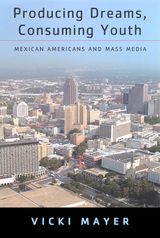 Producing Dreams, Consuming Youth: Mexican Americans and Mass Media
Mayer, Vicki
Rutgers University Press, 2003 Latinos are the fastest-growing ethnic group in America and the ascendance of their popular culture has become a huge phenomenon. But beyond J. Lo and Shakira, there is a deeper story to tell about culture, class, and community identities.
Producing Dreams, Consuming Youth takes us behind the scenes in San Antonio, Texas, a major market for Mexican American popular culture. Vicki Mayer brings readers the perspectives of those who produce and consume mass media—including music, television, and newspapers. Through the voices of people ranging from Spanish-language advertising agency executives to English-speaking working-class teenagers, we see how the media brings together communities of Mexican Americans as they pursue cultural dreams, identification, and empowerment. At the heart of the book is a debate about the future of Mexican American media, and thus of the youth market. How and why do media professionals imagine ethnic youths? How do young Mexican Americans accept, negotiate, and resist these images of themselves? Producing Dreams, Consuming Youth emphasizes the paradoxes of media industries that seek to include youths of color while profiting from their creative energies.
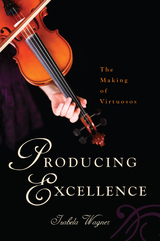 Producing Excellence: The Making of Virtuosos
Wagner, Izabela
Rutgers University Press, 2015 Driven by a passion for music, for excellence, and for fame, violin soloists are immersed from early childhood in high-pressure competitions, regular public appearances, and arduous daily practice. An in-depth study of nearly one hundred such children, Producing Excellence illuminates the process these young violinists undergo to become elite international soloists.
A musician and a parent of a young violinist, sociologist Izabela Wagner offers an inside look at how her young subjects set out on the long road to becoming a soloist. The remarkable research she conducted—at rehearsals, lessons, and in other educational settings—enabled her to gain deep insight into what distinguishes these talented prodigies and their training. She notes, for instance, the importance of a family culture steeped in the values of the musical world. Indeed, more than half of these students come from a family of professional musicians and were raised in an atmosphere marked by the importance of instrumental practice, the vitality of music as a vocation, and especially the veneration of famous artists. Wagner also highlights the highly structured, rigorous training system of identifying, nurturing, and rewarding talent, even as she underscores the social, economic, and cultural factors that make success in this system possible.
Offering an intimate portrait of the students, their parents, and their instructors, Producing Excellence sheds new light on the development of exceptional musical talent, as well as draw much larger conclusions as to “producing prodigy” in other competition-prone areas, such as sports, sciences, the professions, and other arts. Wagner’s insights make this book valuable for academics interested in the study of occupations, and her clear, lively writing is perfect for general readers curious about the ins and outs of training to be a violin soloist.
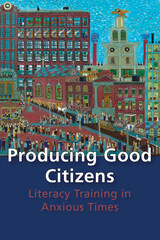 Producing Good Citizens: Literacy Training in Anxious Times
Amy J. Wan
University of Pittsburgh Press, 2014 Recent global security threats, economic instability, and political uncertainty have placed great scrutiny on the requirements for U.S. citizenship. The stipulation of literacy has long been one of these criteria. In Producing Good Citizens, Amy J. Wan examines the historic roots of this phenomenon, looking specifically to the period just before World War I, up until the Great Depression. During this time, the United States witnessed a similar anxiety over the influx of immigrants, economic uncertainty, and global political tensions.
Early on, educators bore the brunt of literacy training, while also being charged with producing the right kind of citizens by imparting civic responsibility and a moral code for the workplace and society. Literacy quickly became the credential to gain legal, economic, and cultural status. In her study, Wan defines three distinct pedagogical spaces for literacy training during the 1910s and 1920s: Americanization and citizenship programs sponsored by the federal government, union-sponsored programs, and first year university writing programs. Wan also demonstrates how each literacy program had its own motivation: the federal government desired productive citizens, unions needed educated members to fight for labor reform, and university educators looked to aid social mobility.
Citing numerous literacy theorists, Wan analyzes the correlation of reading and writing skills to larger currents within American society. She shows how early literacy training coincided with the demand for laborers during the rise of mass manufacturing, while also providing an avenue to economic opportunity for immigrants. This fostered a rhetorical link between citizenship, productivity, and patriotism. Wan supplements her analysis with an examination of citizen training books, labor newspapers, factory manuals, policy documents, public deliberations on citizenship and literacy, and other materials from the period to reveal the goal and rationale behind each program.
Wan relates the enduring bond of literacy and citizenship to current times, by demonstrating the use of literacy to mitigate economic inequality, and its lasting value to a productivity-based society. Today, as in the past, educators continue to serve as an integral part of the literacy training and citizen-making process.
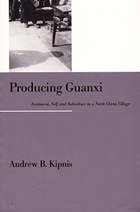 Producing Guanxi: Sentiment, Self, and Subculture in a North China Village
Andrew B. Kipnis
Duke University Press, 1997 Throughout China the formation of guanxi, or social connections, involves friends, families, colleagues, and acquaintances in complex networks of social support and sentimental attachment. Focusing on this process in one rural north China village, Fengjia, Andrew Kipnis shows what guanxi production reveals about the evolution of village political economy, kinship and gender, and local patterns of subjectivity in Dengist China. His work offers a detailed description of the communicative actions—such as gift giving, being a host or guest, participating in weddings or funerals—that produce, manage, and deny guanxi in a specific time and place. Kipnis also offers a rare comparative analysis of how these practices relate to the varied and variable phenomenon of guanxi throughout China and as it has changed over time.
Producing Guanxi combines the theory of Pierre Bourdieu and the insights of symbolic anthropology to contest past portrayals of guanxi as either a function of Chinese political economics or an unchanging Confucian social structure. In this analysis guanxi emerges as a purposeful human effort that makes use of past cultural logics while generating new ones. By exploring the role of sentiment in the creation of self, Kipnis critiques recent theories of subjectivity for their narrow focus on language and discourse, and contributes to the anthropological discussion of comparative selfhood. Navigating a path between mainstream social science and abstract social theory, Kipnis presents a more nuanced examination of guanxi than has previously been available and contributes generally to our understanding of relationships and human action.
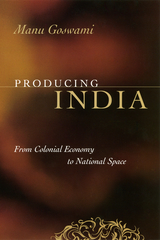 Producing India: From Colonial Economy to National Space
Manu Goswami
University of Chicago Press, 2004 When did categories such as a national space and economy acquire self-evident meaning and a global reach? Why do nationalist movements demand a territorial fix between a particular space, economy, culture, and people?
Producing India mounts a formidable challenge to the entrenched practice of methodological nationalism that has accorded an exaggerated privilege to the nation-state as a dominant unit of historical and political analysis. Manu Goswami locates the origins and contradictions of Indian nationalism in the convergence of the lived experience of colonial space, the expansive logic of capital, and interstate dynamics. Building on and critically extending subaltern and postcolonial perspectives, her study shows how nineteenth-century conceptions of India as a bounded national space and economy bequeathed an enduring tension between a universalistic political economy of nationhood and a nativist project that continues to haunt the present moment.
Elegantly conceived and judiciously argued, Producing India will be invaluable to students of history, political economy, geography, and Asian studies.
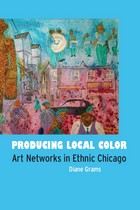 Producing Local Color: Art Networks in Ethnic Chicago
Diane Grams
University of Chicago Press, 2010 In big cities, major museums and elite galleries tend to dominate our idea of the art world. But beyond the cultural core ruled by these moneyed institutions and their patrons are vibrant, local communities of artists and art lovers operating beneath the high-culture radar. Producing Local Color is a guided tour of three such alternative worlds that thrive in the Chicago neighborhoods of Bronzeville, Pilsen, and Rogers Park.
These three neighborhoods are, respectively, historically African American, predominantly Mexican American, and proudly ethnically mixed. Drawing on her ethnographic research in each place, Diane Grams presents and analyzes the different kinds of networks of interest and support that sustain the making of art outside of the limelight. And she introduces us to the various individuals—from cutting-edge artists to collectors to municipal planners—who work together to develop their communities, honor their history, and enrich the experiences of their neighbors through art. Along with its novel insights into these little examined art worlds, Producing Local Color also provides a thought-provoking account of how urban neighborhoods change and grow.
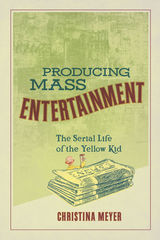 Producing Mass Entertainment: The Serial Life of the Yellow Kid
Christina Meyer
Ohio State University Press, 2019 Emerging mass culture in nineteenth-century America was in no small way influenced by the Yellow Kid, one of the first popular, serial comic figures circulating Sunday supplements. Though comics existed before, it was through the growing popularity of full-color illustrations printed in such city papers as Inter Ocean (Chicago) and the World (New York) and the implementation of regular, weekly publications of the extra sections that comics became a mass-produced, mass-distributed staple of American consumerism. It was against this backdrop that one of the first popular, serial comic figures was born: the Yellow Kid.
Producing Mass Entertainment: The Serial Life of the Yellow Kid offers a new take on the emergence of the Yellow Kid comic figure, looking closely at the mass appeal and proliferation of the Yellow Kid across different media. Christina Meyer identifies the aesthetic principles of newspaper comics and examines the social agents—advertising agencies, toy manufacturers, actors, retailers, and more—responsible for the Yellow Kid’s successful career. In unraveling the history of comic characters in capitalist consumer culture, Meyer offers new insights into the creation and dissemination of cultural products, reflecting on modern artistic and merchandising phenomena.
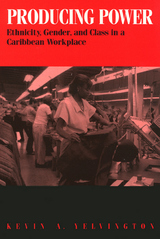 Producing Power: Ethnicity, Gender, and Class in a Caribbean Workplace
Kevin A. Yelvington
Temple University Press, 1995 In a small, locally owned Trinidadian factory that produces household goods, 80 percent of the line workers are women, almost all black or East Indian. The supervisors are all men, either white or East Indian. Kevin Yelvington worked for a year in this factory to study how ethnicity and gender are integral elements of the class structure, a social and economic structure that permeates all relations between men and women in the factory. These primary divisions determine the way the production process is ordered and labor divided. Unlike women in other industries in "underdeveloped" parts of the world who are recruited by foreign firms, Caribbean women have always contributed to the local economy. Within this historical context, Yelvington outlines the development of the state, and addresses exploitation and domination in the labor process. Yelvington also documents the sexually charged interactions between workers and managers and explores how both use flirting and innuendo to their advantage. Weddings and other social events outside the factory provide insightful details about how the creation of social identities carries over to all aspects of the local culture.
 Producing Sovereignty: The Rise of Indigenous Media in Canada
Karrmen Crey
University of Minnesota Press, 2024 Exploring how Indigenous media has flourished across Canada from the 1990s to the present
In the early 1990s, Indigenous media experienced a boom across Canada, resulting in a vast landscape of film, TV, and digital media. Coinciding with a resurgence of Indigenous political activism, Indigenous media highlighted issues around sovereignty and Indigenous rights to broader audiences in Canada. In Producing Sovereignty, Karrmen Crey considers the conditions—social movements, state policy, and evolutions in technology—that enabled this proliferation. Exploring the wide field of media culture institutions, Crey pays particular attention to those that Indigenous media makers engaged during this cultural moment, including state film agencies, arts organizations, provincial broadcasters, and more. Producing Sovereignty ranges from the formation of the Aboriginal Film and Video Art Alliance in the early 1990s and its partnership with the Banff Centre for the Arts to the Canadian Broadcasting Corporation’s 2016 production of Highway of Tears—an immersive 360-degree short film directed by Anishinaabe filmmaker Lisa Jackson—highlighting works by Indigenous creators along the way and situating Indigenous media within contexts that pay close attention to the role of media-producing institutions. Importantly, Crey focuses on institutions with limited scholarly attention, shifting beyond the work of the National Film Board of Canada to explore lesser-known institutions such as educational broadcasters and independent production companies that create programming for the Aboriginal Peoples Television Network. Through its refusal to treat Indigenous media simply as a set of cultural aesthetics, Producing Sovereignty offers a revealing media history of this cultural moment.
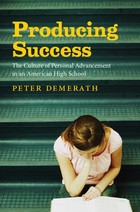 Producing Success: The Culture of Personal Advancement in an American High School
Peter Demerath
University of Chicago Press, 2009 Middle- and upper-middle-class students continue to outpace those from less privileged backgrounds. Most attempts to redress this inequality focus on the issue of access to financial resources, but as Producing Success makes clear, the problem goes beyond mere economics. In this eye-opening study, Peter Demerath examines a typical suburban American high school to explain how some students get ahead. Demerath undertook four years of research at a Midwestern high school to examine the mercilessly competitive culture that drives students to advance. Producing Success reveals the many ways the community’s ideology of achievement plays out: students hone their work ethics and employ various strategies to succeed, from negotiating with teachers to cheating; parents relentlessly push their children while manipulating school policies to help them get ahead; and administrators aid high performers in myriad ways, even naming over forty students “valedictorians.” Yet, as Demerath shows, this unswerving commitment to individual advancement takes its toll, leading to student stress and fatigue, incivility and vandalism, and the alienation of the less successful. Insightful and candid, Producing Success is an often troubling account of the educationally and morally questionable results of the American culture of success.
Producing the Sacred: AN ESSAY ON PUBLIC RELIGION
Robert Wuthnow
University of Illinois Press, 1994 What is Public religion? How does it manifest the sacred? These are the fundamental questions Robert Wuthnow addresses in Producing the Sacred.
Wuthnow uses as a guiding assumption the idea that cultural expressions, religious or otherwise, do not simply happen but are produced. He considers the major kinds of organizations that produce public religion--congregations, hierarchies, special interests, academies, and public rituals--showing how these organizational vehicles shape public religion's messages and how specific types of religious organization draw resources from their environments. He also reveals the implicit and unintended ways in which sacredness is expressed in modern society.
A volume in the series Public Expressions of Religion in America
 Product Design, Technology, and Social Change: A Short Cultural History
Laura Scherling
Intellect Books, 2024 A pocket history of product design from the birth of cities to the digital design revolution.
This cultural history critically examines the development of product design, considering major milestones in the mass production of goods and services and aiming to incorporate a more inclusive worldview than traditional surveys of the topic.
The breadth and versatility of product design throughout history have been profound. Products have long supported the integration and interpretation of emerging technologies into our lives. These objects include everything from tools, accessories, furniture, and clothing to types of transportation, websites, and mobile applications. Products provide singular or multiple functions, are tangible and intangible, and in many instances have affected the quality of our lives by saving time or money or by increasing feelings of personal satisfaction. At the same time, many products have negatively affected people and the environment. For nearly every product that makes it into the hands of a consumer, there is also a designer who created it and someone who labored to make it.
An eye-opening survey of product design from preindustrial times to the present day, Product Design, Technology, and Social Change provides a thorough examination of the relationship between products, consumption, sustainability, politics, and social movements.
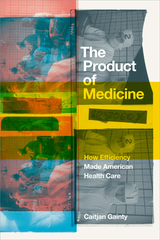 The Product of Medicine: How Efficiency Made American Health Care
Caitjan Gainty
Duke University Press, 2025 In The Product of Medicine, Caitjan Gainty traces the history of the early twentieth-century medical efficiency movement in the United States, restoring it as a significant driver of medicine’s modernization while also revealing its broader significance as a cultural force shaping modern American life. Covering a range of efficiency’s uses in medicine—from the assembly-line structure of the early Mayo Clinic and Henry Ford Hospital to the landmark Flexner Report and the prosecution of the American Medical Association as a monopoly—Gainty challenges long-standing presumptions about how medicine acquired power and prestige during the Progressive Era. Gainty demonstrates how, rather than as a result of pathbreaking scientific advance or the rise of professional organizations, medicine came to be understood as modern through the more prosaic processes of standardization and organization. In doing so, Gainty uncovers medical efficiency as not only a function of industrial capitalism but also a vehicle for balancing populist and autocratic tendencies to maintain a workable American democracy.
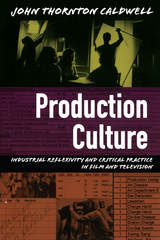 Production Culture: Industrial Reflexivity and Critical Practice in Film and Television
John Thornton Caldwell
Duke University Press, 2008 In Production Culture, John Thornton Caldwell investigates the cultural practices and belief systems of Los Angeles–based film and video production workers: not only those in prestigious positions such as producers and directors but also many “below-the-line” laborers, including gaffers, editors, and camera operators. Caldwell analyzes the narratives and rituals through which workers make sense of their labor and critique the film and TV industry as well as the culture writ large. As a self-reflexive industry, Hollywood constantly exposes itself and its production processes to the public; workers’ ideas about the industry are embedded in their daily practices and the media they create. Caldwell suggests ways that scholars might learn from the industry’s habitual self-scrutiny. Drawing on interviews, observations of sets and workplaces, and analyses of TV shows, industry documents, economic data, and promotional materials, Caldwell shows how film and video workers function in a transformed, post-network industry. He chronicles how workers have responded to changes including media convergence, labor outsourcing, increasingly unstable labor and business relations, new production technologies, corporate conglomeration, and the proliferation of user-generated content. He explores new struggles over “authorship” within collective creative endeavors, the way that branding and syndication have become central business strategies for networks, and the “viral” use of industrial self-reflexivity to motivate consumers through DVD bonus tracks, behind-the-scenes documentaries, and “making-ofs.” A significant, on-the-ground analysis of an industry in flux, Production Culture offers new ways of thinking about media production as a cultural activity.
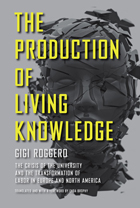 The Production of Living Knowledge: The Crisis of the University and the Transformation of Labor in Europe and North America
Gigi Roggero
Temple University Press, 2011 Evaluating higher education institutions—particularly the rise of the “global university”—and their rapidly changing role in the global era, Gigi Roggero finds the system in crisis. In his groundbreaking book, The Production of Living Knowledge, Roggero examines the university system as a key site of conflict and transformation within “cognitive capitalism”—a regime in which knowledge has become increasingly central to the production process at large. Based on extensive fieldwork carried out through the activist method of conricerca, or “co-research,” wherein researchers are also subjects, Roggero’s book situates the crisis of the university and the changing composition of its labor force against the backdrop of the global economic crisis. Combining a discussion of radical experiments in education, new student movements, and autonomist Marxian (or post-operaista) social theory, Roggero produces a distinctly transnational and methodologically innovative critique of the global university from the perspective of what he calls “living knowledge.” In light of new student struggles in the United States and across the world, this first English-language edition is particularly timely.
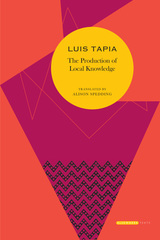 The Production of Local Knowledge: History and Politics in the Work of René Zavaleta Mercado
Luis Tapia Mealla
Seagull Books, 2016 This volume presents a comprehensive examination of the work of René Zavaleta Mercado (1939–1984), the most notable Bolivian political thinker of the twentieth century. While Zavaleta did not live to see the triumph of the indigenous social movements that have made Bolivia famous in recent years, his writings influenced many of the activists and ideologues who made today’s changes possible. This exploration of Zavaleta’s work by Luis Tapia, a contemporary political analyst who has been a colleague of many of the central actors in today’s government, presents a detailed panorama of Bolivian history that establishes the context of Zavaleta’s analysis of the events of his time, from the revolutionary nationalist movement which took power in 1952 through the military dictatorships that followed it from 1964 onwards to the popular protests that eventually defeated the dictatorship and restored democratic government in 1982. The book will be necessary reading for anyone who wants to understand the decades of history and the ideological currents that laid the groundwork for the rise to power of the neo-indigenists lead by Evo Morales in the twenty-first century.
The Production of Modernization: Daniel Lerner, Mass Media, and The Passing of Traditional Society
Authored by Hemant Shah
Temple University Press, 2011 Daniel Lerner's 1958 book The Passing of Traditional Society was central in shaping Cold War–era ideas about the use of mass media and culture to promote social and economic progress in postcolonial nations. Based on a study of the effectiveness of propaganda in the Middle East, Lerner’s book claimed that exposure to American media messages could motivate “traditional” people in the postcolonial nations to become “modern” by cultivating empathy for American ideas, goods, and ways of life.
The Production of Modernization examines Lerner’s writings to construct the intellectual trajectory of his thinking about mass media and modernization up to and beyond the publication of his famous book. Shah has written not just an intellectual biography of Lerner but also a history of the discipline he shaped.
Productive Fandom: Intermediality and Affective Reception in Fan Cultures
Nicolle Lamerichs
Amsterdam University Press, 2018 To dismantle negative stereotypes of fans, this book offers a media ethnography of the digital culture, conventions, and urban spaces associated with fandoms, arguing that fandom is an area of productive, creative, and subversive value. By examining the fandoms of Sherlock, Glee, Firefly, and other popular television-based franchises, the author appeals to fans and scholars alike in her empirically grounded methodology and insightful analysis of production hierarchies, gender, sexuality, play, and affect.
The Productive Tension of Hawthorne's Art
Claudia D. Johnson
University of Alabama Press, 1981 In The Productive Tension of Hawthorne’s Art, Claudia D. Johnson identifies and explores the tension between Nathaniel Hawthorne’s concepts of art and morality by describing its sources, plotting its manifestations, and suggesting how the opposing elements of this tension are finally reconciled.
Hawthorne’s major works, including his short fiction, exhibit a profound conflict between eighteenth-century views of an orderly, balanced, and static universe on the one hand and nineteenth-century conceptions of a universe in constant flux on the other. Johnson argues that Hawthorne, though he did not identify with any organized church, found in theology the myths that allowed him to negotiate a bridge between these two opposed views of the world and to forge the social, psychological, and aesthetic values that inform his art.
 Productivity and the Social System—The USSR and the West
Abram Bergson
Harvard University Press, 1978 The question of the comparative efficiency of socialism, long debated in theoretical discussions, is explored in depth in these studies. Abram Bergson, one of the foremost Western scholars of the Soviet system, focuses especially on socialism as found in the USSR, and thus on the famous “Soviet model.” This includes centralist planning with its reliance on bureaucratic, as distinct from market processes, and a development strategy stressing growth and, until recently, limited economic relations with the capitalist West. Devoting some attention also to the experience with the “Soviet model” in Eastern Europe, Bergson compares the resulting economic performance with that in the West. The United States is the major Western country considered, but Western European nations are also studied with care and precision.
The “Soviet model” has been evolving in the course of time, and these studies explore recent developments in planning, particularly managerial incentives and controls, and growth strategy. In contrasting Eastern and Western economic performance, Bergson uses sophisticated quantitative techniques to contrast levels and growth of productivity while allowing for differences in historical factors, especially the stage of economic development. Productivity is considered both for the economy generally and for its sectors. Although socialist efficiency is investigated mainly through the Soviet case, this path-breaking book should serve as a point of departure for further inquiries into that large theme.
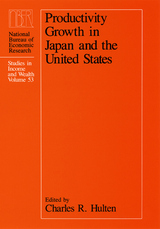 Productivity Growth in Japan and the United States
Edited by Charles R. Hulten
University of Chicago Press, 1991 Emerging from the ruins of the Second World War, the Japanese economy has grown at double-digit rate throughout much of the 1950s and 1960s, and, when the oil crisis of the 1970s slowed growth throughout the industrialized world, Japanese growth throughout the industrialized world, Japanese growth rates remained relatively strong. There have been many attempts by scholars from a wide range of disciplines to explain this remarkable history, but for economists interested in the quantitative analysis of economic growth and the principal question addressed is how Japan was able to grow so rapidly.
The contributors focus their efforts on the accurate measurement and comparison of Japanese and U.S. economic growth. Assuming that any sustained increase in real GNP must be due either to an increase in the quantity of capital and labor used in production or to the more efficient use of these inputs, the authors analyze the individual contributions of various factors and their importance in the process of output growth.
These essays extend the methodology of growth analysis and offer many insights into the factors leading to the superior performance of the Japanese economy. They demonstrate that growth is a complex process and no single factor can explain the Japanese 'miracle.'
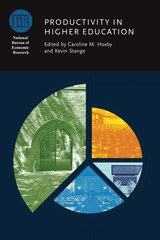 Productivity in Higher Education
Edited by Caroline M. Hoxby and Kevin Stange
University of Chicago Press, 2019 How do the benefits of higher education compare with its costs, and how does this comparison vary across individuals and institutions? These questions are fundamental to quantifying the productivity of the education sector. The studies in Productivity in Higher Education use rich and novel administrative data, modern econometric methods, and careful institutional analysis to explore productivity issues. The authors examine the returns to undergraduate education, differences in costs by major, the productivity of for-profit schools, the productivity of various types of faculty and of outcomes, the effects of online education on the higher education market, and the ways in which the productivity of different institutions responds to market forces. The analyses recognize five key challenges to assessing productivity in higher education: the potential for multiple student outcomes in terms of skills, earnings, invention, and employment; the fact that colleges and universities are “multiproduct” firms that conduct varied activities across many domains; the fact that students select which school to attend based in part on their aptitude; the difficulty of attributing outcomes to individual institutions when students attend more than one; and the possibility that some of the benefits of higher education may arise from the system as a whole rather than from a single institution. The findings and the approaches illustrated can facilitate decision-making processes in higher education.
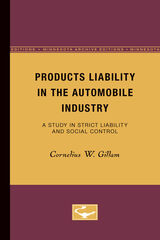 Products Liability in the Automobile Industry: A Study in Strict Liability and Social Control
Cornelius Gillam
University of Minnesota Press, 1960
Products Liability in the Automobile Industry was first published in 1960.This is a study of the products liability of automobile manufacturers, the legal and economic basis of this liability, its meaning to business management, and measures which could be taken fore refinement of the concept. The phrase “products liability” refers to the legal responsibility of sellers to compensate buyers for losses suffered because of defects in the goods purchased.The author traces the development of modern products liability with primary reference to the automobile industry. He discusses or cites every American court decisions dealing with products liability of manufacturers of automobiles or automobile accessories, or analogous goods such as tractors, farm implements, trucks, tires, or engines. He points out that court decisions in automobile cases have been second only to those in food cases in formulating principles of products liability.This work offers the first complete appraisal of the automobile cases and of products liability in the automobile industry in general, provides a statement of the managerial implications of products liability, and, for the first time, relates the principles of products liability to an industry’s overall economic structure. The conclusions are significant to wide areas of law, economics, business, and sociology, and are of special importance to the insurance industry.
 Pro-dvizhenie: Advanced Russian through Film and Media
Alyssa DeBlasio and Izolda Savenkova
Georgetown University Press, 2023 An advanced, student-centered textbook that uses popular media to explore diverse perspectives from across Russian-speaking cultures Pro-dvizhenie is a student-centered, inquiry-based textbook designed to build Advanced-level Russian proficiency through engagement with timely topics that encourage reflection and examination. Whether exploring the role of technology in relationships, learning about indigenous communities of Russia, or reflecting on what it means to live well, Pro-dvizhenie uses popular Russian film, TV, and media as a springboard for various types of activities, including skill-building exercises, essay writing, and group projects. Students are encouraged to challenge assumptions and make intercultural connections throughout while developing ACTFL Advanced-level skills such as argumentation, narration, and collaboration. Students benefit from extensive activities and resources, including audio and video of diverse voices and viewpoints from across Russia, available to stream on the Press website. A full-service textbook for instructors, Pro-dvizhenie includes extensive online instructors’ resources, such as additional grammar and vocabulary assignments, writing and group project prompts, grading rubrics, and answer keys. A modular structure and activities at various levels of difficulty give instructors the flexibility to select material in the book based on their class’s needs, making Pro-dvizhenie perfectly suited for mixed-level classrooms. The textbook can be used over one semester or over the course of a full year.
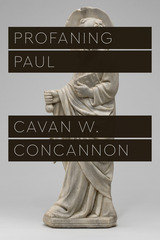 Profaning Paul
Cavan W. Concannon
University of Chicago Press, 2021 A critical reconsideration of the repeated use of the biblical letters of Paul.
The letters of Paul have been used to support and condone a host of evils over the span of more than two millennia: racism, slavery, imperialism, misogyny, and anti-Semitism, to name a few. Despite, or in some cases because of, this history, readers of Paul have felt compelled to reappropriate his letters to fit liberal or radical politics, seeking to set right the evils done in Paul’s name. Starting with the language of excrement, refuse, and waste in Paul’s letters, Profaning Paul looks at how Paul’s “shit” is recycled and reconfigured. It asks why readers, from liberal Christians to academic biblical scholars to political theorists and philosophers, feel compelled to make Paul into a hero, mining his words for wisdom. Following the lead of feminist, queer, and minoritized scholarship, Profaning Paul asks what would happen if we stopped recycling Paul’s writings. By profaning the status of his letters as sacred texts, we might open up new avenues for imagining political figurations to meet our current and coming political, economic, and ecological challenges.
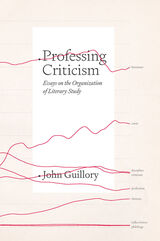 Professing Criticism: Essays on the Organization of Literary Study
John Guillory
University of Chicago Press, 2022 A sociological history of literary study—both as a discipline and as a profession.
As the humanities in higher education struggle with a labor crisis and with declining enrollments, the travails of literary study are especially profound. No scholar has analyzed the discipline’s contradictions as authoritatively as John Guillory. In this much-anticipated new book, Guillory shows how the study of literature has been organized, both historically and in the modern era, both before and after its professionalization. The traces of this volatile history, he reveals, have solidified into permanent features of the university. Literary study continues to be troubled by the relation between discipline and profession, both in its ambivalence about the literary object and in its anxious embrace of a professionalism that betrays the discipline’s relation to its amateur precursor: criticism.
In a series of timely essays, Professing Criticism offers an incisive explanation for the perennial churn in literary study, the constant revolutionizing of its methods and objects, and the permanent crisis of its professional identification. It closes with a robust outline of five key rationales for literary study, offering a credible account of the aims of the discipline and a reminder to the professoriate of what they already do, and often do well.
Professing Literature: An Institutional History, Twentieth Anniversary Edition
Gerald Graff
University of Chicago Press, 2007 Widely considered the standard history of the profession of literary studies, Professing Literature unearths the long-forgotten ideas and debates that created the literature department as we know it today. In a readable and often-amusing narrative, Gerald Graff shows that the heated conflicts of our recent culture wars echo—and often recycle—controversies over how literature should be taught that began more than a century ago.
Updated with a new preface by the author that addresses many of the provocative arguments raised by its initial publication, Professing Literature remains an essential history of literary pedagogy and a critical classic.
“Graff’s history. . . is a pathbreaking investigation showing how our institutions shape literary thought and proposing how they might be changed.”— The Norton Anthology of Theory and Criticism
Professing Poetry: Seamus Heaney’s Poetics
Michael Cavanagh
Catholic University of America Press, 2009 The first full-length study of Heaney's poetics, Professing Poetry explores Heaney's unusual concept of influence and the various ways in which Heaney interacts with other writers
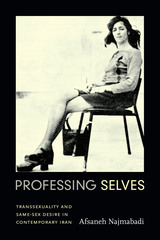 Professing Selves: Transsexuality and Same-Sex Desire in Contemporary Iran
Afsaneh Najmabadi
Duke University Press, 2013 Since the mid-1980s, the Islamic Republic of Iran has permitted, and partially subsidized, sex reassignment surgery. In Professing Selves, Afsaneh Najmabadi explores the meaning of transsexuality in contemporary Iran. Combining historical and ethnographic research, she describes how, in the postrevolutionary era, the domains of law, psychology and psychiatry, Islamic jurisprudence, and biomedicine became invested in distinguishing between the acceptable "true" transsexual and other categories of identification, notably the "true" homosexual, an unacceptable category of existence in Iran. Najmabadi argues that this collaboration among medical authorities, specialized clerics, and state officials—which made transsexuality a legally tolerated, if not exactly celebrated, category of being—grew out of Iran's particular experience of Islamicized modernity. Paradoxically, state regulation has produced new spaces for non-normative living in Iran, since determining who is genuinely "trans" depends largely on the stories that people choose to tell, on the selves that they profess.
Profession of Medicine: A Study of the Sociology of Applied Knowledge
Eliot Freidson
University of Chicago Press, 1988 "Must be judged as a landmark in medical sociology."—Norman Denzin, Journal of Health and Social Behavior
"Profession of Medicine is a challenging monograph; the ideas presented are stimulating and thought provoking. . . . Given the expanding domain of what illness is and the contentions of physicians about their rights as professionals, Freidson wonders aloud whether expertise is becoming a mask for privilege and power. . . . Profession of Medicine is a landmark in the sociological analysis of the professions in modern society."—Ron Miller, Sociological Quarterly
"This is the first book that I know of to go to the root of the matter by laying open to view the fundamental nature of the professional claim, and the structure of professional institutions."—Everett C. Hughes, Science
 The Profession of Widowhood: Widows, Pastoral Care, and Medieval Models of Holiness
Katherine Clark Walter
Catholic University of America Press, 2018 The Profession of Widowhood explores how the idea of ‘true’ widowhood was central to pre-modern ideas concerning marriage and of female identity more generally. The medieval figure of the Christian vere vidua or “good” widow evolved from and reinforced ancient social and religious sensibilities of chastity, loyalty and grief as gendered ‘work.’ The ideal widow was a virtuous woman who mourned her dead husband in chastity, solitude, and most importantly, in perpetuity, marking her as “a widow indeed” (1 Tim 5:5). The widow who failed to display adequate grief fulfilled the stereotype of the ‘merry widow’ who forgot her departed spouse and abused her sexual and social freedom. Stereotypes of widows ‘good’ and ‘bad’ served highly-charged ideological functions in pre-modern culture, and have remained durable even in modern times, even as Western secular society now focuses more on a woman’s recovery from grief and possible re-coupling than the expectation that she remain forever widowed. The widow represented not only the powerful bond created by love and marriage, but also embodied the conventions of grief that ordered the response when those bonds were broken by premature death. This notion of the widow as both a passive memorial to her husband and as an active ‘rememberer’ was rooted in ancient traditions, and appropriated by early Christian and medieval authors who used “good” widowhood to describe the varieties of female celibacy and to define the social and gender order. A tradition of widowhood characterized by chastity, solitude, and permanent bereavement affirmed both the sexual mores and political agenda of the medieval Church. Medieval widows—both holy women recognized as saints and ‘ordinary women’ in medieval daily life—recognized this tradition of professed chastity in widowhood not only as a valuable strategy for avoiding remarriage and protecting their independence, but as a state with inherent dignity that afforded opportunities for spiritual development in this world and eternal merit in the next.
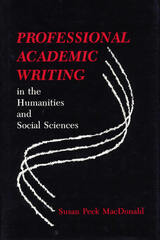 Professional Academic Writing in the Humanities and Social Sciences
Susan Peck MacDonald
Southern Illinois University Press, 1994 In Professional Academic Writing in the Humanities and Social Sciences, Susan Peck MacDonald tackles important and often controversial contemporary questions regarding the rhetoric of inquiry, the social construction of knowledge, and the professionalization of the academy. MacDonald argues that the academy has devoted more effort to analyzing theory and method than to analyzing its own texts. Professional texts need further attention because they not only create but are also shaped by the knowledge that is special to each discipline. Her assumption is that knowledge-making is the distinctive activity of the academy at the professional level; for that reason, it is important to examine differences in the ways the professional texts of subdisciplinary communities focus on and consolidate knowledge within their fields. Throughout the book, MacDonald stresses her conviction that academics need to do a better job of explaining their text-making axioms, clarifying their expectations of students at all levels, and monitoring their own professional practices. MacDonald’s proposals for both textual and sentence-level analysis will help academic professionals better understand how they might improve communication within their professional communities and with their students.
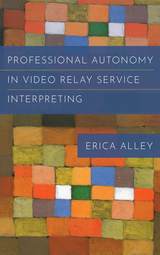 Professional Autonomy in Video Relay Service Interpreting
Erica Alley
Gallaudet University Press, 2019 Video relay service (VRS) is a federally funded service that provides telecommunications access for deaf people. It is also a for-profit industry with guidelines that may limit the autonomy of the sign language interpreters who work in VRS settings. In this volume, Erica Alley examines how VRS interpreters, or “Communication Assistants,” exercise professional autonomy despite the constraints that arise from rules and regulations established by federal agencies and corporate entities. Through interviews with VRS interpreters, Alley reveals the balance they must achieve in providing effective customer service while meeting the quantitative measures of success imposed by their employer in a highly structured call center environment.
Alley considers the question of how VRS fits into the professional field of interpreting, and discovers that—regardless of the profit-focused mentality of VRS providers—interpreters make decisions with the goal of creating quality customer service experiences for deaf consumers, even if it means “breaking the rules.” Her findings shed light on the decision-making process of interpreters and how their actions are governed by principles of self-care, care for colleagues, and concern for the quality of services provided. Professional Autonomy in Video Relay Service Interpreting is essential reading in interpreter education courses and interpreter training programs.
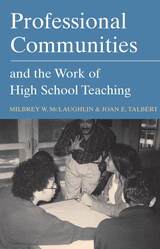 Professional Communities and the Work of High School Teaching
Milbrey W. McLaughlin and Joan E. Talbert
University of Chicago Press, 2001 American high schools have never been under more pressure to reform: student populations are more diverse than ever, resources are limited, and teachers are expected to teach to high standards for all students. While many reformers look for change at the state or district level, the authors here argue that the most local contexts—schools, departments, and communities—matter the most to how well teachers perform in the classroom and how satisfied they are professionally. Their findings—based on one of the most extensive research projects ever done on secondary teaching—show that departmental cultures play a crucial role in classroom settings and expectations. In the same school, for example, social studies teachers described their students as "apathetic and unwilling to work," while English teachers described the same students as "bright, interesting, and energetic."
With wide-ranging implications for educational practice and policy, this unprecedented look into teacher communities is essential reading for educators, administrators, and all those concerned with U. S. High Schools.
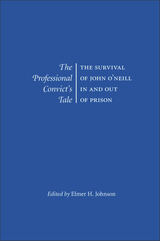 The Professional Convict's Tale: The Survival of John O'Neill In and Out of Prison
Elmer H. Johnson
Southern Illinois University Press, 2007 Challenging the ideology of treatment in the prison world The Professional Convict’s Tale: The Survival of John O’Neill In and Out of Prison offers a unique, inside view of life behind bars in the 1960s. Elmer H. Johnson, a criminologist who has specialized in prison life for half a century, gave Menard Penitentiary parolee John O’Neill a tape recorder and a set of questions designed to draw out his opinions and observations about the prison world. This study frames O’Neill’s responses with Johnson’s analysis. O’Neill’s narrative guides readers through the world beyond the prison gate as he shares his strategies for survival and proposes alternatives to rebellion or submission. He discusses the fractionalization between the keepers and the kept and the effects that subterranean communication, threats of inmate predators, and prison riots can have on the psyche of both inmates and staff. O’Neill’s frustrations and the inadequate responses from the community to which he was paroled illustrate the social costs and impact of parole for the community and for the parolee. Although O’Neill recorded his comments more than forty years ago, they are still relevant today when thousands of convicts are being released from prison each year.
Professional Correctness: Literary Studies and Political Change
Stanley Fish
Harvard University Press The discipline of literary criticism is strictly defined, and the most pressing issues of our time—racism, violence against women and homosexuals, cultural imperialism, and the like—are located outside its domain. In Professional Correctness, Stanley Fish raises a provocative challenge to those who try to turn literary studies into an instrument of political change, arguing that when literary critics try to influence society at large by addressing social and political issues, they cease to be literary critics at all.
Anyone interested in the debate over the place of cultural studies in the field of literary criticism, or the more general question of whether academics can become the "public intellectuals" many aspire to be, needs to read Fish's powerful and unconventional argument for restoring discipline to the academy.
Professional Ethics and Primary Care Medicine: Beyond Dilemmas and Decorum
Harmon L. Smith and Larry R. Churchill
Duke University Press, 1986 This volume moves beyond ethics as problem-solving or ethics as etiquette to offer a look at ethics in primary care—as opposed to life-or-death—medical care. Professional Ethics and Primary Care Medicine deals with the ethics of routine, day-to-day encounters between doctors and patients. It probes beneath the hard decisions to look at the moral frameworks, habits of thought, and customs of practice that underlie choices. Harmon Smith and Larry Churchill argue that primary care, far from being merely a setting for the rendering of care, provides a new understanding of both physician and patient, and thereby offers a fresh basis for medical ethics.
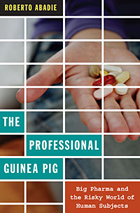 The Professional Guinea Pig: Big Pharma and the Risky World of Human Subjects
Roberto Abadie
Duke University Press, 2010 The Professional Guinea Pig documents the emergence of the professional research subject in Phase I clinical trials testing the safety of drugs in development. Until the mid-1970s Phase I trials were conducted on prisoners. After that practice was outlawed, the pharmaceutical industry needed a replacement population and began to aggressively recruit healthy, paid subjects, some of whom came to depend on the income, earning their living by continuously taking part in these trials. Drawing on ethnographic research among self-identified “professional guinea pigs” in Philadelphia, Roberto Abadie examines their experiences and views on the conduct of the trials and the risks they assume by participating. Some of the research subjects he met had taken part in more than eighty Phase I trials. While the professional guinea pigs tended to believe that most clinical trials pose only a moderate health risk, Abadie contends that the hazards presented by continuous participation, such as exposure to potentially dangerous drug interactions, are discounted or ignored by research subjects in need of money. The risks to professional guinea pigs are also disregarded by the pharmaceutical industry, which has become dependent on the routine participation of experienced research subjects. Arguing that financial incentives compromise the ethical imperative for informed consent to be freely given by clinical-trials subjects, Abadie confirms the need to reform policies regulating the participation of paid subjects in Phase I clinical trials.
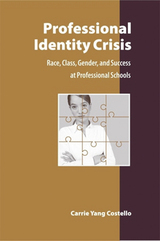 Professional Identity Crisis: Race, Class, Gender, and Success at Professional Schools
Carrie Yang Costello
Vanderbilt University Press, 2006 The fact that women and people of color tend to underperform at professional schools is a source of controversy. Conservatives blame affirmative action, while liberals blame intentional discrimination. The extensive research reported in Professional Identity Crisis belies both conspiracy theories. The author spent over 400 hours observing how first-year students are socialized in two very different environments, Boalt School of Law and the School of Social Welfare at UC Berkeley, watching how they adapted to different expectations of how to speak, dress, and behave in the classroom. Costello found that students who were female, of color, disabled, or poor were not underqualified compared with their privileged peers. Nor did the research uncover intentional bigotry. Instead, the disproportionate success of white men can be explained by the fact that they are more likely to acquire appropriate professional identities swiftly, with little inner conflict. Students from less privileged backgrounds, however, suffered from "identity dissonance." For example, Jasmine, a Filipino student from Los Angeles, explained, "In the legal culture you have to adopt a different way of being, a different vocabulary and way to carry yourself . . . That's how I got this far. And when I go home, if I act the way I do here, they won't get it. My cousins and my friends say, 'You're kind of whitewashed.' And when I come back here I have to get back my law style."
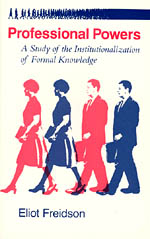 Professional Powers: A Study of the Institutionalization of Formal Knowledge
Eliot Freidson
University of Chicago Press, 1986 "This is an immensely useful book for sociologists working in a wide range of sub-fields. It confirms Freidson's status among the leading exponents of the old Chicago tradition. This book is catholic in its reading, sophisticated in its arguments and cautious in its judgements."—Robert Dingwall, Sociology
"As an attempt to provide a complex, wide-ranging account this book should be essential reading for specialist students, and it should act as a stimulus for the extension of both empirical research and theory."—Alex Faulkner, Sociological Review
"Freidson's book is a concise introduction to the professions, challenging specialists with its puncturing of theoretically induced misconceptions and offering general readers a clear but critical entrée to the theoretical literature concerning this central aspect of modern society."—Andrew Abbott, Science
"This is a stimulating and well-written book which opens up a new perspective on the professions as well as contributing to existing debates."—David Podmore, Times Higher Education Supplement
 A Professional Professoriate: Unionization, Bureaucratization, and the AAUP
Philo A. Hutcheson
Vanderbilt University Press, 2000 Starting with the question "How have professors and educational institutions responded to pressures to be professional yet act bureaucratically," Philo Hutcheson uses federal and AAUP records and surveys and blends historical research and sociological analysis to develop a full understanding of the problem. With the dramatic expansion of the professoriate following World War II came increasing tensions between the professor's perceived traditional status as an autonomous professional on the one hand and new role as a bureaucrat subject to institutional authority and responsible for departmental and committee assignments on the other. In this increasingly conflicted realm, the AAUP functioned as a key intermediary, dealing with such issues as tenure, salary, contracts, and even faculty strikes.
Hutcheson examines how tensions between the requirements of institutional bureaucracies and the norms of the academic profession resulted in contentiousness and conflict within the national AAUP, between administrators and faculty members on individual campuses, within the ranks of faculties themselves, and even deep in the consciences of many concerned individuals. The book analyzes the association's ability to respond effectively and to balance the values of collegial representation with the powers of collective bargaining. It thus offers a detailed and authoritative examination of the AAUP's search for ways to sustain professionalism while dealing with the fundamental changes in the nature of the professoriate in the post-World War II era.
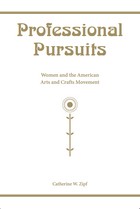 Professional Pursuits: Women and the American Arts and Crafts Movement
Catherine W. Zipf
University of Tennessee Press, 2009
The Victorian era provided few opportunities for women in the professional world. The American Arts and Crafts movement, which began in the late nineteenth century to promote handcraftsmanship over mass production, was a major factor in changing the status of women as professional workers. In <i>Professional Pursuits</i>, Catherine Zipf examines the participation of women in this significant design movement and the role they played in revolutionizing the position of women in the professional world. She also shows how, in turn, the Arts and Crafts movement set the stage for social and political change in future years.
Zipf focuses on five gifted women in various parts of the country. In San Diego, Hazel Wood Waterman parlayed her Arts and Crafts training into a career in architecture. Cincinnati's Mary Louise McLaughlin expanded on her interest in Arts and Crafts pottery by inventing new ceramic technology.
New York's Candace Wheeler established four businesses that used Arts and Crafts production to help other women earn a living. In Syracuse, both Adelaide Alsop Robineau and Irene Sargent were responsible for disseminating Arts and Crafts-related information through the movement's publications. Each woman's story is different, but each played an important part in the creation of professional opportunities for women in a male-dominated society.
<i>Professional Pursuits</i> will be of interest to scholars and students of material culture and of the Arts and Crafts movement. More importantly, it chronicles a very significant, little-understood aspect of the development of Victorian capitalism: the integration of women into the professional workforce.
Catherine Zipf is an assistant professor in the Department of Cultural and Historic Preservation at Salve Regina University. She has published articles in <i>Women's Art News</i> and the <i>Journal of the Society of Architectural Historians</i>.
The Professional Thief
Chic Conwell and Edwin Hardin Sutherland
University of Chicago Press, 1988 This monograph by a professional thief—with the aid of Edwin H. Sutherland's expert comments and analyses—is a revealing sociological document that goes far to explain the genesis, development, and patterns of criminal behavior. "Chic Conwell," as the author was known in the underworld, gives a candid and forthright account of the highly organized society in which the professional thief lives. He tells how he learned to steal, survive, succeed, and ultimately to pay his debt to society and prepare himself for full and useful citizenship. The Professional Thief presents in amazing detail the hard, cold facts about the private lives and professional habits of pickpockets, shoplifters, and conmen, and brings into focus the essential psychological and sociological situations that beget and support professional crime.
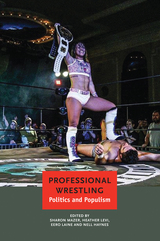 Professional Wrestling: Politics and Populism
Edited by Sharon Mazer, Heather Levi, Eero Laine, and Nell Haynes
Seagull Books, 2020 A wildly popular form of mass media and live entertainment, professional wrestling makes a spectacle of violent acts. With its long history of working contemporary events into storylines and commenting upon cultural and military conflicts, professional wrestling is also intrinsically political. Its performance—theatricalities, machinations and conditions of production, figurations, and audiences—arises from and engages with the world around. Whether flowing with the mainstream of popular culture or fighting at the fringes, professional wrestling shows us how we are fighting, what we are fighting about, and what we are fighting for.
This edited volume asks how professional wrestling is implicated in the current resurgence of populist politics, whether right-wing and Trump–inflected, or leftist and socialist. How might it do more than reflect and, in so doing, reaffirm the status quo? While provoked by the disruptive performances of Trump as candidate and president, and mindful of his longstanding ties to the WWE, this timely volume looks more broadly and internationally at the infusion of professional wrestling’s worldview into the twinned discourses of politics and populism. The contributors are scholars from a wide range of disciplines: theater and performance studies; cultural, media, and communication studies; anthropology and sociology; and gender and sexuality studies. Together they argue that the game’s popularity and its populist tendencies open it to the left as well as to the right, to contestation as well as to conformity, making it an ideal site for working on feminist and activist projects and ideas.
The Professionalisation of Political Communication
Edited by Ralph Negrine, Christina Holtz-Bacha, Paolo Mancini, Stylianos Papatha
Intellect Books, 1995 Long before a politician opens his mouth to speak in public, his words have been filtered through a team of public relations experts, communications consultants, and campaign assistants. When did politicians’ speeches stop being their own? And who are these professional communicators who fine-tune messages to suit the demands of electoral strategy? In The Professionalization of Political Communication, renowned contributors explore the effect of such consciously manipulated discourse on European politics; the resulting volume is essential for anyone interested in the changing political dialect.
 Professionalism Reborn: Theory, Prophecy, and Policy
Eliot Freidson
University of Chicago Press, 1994 In industrialized societies, professionals have long been valued and set apart from other workers because of their specialized knowledge and skill. But has their role in these societies declined? Of what significance are they today?
In this concise synthesis of the major debates about the professions since World War II, Eliot Freidson explores several broad questions about professionalism today—what it is, what its future is likely to be, and its value to public policy. Freidson argues that because professionalism is based on specialized knowledge, it is distinct from either bureaucratic or market-based forms of work. He predicts a rebirth of the professions during which practitioners lose some of their independence and become more accountable to standards of a professional elite. And, defending professionalism as a desirable method of providing complex, discretionary services to the public, Freidson argues that market-based or bureaucratic methods would impoverish the quality of service to consumers, and suggests ways the virtues of professionalism can be reinforced.
The most accessible survey available of almost fifty years of theory and research by the scholar whose own work helped define the field, this book will appeal to the growing international body of scholars concerned with studying and theorizing about the professions.
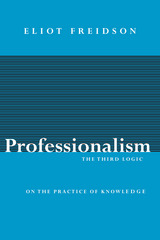 Professionalism, the Third Logic: On the Practice of Knowledge
Eliot Freidson
University of Chicago Press, 2021 This new work explores the meaning and implications of professionalism as a form of social organization. Eliot Freidson formalizes professionalism by treating it as an ideal type grounded in the political economy; he presents the concept as a third logic, or a more viable alternative to consumerism and bureaucracy. He asks us to imagine a world where workers with specialized knowledge and the ability to provide society with especially important services can organize and control their own work, without directives from management or the influence of free markets.
Freidson then appraises the present status of professionalism, exploring how traditional and national variations in state policy and organization are influencing the power and practice of such professions as medicine and law. Widespread attacks by neoclassical economists and populists, he contends, are obscuring the social value of credentialism and monopolies. The institutions that sustain professionalism in our world are simply too useful to both capital and state to dismiss.
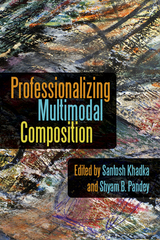 Professionalizing Multimodal Composition
Santosh Khadka
Utah State University Press, 2023 Multimodal composition is becoming increasingly popular in university classrooms as faculty, students, and institutions come to recognize that old and new technologies have enabled, and even demanded, the use of more than one composing mode for communicating, solving problems, and keeping up with the latest discourse. Professionalizing Multimodal Composition embraces and enacts multimodal composition in various writing courses and programs by exploring institutional, programmatic, and individual faculty initiatives for capacity building and human resource development across institutions.
Academic leaders, scholars, and faculty who have successfully designed and launched academic programs or faculty development initiatives discuss the theoretical and logistical questions considered in their design, the outcomes they achieved, and how others can emulate them. This exchange of knowledge, insight, experiences, and lessons learned among community members is critical for enabling or inspiring other programs, departments, and institutions to conceive, design, and launch academic programs or faculty development initiatives for their own faculty.
The larger goal of professionalizing is to work with teaching faculty to increase their interactional expertise with multimodal composition, and this collection offers a set of models for how faculty can do that at their own institutions and in their own programs.
Professionals under Pressure: The Reconfiguration of Professional Work in Changing Public Services
Edited by Mirko Noordegraaf and Bram Steijn
Amsterdam University Press, 2013 Over the past decade, public services have come under increasing pressure to perform like private-sector organisations. This study demonstrates that professionals have much leeway in coping with changes caused by IT developments, distributed knowledge and more demanding public which have all created new pressures on public services. The authors conclude that rather than demanding more autonomy and space, public service professionals need renewed and workable professional standards.
Professions And The State: Expertise and Autonomy in the Soviet Union and Eastern Europe
edited by Anthony Jones
Temple University Press, 1991 Unlike autonomous professionals in Western industrialized democracies, professionals in a socialist, bureaucratic setting operate as employees of the state. The change in environment has important Implications not only for the practice of professions but also for the concept of professionalism itself. This collection of nine essays is the first to survey the major professions In the USSR, Czechoslovakia, and Poland. The contributors investigate the implications of professional experience in a socialist economy as well as relating changes in professional organization and power to reform movements in general and perestroika in particular.
In the series Labor and Social Change, edited by Paula Rayman and Carmen Sirianni.
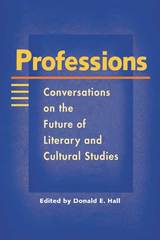 Professions: Conversations on the Future of Literary and Cultural Studies
Edited by Donald E. Hall
University of Illinois Press, 2001 Sometimes playful, always provocative, Professions is a collection of searching and candid conversations--ranging from dialogues to tongue-in-cheek diatribes--on the issues that face literary and cultural critics today.
This volume bares professional concerns, relationships, ambitions, and insecurities about working in academe. Professions provides hard-to-get insider information for students contemplating an academic career. It also challenges professional scholars to retrieve the intellectual curiosity that drew them to scholarship in the first place while demonstrating how disagreement on controversial issues can be conducted with respect, good humor, and an open mind.
Professions features:
Jane Tompkins and Gerald Graff
John McGowan and Regenia Gagnier
James Phelan and James Kincaid
Marjorie Perloff and Robert von Hallberg
Judith Jackson Fossett and Kevin Gaines
Dennis W. Allen and Judith Roof
Niko Pfund, Gordon Hutner, and Martha Banta
Geoffrey Galt Harpham
Donald E. Hall and Susan S. Lanser
J. Hillis Miller, Herbert Lindenberger, Sandra Gilbert, Bonnie Zimmerman, Nellie Y. McKay, and Elaine Marks
Professions in Contemporary Drama
Edited by Daniel Meyer-Dinkgräfe
Intellect Books, 1995 Numerous plays have professionals as major characters, but academia has ignored them to a large extent.
The Professions in Contemporary British Drama fills this extraordinary gap with a series of nine papers discussing the educational professions (Bennett, Mangan), the medical profession (Shields, Buse, ), priests (Kurdi), archaeologists (Forsyth) and artists (Di Benedetto, Meyer-Dinkgräfe, Edwards).
The book is of relevance to theatre academics and students at both undergraduate and postgraduate levels. It is based on a conference organised in conjunction with the Centre for English Studies, School of Advanced Studies, University of London, 6 March 1998.
The Professions: Roles and Rules
Wilbert Ellis Moore
Russell Sage Foundation, 1970 Discusses the place and position of the professional in society today. Wilbert E. Moore attempts to define the characteristics of the professional and to describe the attributes that give professionals the basis for status and esteem. Dr. Moore maintains that the modern scale of professionalism demands a full-time occupation, commitment to a calling, authenticated membership in a formalized organization, advanced education, service orientation, and autonomy restrained by responsibility. The author discusses the professional's interaction on various levels—with his clients, his peers, his employers, his fellows in complementary occupations, and society at large.
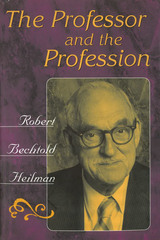 The Professor and the Profession
Robert Bechtold Heilman
University of Missouri Press, 1999
Robert Bechtold Heilman is one of the last survivors of a remarkable generation of American critics that included such literary giants as Cleanth Brooks, Allen Tate, and Edmund Wilson, men to whom literary criticism was not a profession or an academic necessity but a calling. In a distinguished career that has spanned nearly six decades, Heilman has influenced generations of scholars and critics through his exquisitely written commentaries on subjects ranging from William Shakespeare to Thomas Hardy.
In The Professor and the Profession, Heilman looks back over his life and times from his perspective as both an academic and an American. Differing in theme and subject matter, the essays included in this collection are ultimately unified by the author himself. Whether the topic is football, Robert Penn Warren, or education, Heilman's generous and intelligent voice emerges on every page. Yet this collection is more than one academic's personal reminiscences; it is a reflection upon American literary history itself.
In the first section of essays, "The Self Displayed," Heilman reveals how he developed from a small-town boy into a distinguished critic and teacher, touching upon his participation in baseball and love of football along the way. "Writers Portrayed" and "Literary Types and Problems Inspected," the following sections, offer his opinions on the past and on the current state of American literary criticism, including personal portraits of such renowned friends as Eric Voegelin, Robert Penn Warren, Theodore Roethke, and Malcolm Cowley. The final section, "Education Examined," is an enlightening inquiry into the development of American universities in the twentieth century.
A fascinating chronicle of a significant academic life, The Professor and the Profession will appeal to a broad array of scholars, from young academics wanting to know where they came from to those of Heilman's generation who can appreciate this personal reminiscence into the world of letters.
A Professor at the End of Time: The Work and Future of the Professoriate
Best, John
Rutgers University Press, 2017 A Professor at the End of Time tells one professor’s story in the context of the rapid reconfiguration of higher education going on now, and analyzes what the job included before the supernova of technological innovation, the general influx of less-well-prepared students, and the diminution of state and federal support wrought wholesale changes on the profession.
 Professor Baseball: Searching for Redemption and the Perfect Lineup on the Softball Diamonds of Central Park
Edwin Amenta
University of Chicago Press, 2007 It happens every summer: packs of beer-bellied men with gloves and aluminum bats, putting their middle-aged bodies to the test on the softball diamond. For some, this yearly ritual is driven by a simple desire to enjoy a good ballgame; for others, it’s a way to forge friendships—and rivalries. But for one short, wild-haired, bespectacled professor, playing softball in New York’s Central Park means a whole lot more. It's one last chance to heal the nagging wounds of Little League trauma before the rust of decline and the relentless responsibilities of fatherhood set in.
Professor Baseball is the coming-of-middle-age story of New York University professor and Little League benchwarmer Edwin Amenta. As rookie manager of the Performing Arts Softball League’s doormat Sharkeys, he reverses softball’s usual brawn-over-brains formula. He coaxes his skeptical teammates to follow his sabermetric and sociological approach, based equally on Bill James and Max Weber, which in the heady days of early success he dubs “Eddy Ball.” But Amenta soon learns that his teammates’ attachments to favorite positions and time-honored (if ineffective) strategies are hard to break—especially when the team begins losing. And though he rejects the baseball-as-life metaphor, life keeps intruding on his softball season. Amenta here comes to grips with the humiliation of assisted reproduction, suffers mysterious ailments, and finds himself lingering at the sponsor’s bar, while his partner, a beautiful but baseball-challenged professor, second-guesses his book in the making. Can he turn his team—and his life—around?
Packed with colorful personalities, dramatic games, and the bustle of New York life, Professor Baseball will charm anyone who has ever root, root, rooted for the underdog.
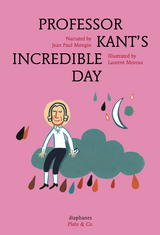 Professor Kant's Incredible Day
Jean Paul Mongin
Diaphanes, 2016
At its most basic, philosophy is about learning how to think about the world around us. It should come as no surprise, then, that children make excellent philosophers! Naturally inquisitive, pint-size scholars need little prompting before being willing to consider life’s “big questions,” however strange or impractical. Plato & Co. introduces children—and curious grown-ups—to the lives and work of famous philosophers, from Descartes to Socrates, Einstein, Marx, and Wittgenstein. Each book in the series features an engaging—and often funny—story that presents basic tenets of philosophical thought alongside vibrant color illustrations.
In Professor Kant’s Incredible Day, the philosopher Immanuel Kant wants only to be left in peace to consider life’s big questions: What can I know? What can I hope for? But, when a perfumed letter arrives one day, it interrupts his studies and sets off a series of events the dour professor could not possibly have predicted. But just when it seems as though all of Königsberg is plunged into chaos, he realizes that this perfect storm may hold the answers to his most pressing questions.
Plato & Co.’s clear approach and charming illustrations make this series the perfect addition to any little library.
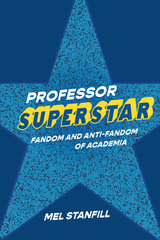 Professor Superstar: Fandom and Anti-Fandom of Academia
Mel Stanfill
University of Michigan Press, 2026 Examining celebrity and fan studies together, Professor Superstar argues that academia shares key traits with fandom, including collective emotional investment, shared interpretation of texts, and identity formation. Universities are often seen as isolated from everyday life, creating an atmosphere of both fascination and resentment. Some academics even go on to become field-specific microcelebrities. Some celebrate their influence while others resent their prominence, leading to both fandom and anti-fandom and reflecting broader social struggles as universities become battlegrounds for economic and political debates. The audiences engaging with academia extend beyond the students and faculty directly involved, creating multiple and conflicting interpretations of what academia represents. Public perceptions of academia are shaped less by its reality than by competing narratives about its role in society. By taking these dynamics seriously, we can better understand the cultural forces shaping both admiration and hostility toward higher education.
Profile of Horace
Shackleton Bailey D. R.
Harvard University Press, 1982 In this concise analysis, written with elegant wit, the greatest living textual critic of Latin authors offers new insight into the poetry of Horace.
Horace is best known for his four books of Odes, cherished for their lyric grace. His amiable persona is displayed more intimately in the moralizing verses of the Satires and Epistles. In a reading of all the poetry, but focusing especially on problematic areas, Shackleton Bailey examines Horace's art of self-presentation. A variety of themes are elucidated, from the poet's relations with his patron to Roman sexual attitudes. Close scrutiny is given to about thirty passages which, he argues, have been misread. An appended essay on a notable predecessor, the textual scholar Richard Bentley, is especially revealing on the art of classical scholarship.
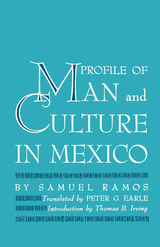 Profile of Man and Culture in Mexico
By Samuel Ramos
University of Texas Press, 1962 Profile of Man and Culture in Mexico, originally written in 1934, is addressed to the author’s compatriots, but it speaks to people, wherever they are, who are interested in enriching their own lives and in elevating the cultural level of their countries. And it speaks with a peculiar timeliness to citizens of the United States who would understand their neighbors to the south. Samuel Ramos’s avowed purpose is to assist in the spiritual reform of Mexico by developing a theory that might explain the real character of Mexican culture. His approach is not flattering to his fellow citizens. After an analysis of the historical forces that have molded the national psychology, Ramos concludes that the Mexican sense of inferiority is the basis for most of the Mexican’s spiritual troubles and for the shortcomings of the Mexican culture. Ramos subscribes to neither of the two major opposing schools of thought as to what norms should direct the development of Mexican culture. He agrees neither with the nationalists, who urge a deliberate search for originality and isolation from universal culture, nor with the “Europeanizers,” who advocate abandonment of the life around them and a withdrawal into the modes of foreign cultures. Ramos thinks that Mexico’s hope lies in a respect for the good in native elements and a careful selection of those foreign elements that are appropriate to Mexican life. Such a sensible choice of foreign elements will result not in imitation, but in assimilation. Combined with the nurturing of desirable native elements, it will result in an independent cultural unit, “a new branch grafted onto world culture.” Ramos finds in Mexico no lack of intelligence or vitality: “It needs only to learn.” And he believes that the future is Mexico’s, that favorable destinies await a Mexico striving for the elevation of humanity, for the betterment of life, for the development of all the national capacities.
A Profile of Twentieth-Century American Poetry
Edited by Jack Myers and David Wojahn
Southern Illinois University Press, 1991 Seven chronologically arranged essays—each covering roughly a decade from 1908 through 1988—plus two special-focus essays on black and female poets, an introduction by Ed Folsom, and a preface by editors Jack Myers and David Wojahn, outline the critical, creative, aesthetic, and cultural forces at work in the American poetry of this century. Several contributors, including Michael Heller, Richard Jackson, and Jonathan Holden, have recently published important book-length critical studies in their essay area; all have published well-regarded collections of their own poetry.
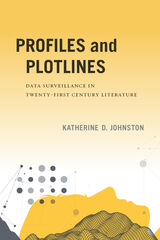 Profiles and Plotlines: Data Surveillance in Twenty-first Century Literature
Katherine D. Johnston
University of Iowa Press, 2023 Algorithmic data profiling is not merely an important topic in contemporary fiction, it is an increasingly dominant form of storytelling and characterization in our society. These stories are being told inside boardrooms, banks, presidential briefings, police stations, advertising agencies, and technology companies. And so, to the extent that data has taken up storytelling, literature must take up data. After all, profiling coincides with character development; surveillance reflects point of view; and data points track as plot points in tales of the political economy.
In Profiles and Plotlines, Katherine Johnston engages this energetic reformation of contemporary literature to account for a society and economy of frenetic counting. Fiction and poetry are capable of addressing precisely that for which algorithms cannot or do not account: the effects of profile culture; the ideologies and supposed truth-power of data; the gendered and racialized dynamics of watching and being watched; and the politics of who counts and what gets counted. Johnston analyzes prescient work by contemporary authors such as Jennifer Egan, Claudia Rankine, Mohsin Hamid, and William Gibson to probe how the claims of data surveillance serve to make lives seem legible, intelligible, and sometimes even expendable.
 Profiles in Cognitive Aging
Douglas Powell
Harvard University Press, 1994 After the age of 40, we may notice occasional lapses—a forgotten phone number, a friend's name, or a word that was right on the tip of our tongue. By 60, we may find ourselves wondering who called this morning, why we came into the kitchen, where we parked the car. In an aging nation, where one citizen in seven will be 65 when the next century arrives, these little difficulties raise a larger question: What precisely happens to our thinking as we grow older? What is normal, what is not, and how are we to know the signs?
Douglas Powell offers a comprehensive account of cognitive aging, of how our mental functions change as we mature. Defining patterns of normal decline, as well as severe forms of cognitive impairment, this book will help us understand and address the needs of an aging population. Powell integrates the latest literature on aging with the findings of his recent study of 1,000 physicians and 600 other subjects ranging in age from 25 to 92. His work reveals patterns of cognitive aging throughout the life cycle, particularly the way in which variability among individuals outpaces the decline of overall ability. Tackling an issue of growing interest in the field of gerontology, he notes the effect of certain factors such as gender, diet, health, and physical and mental exercise on changes in cognitive functioning over time.
Along with the criteria for mild cognitive impairment and normal cognitive aging, this book addresses the question of optimal cognitive aging, identifying its characteristics and searching out their implications for the maintenance of intellectual abilities in the post-retirement years.
Profiles in Cultural Evolution: Papers from a Conference in Honor of Elman R. Service
Edited by A. Terry Rambo and Kathleen Gillogly
University of Michigan Press, 1991 Presenting diverse viewpoints and topics, this collection includes the following sections:Part I presents a background on the study of cultural evolution. Part II deals with the evolution of complex societies in the tropics of South America. Part III discusses stage sequences and directionality in cultural evolution. Part IV examines the role of prime movers in cultural evolution. Part V discusses diversity and change.
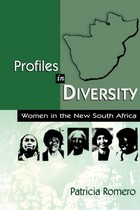 Profiles in Diversity: Women in the New South Africa
Patricia Romero
Michigan State University Press, 1998 A revealing oral history collection, Profiles in Diversity contains in-depth interviews of twenty-six women in South Africa from different racial, class, and age backgrounds. Conducted in Johannesburg, Pretoria, Bloemfontein, Vryburg, Cape Town, Port Elizabeth, Grahamstown, Durban, and a rural section of Kwa-Zulu Natal, these life histories encompass diverse experiences ranging from a squatter in a township outside Cape Town to an ANC activist in Port Elizabeth, who lost three sons to the struggle for democracy and who herself was imprisoned several times during what many in South Africa now refer to as the "civil war."
Nearly all of these women describe their formative years spent growing up in South Africa's segregated society. Three young black students discuss the hardships they experienced in an unequal educational system as well as aspects of segregation in their childhood. They are joined in their memories and hopes for the future by two mature women—one now a high court judge in Durban and the other a linguist at the University of South Africa in Pretoria—both of whom studied at Harvard in the United States. Nancy Charton, the first woman ordained as an Anglican priest in South Africa, speaks about her past and what led her, in her early seventies, to a vocation in the church.
Three Afrikaner women, including one in her late twenties, speak about growing up in South Africa and articulate their concerns for a future that, in some respects, differs from the predictions of their English-speaking or black sisters. Two now-deceased members of the South African Communist Party provide disparate accounts of what led them to lives of active opposition to the discrimination that marked the lives of people of color, long before apartheid became embedded in South Africa's legal system. Also included is an account by Dr. Goonam, an Indian woman who grew up in relative comfort in the then province of Natal, while Ray Alexander discusses how she witnessed the tyranny visited on the Jews of her native Latvia before immigrating to the Cape.
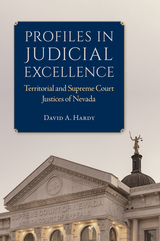 Profiles in Judicial Excellence: Territorial and Supreme Court Justices of Nevada
David A. Hardy
University of Nevada Press, 2025 The Nevada judiciary began with territorial judges appointed by President Abraham Lincoln and transitioned to elected judges after statehood in 1864. The courts officiated by these judges have influenced the evolution of Nevada from a territory created in the chaos of mining litigation; through the expansion of divorce, gaming, and tourism jurisprudence; to what is now a vibrant venue for commercial development and corporate law. Along the way, the state’s judges weighed in on issues of civil liberties, water rights, personal injury, and a variety of other legal subjects affecting all Nevada citizens. The collective work of these courts has solidified the rule of law and allowed Nevadans to live peacefully.
Until the publication of Judge David A. Hardy’s Profiles in Judicial Excellence: Territorial and Supreme Court Justices of Nevada, there has been no single source containing biographies of these influential figures from the state’s history from 1861 to 1997. Hardy curates various sources and presents profiles of these judges in sequential order of their service. He also examines the influence of territorial judges in the 1864 vote for statehood. The Nevada judiciary has played an integral, but often unrecognized, role in shaping the unique character of the Silver State.
Profiles in Power: Twentieth-Century Texans in Washington, New Edition
Edited by Kenneth E. Hendrickson, Jr., Michael L. Collins, and Patrick Cox
University of Texas Press, 2004 Profiles in Power offers concise biographies of fourteen twentieth-century Texans who wielded significant political power and influence in Washington, D.C. First published in 1993 by Harlan Davidson, it has been revised and updated with new chapters on John Nance Garner and Henry Gonzalez and expanded chapters on Lyndon Johnson, Barbara Jordan, Ralph Yarborough, Jim Wright, and John Tower. Demonstrating the validity of a biographical approach to history, the book as a whole covers all the major political issues of the twentieth century, as well as the pivotal role of Texans in defining the national agenda.
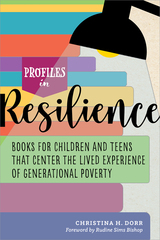 Profiles in Resilience: Books for Children and Teens That Center the Lived Experience of Generational Poverty
Christina H. Dorr
American Library Association, 2021 “This book helps to expand the definition of diversity in children’s books by shedding light on an element of diversity that is sometimes overlooked—economic situation or income . . . Teachers and librarians will find it informative and engaging as it deepens their experience with both authors and books as well as their understanding of children who are experiencing generational poverty.” —from the Foreword by Dr. Rudine Sims Bishop, Professor Emeritus, The Ohio State University Drawing from her own lived experience, in this guide Dorr shines a light on some of the cultural values that exist across both rural and urban poverty, inviting teachers, librarians, and others who work with children from low-income families to see them in their cultural context and appreciate the values they bring to the classroom or library. She spotlights a range of books for children and teens that offer literary mirrors to low-income children, as well as windows to more economically privileged readers, enabling all young readers to celebrate our common humanity. And she also shares the work of ten authors and illustrators familiar with poverty, offering insights into the sources of their stories and the ways storytellers’ lived experience can influence their creative works and make their characters more authentic. You will discover - an introduction which explores what it’s like to grow up in generational poverty, including its long-term effects on children, the roles played by intersectional and institutional racism, the power of family, and how reading can act as powerful catalyst;
- biographical sketches of Elizabeth Acevedo, Jason Reynolds, Cynthia Rylant, Kelly Yang, and other authors and illustrators;
- inspiring profiles and books spanning age ranges, genres, and formats that chronicle the lives of Ruth Bader Ginsberg, Kareem Abdul-Jabbar, Sonia Sotomayor, John Lewis, Wilma Mankiller, and other people who were raised in generational poverty; and
- four appendixes which spotlight even more stories of resilient individuals and fictional characters.
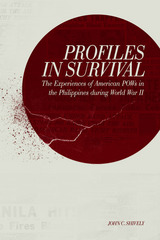 Profiles in Survival: The Experiences of American POWs in the Philippines during World War II
John C. Shively
Indiana Historical Society Press, 2012 The stories of seven men and one woman from Indiana who survived the horrors of captivity under the Japanese in the Pacific during World War II are captured in vivid detail. These Hoosiers were ordered to surrender following the fall of Bataan and Corregidor in 1942. It was the largest surrender of American armed forces in U.S. history and the beginning of three years of hell starting with the infamous Bataan Death March, facing brutal conditions in POW camps in the Philippines, and horrific journeys to Japan for some onboard what came to be known as “hellships.” Former Indiana governor Edgar D. Whitcomb, one of those featured in the book, notes that the American prisoners had to endure “unimaginable misery and brutality at the hands of sadistic Japanese guards,” as they were routinely beaten and many were executed for the most minor offenses, or for mere sport. In addition to Whitcomb, those profiled include Irvin Alexander, Harry Brown, William Clark, James Duckworth, Eleanor Garen, Melvin McCoy, and Hugh Sims.
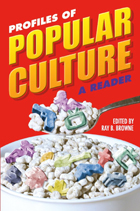 Profiles of Popular Culture: A Reader
Edited by Ray B. Browne
University of Wisconsin Press, 2005 From Hank Williams to hip hop, Aunt Jemima to the Energizer Bunny, scrap-booking to NASCAR racing, Profiles of Popular Culture cuts a generous swath across what is perhaps the fastest growing discipline of the past several decades. Edited by a pioneer in the field, this volume invites readers to reflect on a diverse sampling of modern myths, icons, archetypes, rituals, and pastimes. Adopting an inclusive approach, editor Ray B. Browne has mined both scholarly and mainstream media to bring together penetrating essays on fads and fashions, sports fandom, the shaping of body image, aesthetic surgery, the marketing of food, vacationing and sightseeing, toys and games, genre fiction, post-9/11 entertainment, and much more. Like Jack Nachbar and Kevin Lause's Popular Culture: An Introductory Text, this book opens critical doors into the study of popular culture-and does so within a fresh context that includes points of reference both established and new.
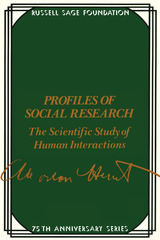 Profiles of Social Research: The Scientific Study of Human Interaction
Morton M. Hunt
Russell Sage Foundation, 1985 This splendid introduction to social research describes an area of scientific investigation that profoundly influences our daily lives and thoughts, but about which most of us know very little. We can picture a research chemist at work, white-coated and surrounded by beakers and test tubes—but what is the nature of social research? For interested general readers and particularly for students entering the various social science fields, Morton Hunt paints an immensely informative and accessible portrait. He begins with a lucid overview of the important varieties of social research, describing their advantages and limitations. Against this background, Hunt then details five remarkable case histories, eyewitness accounts of significant recent episodes in social research. Woven skillfully through each narrative are explorations of the basic methodological, practical, moral and political issues raised by social research. The story of a noteworthy series of sociopsychological experiments on teamwork, for example, enables Hunt to weigh the merits of using a laboratory setting to study social behavior and the ethics of deceiving human subjects. In similar fashion, Hunt depicts a historic cross-sectional survey on segregated schooling; a complex attempt to measure the impact of welfare programs; a real-world experiment with guaranteed annual incomes; and a path-breaking study of human aging that followed its subjects for a generation. This engaging and intelligent book will give readers a new understanding of the breadth and richness of social research as well as an informed appreciation of its significance for their lives.
 Profiles, Probabilities, and Stereotypes
Frederick Schauer
Harvard University Press, 2006 This book employs a careful, rigorous, yet lively approach to the timely question of whether we can justly generalize about members of a group on the basis of statistical tendencies of that group. For instance, should a military academy exclude women because, on average, women are more sensitive to hazing than men? Should airlines force all pilots to retire at age sixty, even though most pilots at that age have excellent vision? Can all pit bulls be banned because of the aggressive characteristics of the breed? And, most controversially, should government and law enforcement use racial and ethnic profiling as a tool to fight crime and terrorism?
Frederick Schauer strives to analyze and resolve these prickly questions. When the law “thinks like an actuary”—makes decisions about groups based on averages—the public benefit can be enormous. On the other hand, profiling and stereotyping may lead to injustice. And many stereotypes are self-fulfilling, while others are simply spurious. How, then, can we decide which stereotypes are accurate, which are distortions, which can be applied fairly, and which will result in unfair stigmatization?
These decisions must rely not only on statistical and empirical accuracy, but also on morality. Even statistically sound generalizations may sometimes have to yield to the demands of justice. But broad judgments are not always or even usually immoral, and we should not always dismiss them because of an instinctive aversion to stereotypes. As Schauer argues, there is good profiling and bad profiling. If we can effectively determine which is which, we stand to gain, not lose, a measure of justice.
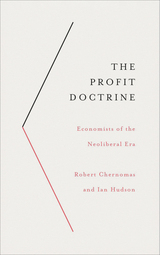 The Profit Doctrine: Economists of the Neoliberal Era
Robert Chernomas and Ian Hudson
Pluto Press, 2016 The profession of economics has a lot to answer for. Since the late 1970s, the ideas of influential economists have justified policies that have made the world more prone to economic crisis, remarkably less equal, more polluted, and less secure than it might be. How did ideas and policies that have proved to be such an abject failure come to dominate the economic landscape?
By critically examining the work of the most famous economists of the neoliberal period including Alan Greenspan, Milton Friedman, and Robert Lucas, Robert Chernomas and Ian Hudson demonstrate that many of those who rose to prominence did so primarily because of their defense of, and contribution to, rising corporate profits, rather thantheir ability to predict or explain economic events.
An important and controversial book, The Profit Doctrine exposes the uses and abuses of mainstream economic canons, identifies those responsible, and reaffirms the primacy of political economy.
The Profit Motive and Patient Care: The Changing Accountability of Doctors and Hospitals
Bradford Gray
Harvard University Press, 1991 In this penetrating analysis, Bradford Gray tackles the thorny issues surrounding the question of to whom and for what our physicians and hospitals are accountable. This book provides a careful evaluation of the mechanisms of accountability that have developed along with a growing profit orientation of health care, and it alerts us to keep a sharp eye focused on who is looking out for the interests of the patient.
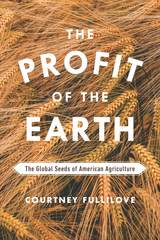 The Profit of the Earth: The Global Seeds of American Agriculture
Courtney Fullilove
University of Chicago Press, 2017 While there is enormous public interest in biodiversity, food sourcing, and sustainable agriculture, romantic attachments to heirloom seeds and family farms have provoked misleading fantasies of an unrecoverable agrarian past. The reality, as Courtney Fullilove shows, is that seeds are inherently political objects transformed by the ways they are gathered, preserved, distributed, regenerated, and improved. In The Profit of the Earth, Fullilove unearths the history of American agricultural development and of seeds as tools and talismans put in its service.
Organized into three thematic parts, The Profit of the Earth is a narrative history of the collection, circulation, and preservation of seeds. Fullilove begins with the political economy of agricultural improvement, recovering the efforts of the US Patent Office and the nascent US Department of Agriculture to import seeds and cuttings for free distribution to American farmers. She then turns to immigrant agricultural knowledge, exploring how public and private institutions attempting to boost midwestern wheat yields drew on the resources of willing and unwilling settlers. Last, she explores the impact of these cereal monocultures on biocultural diversity, chronicling a fin-de-siècle Ohio pharmacist’s attempt to source Purple Coneflower from the diminishing prairie. Through these captivating narratives of improvisation, appropriation, and loss, Fullilove explores contradictions between ideologies of property rights and common use that persist in national and international development—ultimately challenging readers to rethink fantasies of global agriculture’s past and future.
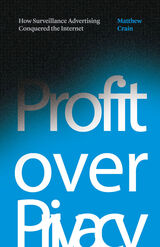 Profit over Privacy: How Surveillance Advertising Conquered the Internet
Matthew Crain
University of Minnesota Press, 2021 A deep dive into the political roots of advertising on the internet
The contemporary internet’s de facto business model is one of surveillance. Browser cookies follow us around the web, Amazon targets us with eerily prescient ads, Facebook and Google read our messages and analyze our patterns, and apps record our every move. In Profit over Privacy, Matthew Crain gives internet surveillance a much-needed origin story by chronicling the development of its most important historical catalyst: web advertising. The first institutional and political history of internet advertising, Profit over Privacy uses the 1990s as its backdrop to show how the massive data-collection infrastructure that undergirds the internet today is the result of twenty-five years of technical and political economic engineering. Crain considers the social causes and consequences of the internet’s rapid embrace of consumer monitoring, detailing how advertisers and marketers adapted to the existential threat of the internet and marshaled venture capital to develop the now-ubiquitous business model called “surveillance advertising.” He draws on a range of primary resources from government, industry, and the press and highlights the political roots of internet advertising to underscore the necessity of political solutions to reign in unaccountable commercial surveillance. The dominant business model on the internet, surveillance advertising is the result of political choices—not the inevitable march of technology. Unlike many other countries, the United States has no internet privacy law. A fascinating prehistory of internet advertising giants like Google and Facebook, Profit over Privacy argues that the internet did not have to turn out this way and that it can be remade into something better.
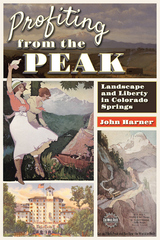 Profiting from the Peak: Landscape and Liberty in Colorado Springs
John Harner
University Press of Colorado, 2021 Colorado Springs, Colorado, has long profited from Pikes Peak and built an urban infrastructure to sustain that relationship. In Profiting from the Peak, geographer John Harner surveys the events and socioeconomic conditions that formed the city, analyzing the built landscape to offer insight into the origins of its urban forms and spatial layout, focusing particularly on historic downtown architecture and public spaces. He examines the cultural values that have come to define the city, showing how military and other institutions, tourism, political and economic conditions, cultural movements, key individual actors, and administrative policies have created a singular urban personality. Capital accumulation has been a defining theme of Colorado Springs from its very beginning, with enormous profits generated from regional industrialization, railroads, land sales, water appropriation, and extraction of coal and gold. These conditions and its setting in the Rocky Mountain West formed a libertarian-oriented, limited governance philosophy. This persistent prioritization of liberty at the heart of Colorado Springs’s identity, specifically the freedom to conduct business and generate profits in a relatively unconstrained setting, has directed the urban sprawl of the built landscape and molded the region’s political culture. Profiting from the Peak will be of interest to historical and urban geographers, historians of Colorado and the American West, and anyone seeking a deeper understanding of the cultural identity of Colorado Springs.
 Profits and Morality
Edited by Robin Cowan and Mario J. Rizzo
University of Chicago Press, 1995 Are profits morally justifiable? While neoclassical economists have traditionally endorsed the pursuit of profits, many moral philosophers have challenged profit making on a variety of ethical grounds. Through the lenses of economics, philosophy, and law, these six essays explore the morality of profits from libertarian, utilitarian, and consequentialist perspectives.
Presenting arguments for and against the morality of profit making, the contributors examine the nature of profits and which ethical theories can support them. Two essays address how profits are made: one explores entrepreneurship as a legitimate source of profit, while another argues that recent advances in welfare economics weaken the case for the morality of profits. The other chapters focus on ethical theory, covering the right to profits from economic rent; the morality of how profits are used—those directed toward library or university endowments, for example, are considered morally acceptable—and whether or not profits are deserved.
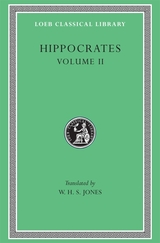 Prognostic. Regimen in Acute Diseases. The Sacred Disease. The Art. Breaths. Law. Decorum. Physician (Ch. 1). Dentition
Hippocrates
Harvard University Press Hippocrates, said to have been born in Cos in or before 460 BCE, learned medicine and philosophy; travelled widely as a medical doctor and teacher; was consulted by King Perdiccas of Macedon and Artaxerxes of Persia; and died perhaps at Larissa. Apparently he rejected superstition in favour of inductive reasoning and the study of real medicine as subject to natural laws, in general and in individual people as patients for treatment by medicines and surgery. Of the roughly 70 works in the 'Hippocratic Collection' many are not by Hippocrates; even the famous oath may not be his. But he was undeniably the 'Father of Medicine'.
The works available in the Loeb Classical Library edition of Hippocrates are the following. Volume I: Ancient Medicine. Airs, Waters, Places. Epidemics 1 and 3. The Oath. Precepts. Nutriment. Volume II: Prognostic. Regimen in Acute Diseases. The Sacred Disease. The Art. Breaths. Law. Decorum. Physician (Ch. 1). Dentition. Volume III: On Wounds in the Head. In the Surgery. On Fractures. On Joints. Mochlicon. Volume IV: Nature of Man. Regimen in Health. Humours. Aphorisms. Regimen 13. Dreams. Volume V: Affections. Diseases 12. Volume VI: Diseases 3. Internal Affections. Regimen in Acute Diseases. Volume VII: Epidemics 2 and 47. Volume VIII: Places in Man. Glands. Fleshes. Prorrhetic III. Physician. Use of Liquids. Ulcers. Haemorrhoids and Fistulas. Volume IV also contains the fragments of Heracleitus, On the Universe.
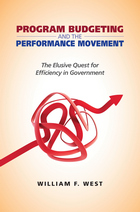 Program Budgeting and the Performance Movement: The Elusive Quest for Efficiency in Government
William F. West
Georgetown University Press, 2011 Formal systems of comprehensive planning and performance-based management have a long if disappointing history in American government. This is illustrated most dramatically by the failure of program budgeting (PPB) in the 1960s and resurrection of that management technique in a handful of agencies over the past decade. Beyond its present application, the significance of PPB lies in its relationship to the goals and assumptions of popular reforms associated with the performance movement. Program Budgeting and the Performance Movement examines PPB from its inception in the Department of Defense under Robert McNamara to its limited resurgence in recent years. It includes an in-depth case study of the adoption and effects of PPB at the National Oceanic and Atmospheric Administration. The fact that program budgeting is subject to the same limitations today that led to its demise four decades ago speaks to the viability of requirements, such as those imposed by the Government Performance and Results Act, that are designed to make government more businesslike in its operations.
 Program Budgeting: Program Analysis and the Federal Budget, Second Edition
David Novick
Harvard University Press As the federal government’s programs have increased in complexity, with regard both to world and national affairs and to state and local interests, the problems of decision making have become vastly more intricate. This book is designed to help improve understanding of the principles of program budgeting in relation to the decisionmaking process in the federal government; to stimulate others to develop these ideas further; and to accelerate the application of program budgeting in governmental activities.
Divided into three sections, the book begins with a discussion of the government decisionmaking process, the role of budgeting, and efforts made in past years by the federal government to improve the planning–programming–budgeting process. The second section covers the introduction of program budgeting in the Department of Defense and possible application to other federal activities. The third section deals with the subject of implementation and operation of the program budget and discusses an operating federal program budget in terms of its usefulness to specific areas.
 The Program Era: Postwar Fiction and the Rise of Creative Writing
Mark McGurl
Harvard University Press, 2011 In The Program Era, Mark McGurl offers a fundamental reinterpretation of postwar American fiction, asserting that it can be properly understood only in relation to the rise of mass higher education and the creative writing program. McGurl asks both how the patronage of the university has reorganized American literature and—even more important—how the increasing intimacy of writing and schooling can be brought to bear on a reading of this literature.
McGurl argues that far from occasioning a decline in the quality or interest of American writing, the rise of the creative writing program has instead generated a complex and evolving constellation of aesthetic problems that have been explored with energy and at times brilliance by authors ranging from Flannery O’Connor to Vladimir Nabokov, Philip Roth, Raymond Carver, Joyce Carol Oates, and Toni Morrison.
Through transformative readings of these and many other writers, The Program Era becomes a meditation on systematic creativity—an idea that until recently would have seemed a contradiction in terms, but which in our time has become central to cultural production both within and beyond the university.
An engaging and stylishly written examination of an era we thought we knew, The Program Era will be at the center of debates about postwar literature and culture for years to come.
 A Program for Land Use in Northern Minnesota: A Type Study in Land Utilization
Oscar Jesness
University of Minnesota Press, 1935
A Program for Land Use in Northern Minnesota was first published in 1935. Minnesota Archive Editions uses digital technology to make long-unavailable books once again accessible, and are published unaltered from the original University of Minnesota Press editions.With half of its privately owned lands tax delinquent, millions of acres returning to public ownership, a per capita debt twice as large as that for the rest of the state, and large areas in no economic use whatsoever, northeastern Minnesota, like many other cut-over regions of the country, faces a serious situation.These fourteen counties, as the authors show, are suffering from the unwise land policies of the past – policies not peculiar to Minnesota. Is there a solution to the problem, or must Minnesota and other states continue to pay the price for their past mistakes?The authors of this volume believe there is a remedy. From a first-hand investigation and careful analysis of conditions in this area, they have arrived at definite conclusions and a specific program. They describe concretely how desirable shifts in land use and changes in government can be accomplished: what legislation should be enacted; how the cooperation of local officers, the settlers, and the general public can be won, and how in the process of readjustment the farmer can be saved from undue hardship and embarrassment.A volume for the legislator, the public official, the landowner, the agricultural economist, and every taxpayer in the state.
Programming Industrial Control Systems Using IEC 1131-3
R.W. Lewis
The Institution of Engineering and Technology, 1998 IEC 1131-3 is the international standard for the design of software for industrial control systems. It defines a set of related graphical and textual languages that bring significant benefits throughout the control system life-cycle - benefits for system integrators, control system engineers and end-users alike. The standard marks the beginning for wellstructured, re-usable and maintainable software for industrial control systems.
 Progress and Pessimism: Religion, Politics, and History in Late Nineteenth Century Britain
Jeffrey Paul von Arx
Harvard University Press, 1985 Faith in progress is a characteristic we often associate with the Victorian era. Victorian intellectuals and free-thinkers who believed in progress and wrote history from a progressive point of view—men such as Leslie Stephen, John Morley, W. E. H. Lecky, and James Anthony Froude—are usually thought to have done so because they were optimistic about their own times. Their optimism has been seen as the result of a successful Liberal campaign for political reform in the sixties and seventies, carried out in alliance with religious dissenters—a campaign that removed religion from the arena of public debate.
Jeffrey Paul von Arx challenges this long-standing view of the Victorian intellectual aristocracy. He sees them as preoccupied with and even fearful of a religious resurgence throughout their careers, and demonstrates that their loss of confidence in contemporary liberalism began with their disillusionment over the effects of the Franchise Reform Act of 1867. He portrays their championing of the idea of progress as motivated not by optimism about the present, but by their desire to explain away and reverse if possible contemporary religious and political trends, such as the new mass politics in England and Ireland.
This is the first book to explore how pessimism could be the psychological basis for the Victorians’ progressive conception of history. Throughout, von Arx skillfully interweaves threads of religion, politics, and history, showing how ideas in one sphere cannot be understood without reference to the others.
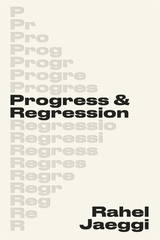 Progress and Regression
Rahel Jaeggi
Harvard University Press, 2025 Despite widespread technological innovation, scientific and medical breakthroughs, and strides toward gender and racial equity, few believe that humanity is on the road of progress. Indeed, many are increasingly skeptical of the very notion of progress, seeing it as the stuff of hollow political speeches.
Nevertheless, this impassioned book argues that we are lost without a shared idea of progress. In the tradition of critical theory, Rahel Jaeggi defends a vision of progress that avoids Eurocentric and teleological distortions. Progress here is not an inevitable developmental trend but a kind of compass directing society’s never-ending journey toward emancipation. A nimble practitioner of dialectical reasoning, Jaeggi revitalizes progress by confronting its opposite: regression. Her analysis—sober and thoughtful, but urgent—reckons with the myriad signs of regression today, including growing inequality, ecological destruction, and above all the assault on educational institutions, critical thinking, and reason itself.
The task of imagining a human solidarity capable of transcending difference and promoting universal welfare has seldom been more pressing—or more complex. Progress and Regression is an indispensable resource for those ready to take up the challenge.
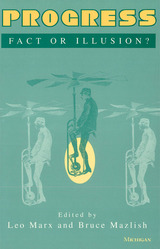 Progress: Fact or Illusion?
Leo Marx and Bruce Mazlish, Editors
University of Michigan Press, 1996 Progress, perhaps the fundamental secular belief of modern Western society, has come under heavy fire recently because, after three centuries, advances in science and technology seem increasingly to bring problems in their wake: alienation, environmental degradation, the threat of nuclear destruction. The idea of progress is brought into question by postmodern critique, attacking the notion of science as truth. Yet no other meaningful organization of humankind's sense of time looms on the horizon. This volume seeks to reassess the meaning and prospects of the idea of progress. Looking toward the millennium, the volume seeks to evaluate the idea's worth both in theory--is it intellectually viable and defensible today?--and practice--even if theoretically defensible, is the idea undermined in actual life? Approaching these questions from the perspectives of science, anthropology, economics, religion, political philosophy, feminism, medicine, environmental studies, and the Third World, the contributors, all distinguished scholars, provide a unique and critical balance. Ultimately, the contributors find that progress is both a fact and an illusion: it does occur in certain areas, but it does not sweep all before it as its Enlightenment votaries thought it would. This foundational idea permeates discourse in the natural and social sciences as well as the humanities and will engage historians, students of the history of science and technology, sociologists, political scientists, philosophers, literary scholars, and art critics, as well as those interested in civilization in general. Contributors include: Jill Ker Conway, Zhiyuan Cui, Leon Eisenberg, Robert Heilbroner, Gerald Holton, Leo Marx, Bruce Mazlish, Ali A. Mazrui, Alan Ryan, John M. Staudenmaier, George W. Stocking, Jr., and Richard White. "A discerning reconsideration of the idea of 'progress' in a variety of carefully defined theoretical and empirical-historical contexts." --David Hollinger, University of California, Berkeley Leo Marx is Professor of American Cultural History, Emeritus, Massachusetts Institute of Technology. Bruce Mazlish is Professor of History, Massachusetts Institute of Technology.
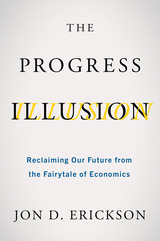 The Progress Illusion: Reclaiming Our Future from the Fairytale of Economics
Jon D. Erickson
Island Press, 2022 We live under the illusion of progress: as long as GDP is going up and prices stay low, we accept poverty and pollution as unfortunate but inevitable byproducts of a successful economy. In fact, the infallibility of the free market and the necessity of endless growth are so ingrained in the public consciousness that they seem like scientific fact. Jon Erickson asks, why? With the planet in peril and humanity in crisis, how did we get duped into believing the fairytale of economics? And how can we get past the illusion to design an economy that is socially just and ecologically balanced?
In The Progress Illusion, Erickson charts the rise of the economic worldview and its infiltration into our daily lives as a theory of everything. Drawing on his own experience as a young economist inoculated in the 1980s era of “greed is good,” Erickson shows how pseudoscience came to dominate economic thought. He pokes holes in the conventional wisdom of neo-classical economics, illustrating how flawed theories about financial decision-making and maximizing efficiency ignore human psychology and morality. Most importantly, he demonstrates how that thinking shaped our politics and determined the course of American public policy. The result has been a system that perpetually concentrates wealth in the hands of a few, while depleting the natural resources on which economies are based.
While the history of economics is dismal indeed, Erickson is part of a vigorous reform effort grounded in the realities of life on a finite planet. This new brand of economics is both gaining steam in academia and supporting social activism. The goal is people over profit, community over consumption, and resilience over recklessness. Erickson shows crafting a new economic story is the first step toward turning away from endless growth and towards enduring prosperity.
|
|
